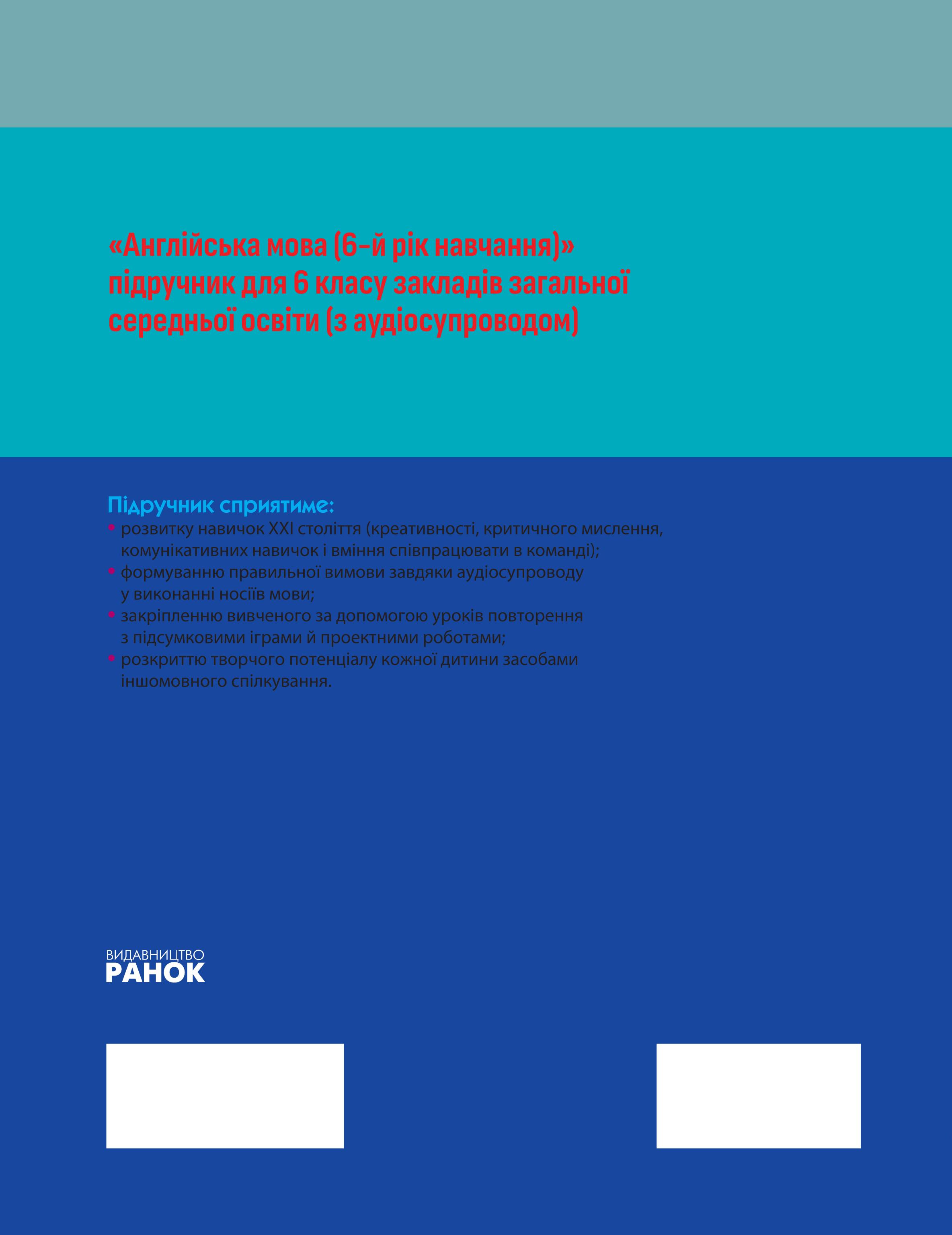Проєкт

Амелія Уолкер, Ненсі Левіс, Олександр Любченко


Амелія Уолкер, Ненсі Левіс, Олександр Любченко
«Англійська мова (6-й рік навчання)»
підручник для 6 класу закладів загальної середньої освіти (з аудіосупроводом)
«English»
Видавництво «Ранок»
Створено відповідно до модельної навчальної програми «Іноземна мова. 5-9 класи» для закладів загальної середньої освіти (автори: Зимомря І. М., Мойсюк В. А., Тріфан М. С., Унгурян І. К., Яковчук М. В.)
Амелія Уолкер • Ненсі Левіс
Олександр Любченко
Англійська мова (6-й рік навчання)
Підручник для 6 класу
закладів загальної середньої освіти (з аудіосупроводом)
ENGLISH (Year 6)
A TEXTBOOK FOR THE SIXTH FORM OF SECONDARY SCHOOLS (WITH AUDIO)

Рекомендовано Міністерством
Електронний
інтерактивний додаток
до підручника
rnk.com.ua/102706
ХАРКІВ






Видавництво «Ранок»

The Present Continuous (actions now and around now); The Present Continuous for arrangements; Possessive ’s and s’
Проєкт
Adjectives of personality
Greeting a friend; Introducing yourself and a friend; Making a request
Reading: meeting people at the airport Listening: a telephone conversation about plans; introducing yourself and a friend
Speaking: personality; greeting a friend; introducing a friend
describing personality
GRAMMAR VOCABULARYFUNCTIONS
will; gerund (-ing form)
Active leisure and healthy lifestyle
Making predictions; Talking about future facts; Talking about active leisure and healthy lifestyle
Reading: an adventure park advertisement; people talking about what they did in an adventure park Listening: a conversation about time spent at the cinema
Speaking: active leisure; a future event
be going to; will and be going to; Prepositions of time
Means of transport Talking about plans and intentions for the future
Reading: planning a tour Listening: a conversation about future plans
Speaking: transport; plans and intentions for the future Writing: describing weekend plans
The Past Simple: regular and irregular verbs; after; Zero article (things in general); Prepositions of movement
Wild animals Talking about past events; Describing the order of past events
Reading: an email about a trip Listening: a conversation about a rare bird
Speaking: wild animals; past events
The sound /iː/
5 A DAY AT THE BEACH 48–55 GRAMMAR VOCABULARYFUNCTIONS SKILLS
Wild plants; Protecting the environment
Telling a story; Describing two actions happening at the same time
Reading: people describing what they were doing
Listening: a conversation about wild plants on the beach
Speaking: giving ‘green’ ideas
Writing: describing past activities
Contents 3
4
The Past Simple and the Past Continuous; So and such
The city and the country
Describing past events; Making an excuse
Reading: people describing what they were doing
Listening: visiting grandparents
Speaking: the city and the country; describing past events; making an excuse
Writing: describing city and country life
quite/very; (not) as … as; Reflexive pronouns
Festivals and celebrations
Unit 9
Hobbies and interests
Comparing people and things; Talking about festivals and celebrations; Birthday greetings; Agreeing
Reading: a webpage about a folk festival; a blog
Listening: a conversation at a folk festival
Speaking: festivals and celebrations; birthday greetings
The sound
/ɒ/
Talking about abilities and possibilities; Inviting a friend; Congratulating people; Making arrangements; Making an excuse
Reading: an invitation to a theatrical performance; an email with instructions how to get to a place
The sound /əʊ/
Listening: inviting friends to a theatrical performance; congratulating people
Speaking: hobbies and interests; making arrangements; making excuses
Writing: my hobby
Restaurant food Ordering food and drinks; Making polite requests and offers
Reading: a menu; ordering food at a restaurant
Listening: people talking about going to a restaurant
майбутньогопідручника
Speaking: ordering food and drinks at a restaurant and a coffee bar
Writing: my family’s eating habits
GRAMMAR VOCABULARYFUNCTIONS SKILLS PRONUNCIATION would (like); Indefinite pronouns; Countable and uncountable nouns; Concrete and abstract nouns; a bit/a number of
Cardinal and ordinal numbers; and, or, but, so
Continents; Countries and nationalities
Agreeing and disagreeing; Asking and answering about countries
Reading: a map of a culture fair; places of interests around the world
Listening: people at a culture fair
Speaking: countries and nationalities; agreeing and disagreeing
Writing: filling in a registration form
make and do; Type 0 conditional
Jobs Describing jobs; Talking about pocket money
Reading: an article about pocket money
Listening: teenagers looking for a job
Speaking: jobs; talking about pocket money; a class survey on pocket money
Writing: describing a job
can, could and may (permission); Adverbs of manner
Good manners
Asking for permission; Making a request; Expressing gratitude
Reading: people checking in at the airport; airport announcements; tips for good manners
Listening: a conversation about a birthday surprise
Speaking: good manners; asking for permission
Writing: making a request; expressing gratitude
I/you/we/they he/she/it
+I usually get up early.
–I don’t usually get up early.
? Do you usually get up early?
Yes, I do. / No, I don’t.
? When do you usually get up?
+She goes to school by bus.
–She doesn’t go to school by bus.
? Does she go to school by bus?
Model:
Yes, she does. / No, she doesn’t .
? How does she go to school?
In your notebook, write sentences in the Present Simple. Use short forms where possible.
+Dad / never drive fast Dad never drives fast.
1. + My friend / listen to hip hop music
2. – I / speak Russian
In your notebook, write true sentences.
3. – They / stay up late
4. ? you / like playing computer games
5. + we / usually have dinner at 7 o’clock
6. ? your brother / speak any foreign languages
I My friend and I My parents don’t always usually often sometimes never
My brother My sister doesn’t
•wake up
•go to school
•watch TV
•phone a friend
•go to bed
•finish classes
•have breakfast
•text a friend
•go home
•have lunch
•do homework
•have dinner
•get up
• browse the Internet
•have a shower
play/plays computer games. read/reads books. go/goes for walks. sleep/sleeps late. work/works hard. study/studies a lot. do/does any sports.
In your notebook, copy the two charts about your daily routine on a weekday and at the weekend. Complete them with the activities in the box. Add any other activities you usually do.
Monday 7:30get up Saturday around 9:00get up
Now work in pairs. Talk about your weekdays and weekends.
Model:
On Mondays, I get up at 7:30. Then I … On Saturdays, I usually get up around 9 o’clock. Then I …
Do you remember?
Проєкт
I you/we/they he/she/it
? Are you studying? Yes, I am. / No, I’m not ? Is he studying? Yes, he is. / No, he isn’t.
? Are they studying? Yes, they are. / No, they aren’t. ? What are you studying?
In your notebook, write sentences in the Present Continuous. Use short forms where possible.

–I / text my friend
Model:
I’m not texting my friend.
1. – It / snow
2. + He / eat a sandwich
3. + I / learn English

4. ? what / you do at the moment

5. – she / wear a beautiful dress
6. – my sister / sleep now
7. ? they / laugh at us
In your notebook, complete the sentences with the correct form of the verbs in bold: the Present Simple or the Present Continuous. Use short forms where possible.
Model:
1 2 3
be, bake
1.want, not eat
2.go, rain
3.not take
4.make
5.like

6.wait
7.not understand
My granny is a very good cook. She’s baking a cake.
I … to be healthy. I … any junk food.
A: Where … you …? B: To the beach. A: But it’s …!
I … sugar in my tea.
Mum usually … pizza on Sundays.
Pam … listening to music on the bus.
A: Hey, where are you? B: I … for you in front of the café. Miss, I … . Could you explain it again, please?
In pairs, describe the pictures.
•Where are the people?
•What are they doing?
I You He She It We They
+ arrived early. + went by car.
–didn’t arrive early. –didn’t go by car.
? Did you arrive early?Yes, I did. / No, I didn’t.
? Did you go by car? Yes, I did. / No, I didn’t.
? How did you travel?
Listen and repeat.
come – came eat – ate go – went
Say the sentences in the Past Simple.
Model:
I often walk to school. I walked to school yesterday.
1. I see my friends every day.
… yesterday.
2. My friend and I go to the cinema.
… last Friday.
3. I watch TV.
… last night.
4. I always eat pancakes on Sundays.

… last Sunday.
5. My dad gives me a lift to school.
… this morning.
6. We go on holiday in the mountains.
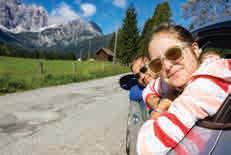
… last summer.
7. I do my homework in the afternoon.
… this afternoon.
say – said see – saw sell – sold
3
Model:
spend – spent take – took think – thought
In your notebook, write sentences in the Past Simple.
? Rossi / phone her cousin yesterday Did Rossi phone her cousin yesterday?
1. + My parents / take me to a restaurant last week
2. – I / watch a good film last night
3. ? you / make many mistakes in the test
4. – I / know Maria was sick
майбутньогопідручника
5. + Dad / come home early last night
6. ? where / you go on holiday last summer
7. – we / eat anything for breakfast yesterday
long – longer – the longest expensive – more expensive – the most expensive
Read the text about the Blue Whale. Say the correct comparative or superlative form of the adjectives in brackets.
good – better – the best bad – worse – the worst
Write the questions below in your notebook. Use comparatives or superlatives. Then interview a classmate. Report to the class.
1. What is (interesting) – History and Civilisations or Geography and Economics?



The Blue Whale is the (large) and (heavy) animal on earth – even (big) than the (big) dinosaurs that lived long, long ago. It can weigh up to 110 tonnes. Its heart is the size of a small car. Female Blue Whales are (big) than males but males are sometimes a bit (heavy). The Blue Whale has got the (big) mouth in the world but the (big) thing it can swallow is an apple because its throat is very narrow.
The Blue Whale is the (fast)-growing animal on earth. At birth, it’s the size of an elephant and it gains 90 kilograms a day in its first year.
The Blue Whale is also the (loud) animal in the world. You can hear its call more than 800 km away.

Copy the adjectives into your notebook. Write the comparative and the superlative forms.
hot pretty beautifulfar slow important thin bad useful attractive
2. Which is the (easy) school subject?
3. Which is the (difficult) school subject?
4. Who is the (good) dancer in the class?
5. What is (useful) – listening to a text or reading a text?
1. Who is the (popular) singer at the moment?

2. Which is the (funny) TV show?
3. What is (boring) – watching TV or playing video games?
4. What is the (good) thing to do on a rainy day?
5. What is the (bad) thing to do on a hot day?
1. Which is the (busy) city in Ukraine?
2. Which is the (high) mountain?
3. Which is (long) – the Dnipro River or the Dnister River?
4. Which is the (hot) month? And the (cold)?
5. Which is the (big) animal in Ukraine?
1. There are some strawberries on the table.
2. There is some coffee on the table.
3. There aren’t any bananas.
4. There isn’t any orange juice.

5. A: Is there any meat? B: No, there isn’t.
6.A: Are there any croissants? B: Yes, there are.

7.A: Can I have some more tea, please? B: Yes, sure.
Look at the photo below. Ask and answer in pairs. Use Are there/Is there any …? and short answers.

She doesn’t have to read many books for the exam.
He has to read a lot of books and he hasn’t got much time.
Practise the dialogues in pairs. Say some or any
1
A: Have you got … new classmates?

B: No, I haven’t but I’ve got … new teachers.
2
A: I’m very hungry. What’s for dinner today?
B: We’ve got … fish. There’s … green salad, too.
A: Yummy! Are there … chips?
B: No, there aren’t … potatoes left.
A: Oh, shall I go and buy …?

B: Yes, please.
3
A: Can I have … more cake, please?
B: Sure! You can also have … cream on top.
In your notebook, complete the sentences with much, many or a lot of.
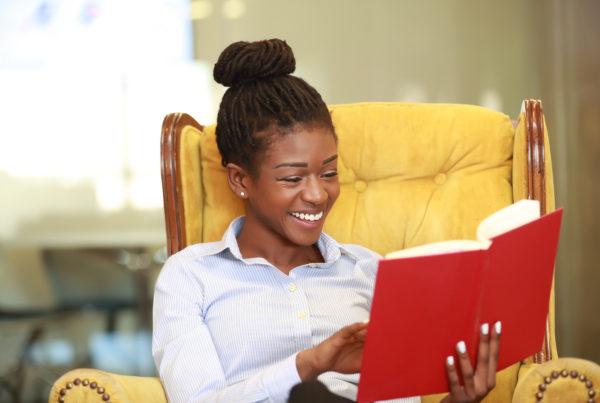
1.A: Have you got … homework for tomorrow?
B: Yes, I’ve got … of homework to do in the afternoon.
2. My brother doesn’t buy … computer games but he buys … computer magazines.
3.A: Do you spend … money on clothes?
B: No, I don’t. I spend ... money on my bike.
4. There aren’t … mountains in that part of the country.
5. Last winter, there were … cold days but there wasn’t … snow.
6. There aren’t … taxis at this time of day. That’s why there are … people at the bus stop.
Do you remember the characters?

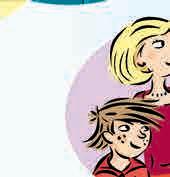







Victoria and Boris are Ukrainian. They live in Kyiv. They are twins. Their mum and dad are called Dora and Peter. Last summer Vicky and Boris went to summer school in London. They stayed with their aunt and uncle, Anna and John Wilson. Anna is their mum’s sister. The Wilsons have got two children, Alice and Justin. Vicky and Boris spent a month in London. They studied English, went sightseeing, made a lot of new friends and had a great time with their auntie, uncle and cousins, Alice and Justin. This summer the Wilsons are visiting the Biyvovks.
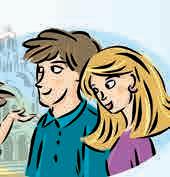
Grammar: the Present Continuous (actions now and around now); the Present Continuous for arrangements; possessive ’s and s’
Functions: greeting a friend; introducing yourself and a friend; making a request



Vocabulary: adjectives of personality
Pronunciation: the sound /æ/
Answer the questions.
Who are Vicky and Boris?
Where do they live?
Who are Alice and Justin?
Where do they live?
Look at the pictures. Try to guess the meaning of the words and phrases in bold.

promise (v.) absent-minded a hug
fall asleep staff pack (v.) a favour
B: Yes, I’m giving you my word.
Where are my glasses? I’m so absent-minded .
A: Promise me to come!
Give me a hug!
It’s locked!
А: Can I ask you a favour? Can you feed my cat this weekend?
Sorry. Staff means the people who work here.
B: Sure.
Listen and answer the questions.
1. What is Alice doing on Saturday?
2. What does Vicky ask Alice to bring?

Greet a friend
Hi, so nice to hear from you!/ It’s so good to see you.

How are you?
I’m fine./Not bad. What about you?
Make a request
Can I ask you a favour?
Listen again and choose the correct answer.
1. a. Gabi knows Alice and Justin.
b. Gabi doesn’t know Alice and Justin.
2. a. Vicky asks Alice a favour
b. Alice asks Vicky a favour
Listen to part of another conversation and answer the questions.
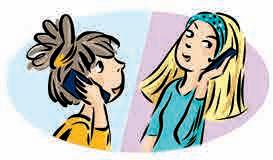
1. Who’s got a problem?
2. What is missing?
Can you do me a favour? VOCABULARY
In Britain and in the USA people sometimes use different words for the same thing.
folks (informal) = people
mobile = mobile phone (BrE) = cell phone (AmE)

Now read the whole conversation and the sentences below. Say true or false. Correct the false sentences.
Dora:
Vicky:
Anna: Peter: Justin: Alice: Justin:
John:
Peter: Alice:
John:
Dora: Peter:
Model:
Hello, Anna! Hello, John! Welcome to Ukraine. Alice, Justin, give me a hug! It’s so good to see you!
Hi, Alice. Hi, Justin!
We’re so happy to see you!
Welcome, everybody! How was the flight?
Boring. I watched a film on my mobile and fell asleep. O-Oh! My mobile’s missing! I think I left it on the plane. You, silly thing!
I’m not silly, I’m absent-minded.
Stop arguing you two! Let’s ask somebody about the phone. Justin, come with me.
Let’s wait for them over there. You can take a seat. (Half an hour later.)
Justin and dad are coming! Justin’s got his mobile. We were lucky! The airport staff were very helpful. All’s well that ends well. Shall we go now? Over here, folks. The taxis are waiting.
‘All’s well that ends well’ is a popular English saying.

The Wilsons are meeting the Biyvovks at the airport. False. The Biyvovks are meeting the Wilsons at the airport.
1. Justin watched a film on the plane.
2. Justin left his mobile phone at home.
3. Justin and his mum go to look for the mobile phone.
1.The Present Continuous
Study the examples. In your notebook, match them with the rules.
1. Look! Justin and dad are coming
2. Today I am packing my bags.
3. My cousins are coming on Saturday.
4. The airport staff couldn’t help Justin.
5. The two families get taxis.
We use the Present Continuous to talk about
a. an action which is happening at the moment of speaking.
b. an action which is happening over a short period of time.
c. personal arrangements and plans for the future.
In your notebook, put the verbs in bold in the Present Continuous.
Model:
The Biyvovks are very busy this week. What are they doing? read
1.plan
2.book
3.tidy up
4.look for
Dora is reading a guidebook to Ukraine.
Dora … a tour around Ukraine. Peter … hotel rooms on the Internet. Vicky and Boris … the flat. Memory … a quiet place to sleep.
In your notebook, answer the questions below. Give true answers.
1. What are you doing now?
2. What are you doing this week?
3. What are you doing next week?
Then ask and answer in pairs.
Vicky has got a pink bag. Vicky’s bag is pink. Note! Boris’ mobile is ringing. Boris’s friends are here. For names ending in -s , we add ’s or ’
Study the examples. In your notebook, match them with the rules.
1. Anna’s and Dora’s children are cousins.
2. This is my parents’ laptop.
3. Dora is Alice and Justin’s aunt.
4. The children’s bedroom is messy.
a.regular plural noun + ’

b.irregular plural + ’s
c. ’s after the last name when two or more people have got the same thing or things
d. ’s after each name when two or more people have got different things
9 11
In your notebook, write sentences about the pictures. Vicky’s and Boris’s shoes are on the floor. 10



What adjectives describing personality do you know? Work in small groups. Make a list.

Read the sentences and match them with the pictures. Try to guess the meaning of the words in bold.
a. Jack is lazy. He never helps his brother with the cleaning.
b. You, naughty boy! Stop it!
c. My sister is bossy. She likes giving people orders.
d. My little brother is very curious about everything.
e. Daniel, don’t be selfish. These toys are NOT only yours!

f. Mr Green is hard-working
g. Grandpa is very generous. He always brings me a gift when he visits us.
h. People will call you ‘as stubborn as a mule’ if you don’t listen to their opinions and you always think you’re right.
Why? What? How?
Listen, check and repeat.
Say the correct words from 11 to complete the sentences.
1. A … person tells other people what to do or gives orders in an unpleasant way.

2. A … person wants to know or learn something.

3. A … person doesn’t want to work or use energy.

4. A … child behaves badly and doesn’t listen to his/her parents.





5. A … person works a lot.
6. A … person does not care about other people.
7. A … person doesn’t want to change his/her ideas even if he/she isn’t right.
8. A … person likes giving gifts and sharing what he/she has.
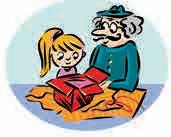
W
O
Introducing yourself and a friend
Read and listen to the conversation. Then practise in groups of four.

Vicky is introducing her friend Gabi to Alice and Justin.
Vicky: Gabi: Vicky:
Gabi: Vicky: Alice:
Gabi: Justin: Gabi: Alice: Justin: Vicky:
Hello, Gabi
Hi, Vicky. I’m sorry I’m late.
It’s OK. Boris is buying the tickets now.
Gabi, look who’s here!
I’m so excited!
Alice, Justin, this is my friend, Gabi.
Hi, Gabi, I’m Alice. Nice to meet you.
Nice to meet you, too, Alice.
Hey, Gabi. I’m Justin.
Hello, Justin. I’m so happy to meet you! Do you like it here, guys?
Oh, yes. It’s so green and pretty!
The food’s great U-hum. Boris is waiting for us in front of the cinema. Shall we go?
Now make a similar conversation. Use your own names. Replace the phrases in bold with your own ideas.
Introduce yourself
I’m (name).
Nice to meet you.
Nice to meet you, too, (name).
Introduce a friend
This is my friend, (name).
(Name), meet my friend/cousin, (name).
Work in groups of three. Choose a role card and make a conversation. Then change roles and make another conversation. You can use the conversation in as a model.



Your cousin (Student B) comes from another town/country.
Introduce Student B to your friend (Student C).
Describing personality





You are Student A’s cousin. You want to meet Student A’s friend (Student C).
You are Student A’s friend. Student A is introducing you to Student B.
Read Gabi’s description of her family and answer the question.
• How many people are there in Gabi’s family?
My family
My family isn’t very big. My mum’s name is Olena. She’s kind, patient and very curious about art. Mum is sometimes a bit bossy. My father’s name is Nazar. He’s clever and hard-working. Dad is always busy but he’s communicative and generous. I’ve got a little brother. Taras is five. He’s noisy and a bit naughty but he’s a good brother.

Write a similar description of the members of your family or of three friends or relatives. Follow the model above.



The sound æ
Listen and repeat.
cat bat flat hat
Now say these words. Then listen and check. bad dad mad sad
Grammar: will , gerund (-ing form)

Functions: making predictions; talking about future facts; talking about active leisure and healthy lifestyle
Vocabulary: active leisure and healthy lifestyle



Pronunciation: the sound /eɪ/

In pairs, answer the questions.
What do you do at weekends in summer? What do you do at weekends in winter?
Do your family like doing outdoor activities such as hiking, camping, etc.?
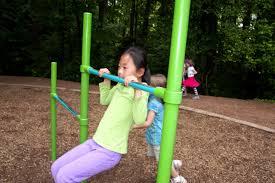
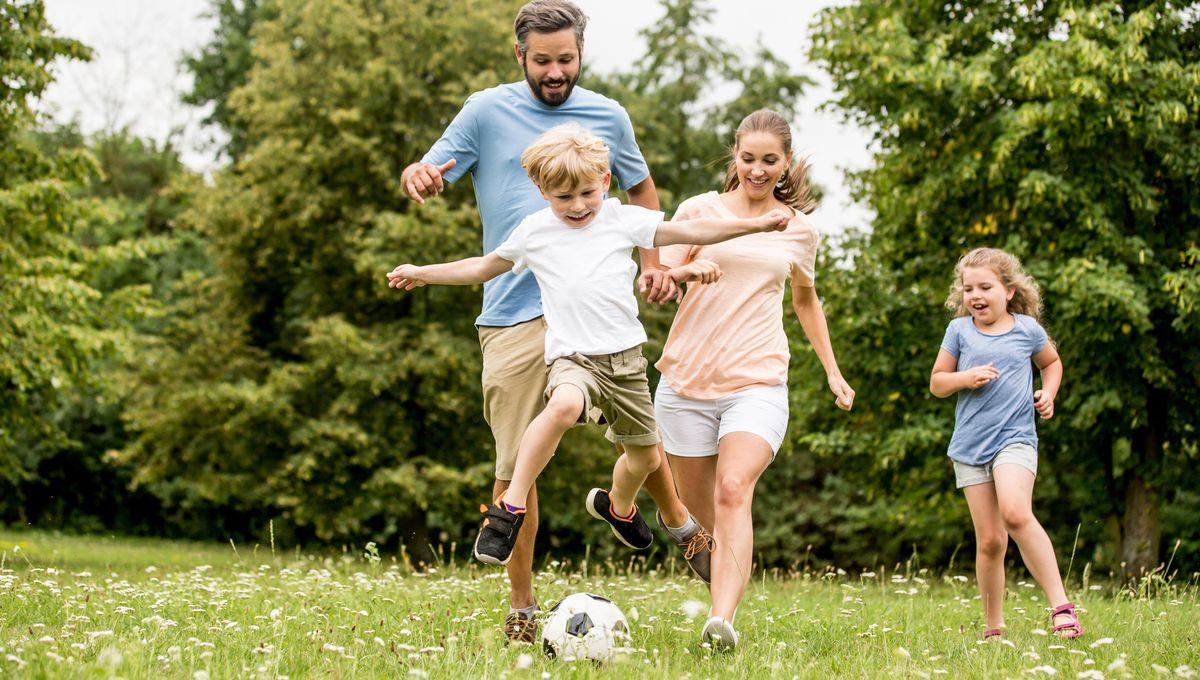
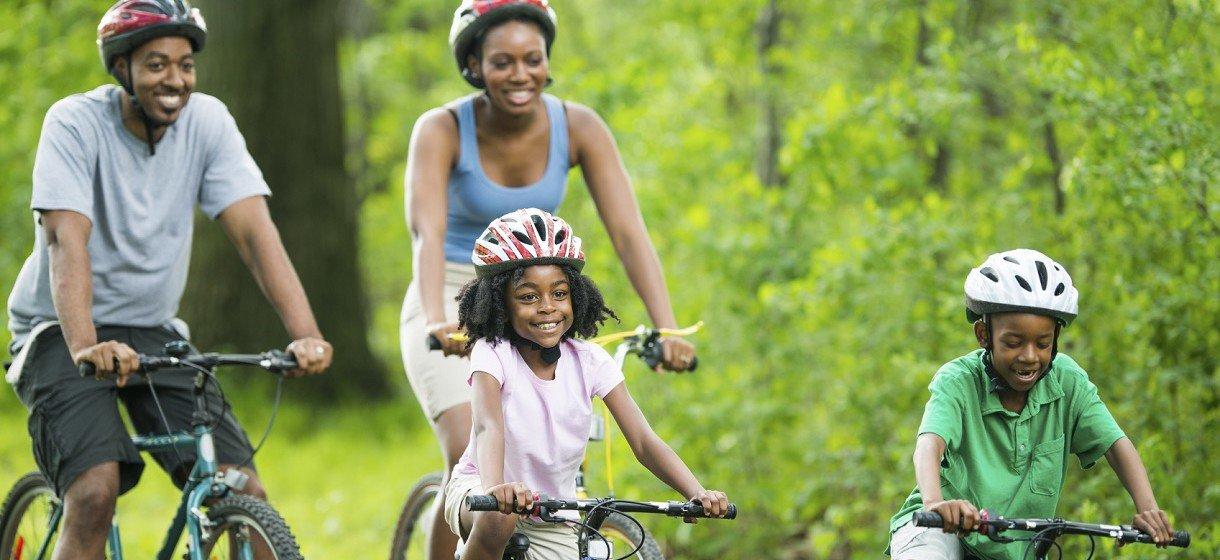


Look at the pictures. Try to guess the meaning of the words and phrases in bold. Stop complaining!
a van a raft rafting a wreck



Stop complaining!
Listen and repeat.
Listen and choose the correct answer.
a. The children are coming back from a walk.
b. The children are coming back from the cinema.
crawl
Listen again and answer the questions.
1. Did Justin like the film? And Alice?
2. What did the kids do after the film?
3. Does Boris like the van?
4. Where are the families going tomorrow?
Read the advertisement. Then listen to part of another conversation and answer the question.

•Which activities do the teenagers talk about?
Welcome to Extreme Adventure Action Park –the perfect place for adults and kids!
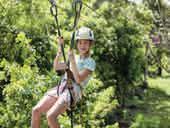

Enjoy a weekend full of fun and action. Be brave! Be adventurous! Try our activities! You

Now read the whole conversation and answer the questions below.
Alice: Justin: Boris: Vicky: Boris: Peter: Justin: Alice: Boris: Peter:
Vicky:
Boris: Vicky: Peter:
Dora:
Wow!
Rafting’s awesome!
Vicky, you can open your eyes now. It’s over!
It was so scary!
It was cool! Let’s do it again!
That’s enough for today. Let’s change out of our wet clothes and try something else. What about paintball?
And the rope garden, too.
After that, let’s try the zip wire.
I want to do all three.

What about you, Vicky?
Hmm. I don’t like crawling. And I hate climbing.
Come on, Vicky. Don’t be a chicken!
Paintball is fun!

OK, I’ll come. But I’ll skip the rope garden.
What about you, ladies? Will you join us?
I don’t think so. Anna and I will go to the picnic area. We’ll wait for you there.
Have fun and take care!
Don’t be a chicken!
1. Did Justin enjoy the rafting?
2. Why were Vicky’s eyes closed?
3. Will everybody go rafting again?

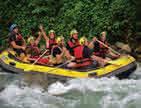
4. What does Peter suggest?
5. Which activities does Boris want to try?
6. What doesn’t Vicky like doing?
7. What will Dora and Anna do?
1. Will Forms
I You He She It We They
Will
POSITIVE
‘ll be (will be) 14 next month.
YES / NO QUESTIONS
I you he she it we they
When Where will
be 14 next month?
I You He She It We They
NEGATIVE
won’t be (will not be) 14 next month.

SHORT ANSWERS
WH - QUESTIONS
I you he she it we they
Study the examples. In your notebook, match them with the rules.
1. I’ll come with you.
2. I’ll be 14 next month.
3. I think it’ll be sunny tomorrow.
Yes,
be live 14? in 2030?
I you he she it we they
will No, won’t.
We use will
a.when we talk about future facts.
b.when we make predictions.
c.when we decide to do something at the moment of speaking.
We often use will with I think, I don’t think, I’m sure, I’m not sure.
Проєкт
Model:
I’m sure he’ll find his phone.
I’m not sure he’ll find his phone.
I think I’ll go out.
I don’t think I’ll go out.
8
Model:
Use will or won’t and make the sentences true. My grandpa won’t be 70 next year.
1. I think it ... rain later today.
2. Mum … be at home when I come back from school.
3. We … finish classes 15 minutes early today.

4. I … be busy at the weekend.
5. Our teacher … give us a test next week.
Ask and answer in pairs. Make predictions. Justin / enjoy the rope garden?
A: Will Justin enjoy the rope garden? B: Yes, he will.
1. The kids / go rafting again?
2. Vicky / enjoy paintballing?
3. John and Peter / join the kids?
4. Boris / try all the activities?
5. Vicky / be afraid of the zip wire?
6. John / try kayaking?
7. Anna and Dora / have a good time at the picnic area?
Make suggestions for the situations below. Choose from the ideas in the box.
•open the window •turn on the TV•ask somebody•help •answer the door•close the window•make a sandwich
A: It’s very hot. B: I’ll open the window.
7 9 майбутньогопідручникаВидавництво «Ранок»
1.A: I’m cold. B: ...
2.A: I’m hungry. B: …
3.A: I can’t do my homework. B: …
4.A: The doorbell is ringing. B: …
5.A: There’s a good show on TV. B: …
6.A: We don’t know the way to the station
B:
Do you remember?

Read the examples. What form of the verb do we use after love , hate and don’t mind ?
I
love like don’t mind don’t like hate
playing. sleeping. rafting.
Now read these sentences and answer the question below.
I
enjoy prefer start stop go on
reading. walking. talking.
When do we use verb + -ing ?

Now check with the rules.
We use verb + -ing after love , like , don’t mind , don’t like , and hate . We also use verb + -ing after enjoy , prefer , start , stop , go on , etc.
Look at the picture.
What does this teacher often say to her class? Use the ideas in the box and make sentences.
Model:
I know you enjoy learning English.
• read
• write
• learn English
• complain
• talk
• copy from the board
• ask questions
• listen
• do the exercise
• work in pairs
I know you enjoy …!


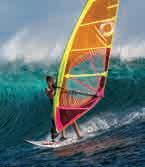

What leisure activities do you and your friends know? Work in groups of three or four. Make a list. Which of these activities do people do outdoors? Underline them in your list.


In your notebook, match the words with the pictures.
Read the text. Say the correct word for each picture.
The Johnsons are an active family. In winter, they go to a winter resort for a week. Mr and Mrs Johnson love
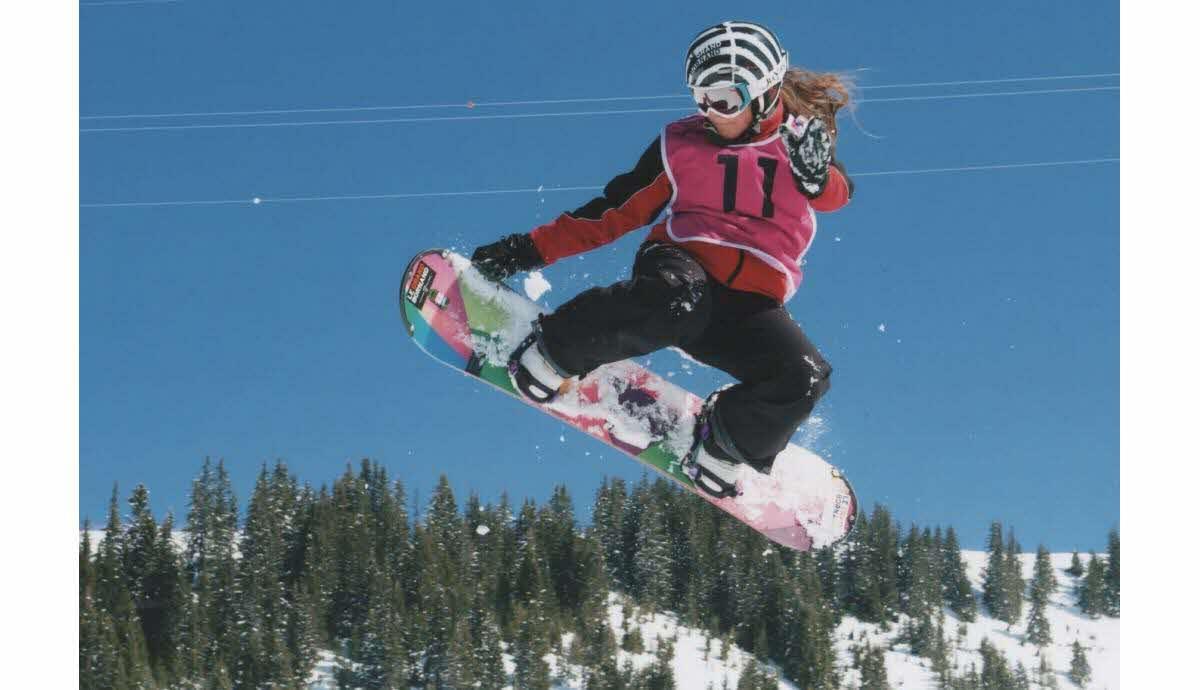

. Their children, Jack and Jane, prefer . In summer, the Johnsons spend two weeks at the seaside.
The whole family are mad about . Jack and Jane enjoy . Mr and Mrs Johnson also love . They want to try , too. In spring and autumn, the family go . At weekends, Jack often goes with his mates.

International words are similar in many languages. It is easy to remember them (e.g. surfing, rafting). Do you know any other international words?
mate (BrE, informal) = buddy (AmE, informal) = friend
Now listen and check.
Look at the poster. What is it about? When is the event?
Now read and listen to the dialogue. Then practise in pairs.

AUGUST 28, 11 AM
Camping, swimming, hiking, mountain biking

Dorothy:
Alice:
Dorothy: Alice:
Dorothy: Alice: Dorothy: Alice:
Dorothy: Alice:
Hi, Alice. I sent you a photo some minutes ago. Did you get it?
Hi, Dotty. Do you mean the poster?
Yeah. The school is organising a summer camp fest.

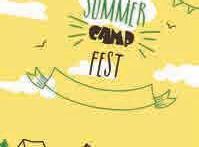



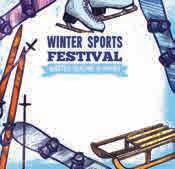

Great! When is it?
At the end of August. Will you be free then?
Yeah, I will. Look! Mountain biking.
I’m sure Justin will like it. And I enjoy camping and hiking


I prefer swimming
Will your parents let you go?
I’m sure they will. What about yours?
I’ll ask them later. But I think they’ll say ‘Yes’.

Now make a similar dialogue. Replace the words and phrases in bold with the suggestions on the right and your own ideas.
at the beginning my sister/brother/friend mum/dad
I’m not sure he/she him/her
Work in pairs. Look at the poster. Talk about the activities. Then change roles and make another dialogue.
You can use the dialogue in as a model.
Describing leisure activities



Read the description of an active family and answer the question.


• What do the whole family love doing?
The Jacksons are an active family. Mr and Mrs Jackson love water sports –swimming and kayaking. Their son, Michael, prefers canoeing. Their two daughters, Martha and Grace, love ice skating and are very good ice-skaters. The whole family are mad about camping and cycling. Every summer, they go on a cycling holiday.
Look at the family album of the Greens. What do they like doing? Write a similar description. If you prefer, describe what your family like doing. Follow the model above.


The sound eɪ

Listen and repeat.
date hate late mate
Now say these words. Then listen and check. make lake take shake
Grammar: be going to; will and be going to; prepositions of time





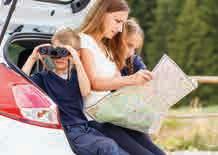
Functions: talking about plans and intentions for the future
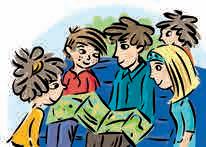
Vocabulary: means of transport
Pronunciation: the sound /e/
In pairs, answer the questions. How do you travel in your hometown? Why? How do you travel when you go on holiday? Why?
Look at the pictures. Try to guess the meaning of the words in bold.
a tour
Listen and say true or false. Correct the false sentences.
1. All the kids enjoyed the rafting.
2. They’re going to tour Ukraine for ten days.
The best is yet to come. = Even better things will happen in the future.
Model:
Listen again and answer the question: Who says these sentences?
That was a fantastic weekend. Alice
1. I’ll never forget it.
2. I was totally scared!
3. Thanks for taking us there.
4. The best is yet to come.
5. What do you mean ...?
6. How are we going to do it?
Listen to part of another conversation. In your notebook, put the pictures in the order you hear about them.

I’m all ears.
Now read the whole conversation and answer the questions below.
Dora:
Anna: Peter: Justin: Alice:
Dora:
John:
Dora:
Peter:
Alice:
Peter:
John: Peter:
Come here, everybody! Attention, please! Here’s our plan for the tour. We’re all ears!
Look at the map. We’re going to start from Kyiv, of course. And we’re going to the seaside. On the way, we’re going to stop over at some beautiful small towns. And we’re going to do some birdwatching. Birdwatching? Don’t you think that’s boring? Keep quiet, Justin! What are we going to do next? Next, we’re going to spend a few days at the seaside. I’m sure you’ll enjoy some swimming … sunbathing. Maybe some sailing?
Why not?
On our way back we’re going to visit grandma and grandpa. Lovely! I miss them a lot!
Then we’re going to a famous folk music festival in the Carpathian Mountains. That’s a great plan. When are we leaving?
The day after tomorrow. At 8 o’clock sharp.
1. Who starts talking about the tour?
2. Where are the families going to stop over?
3. Is Justin excited about birdwatching?

4. Who are they going to visit?

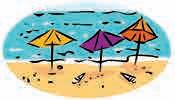
5. What festival are they going to?
6. What time are they leaving?
1. Be going to
Forms
POSITIVE
NEGATIVE
I ’m (am) going to visit my grandparents. travel by car.
She He ’s (is)
We You They ’re (are)
YES / NO QUESTIONS
Am I going to visit my grandparents? travel by car?


Is she he
Are we you they
WH - QUESTIONS
I ’m not (am not) going to visit my grandparents. travel by car.
She He isn’t (is not)
We You They aren’t (are not)
SHORT ANSWERS
Yes ,
Who am I going to visit? is she he
How are we you they travel?
I ’m not . she he is she he isn’t we you they are . we you they aren’t .
I am . No ,
Study the examples and answer the question below.
This is the plan for the tour. We’re going to spend a few days at the seaside. Then we’re going to visit grandma and grandpa.
When do we use be going to ?
Now check with the rule.
We use be going to + the base form of the verb to talk about our plans or intentions for the future.
base form of the verb = verb without to
Model:
8
Model:
Model:
Look at the pictures. Say am/is/are going to and one of the verbs in the box to complete the sentences.
Rick is going to paint the wall.
buy paint make travel stop over go play


Проєкт
Match the sentences in Column A with those in Column B.
Uncle Ben wants to learn German. He’s going to travel to Germany.
Видавництво
1. Uncle Ben wants to learn German.
2. They have to study for the test.
3. I want to be better at English.
4. There’s a football match on TV tonight.
5. They miss their grandparents.
6. It’s Martin’s birthday next week.
a. I’m going to read a book in English.
b. I’m going to get him a present.
c. He’s going to travel to Germany.
d. They’re going to visit them soon.
e. Are you going to watch it?
f. They aren’t going to watch TV.
Choose from the phrases below and write 5 things you are or aren’t going to do next month.
I’m (not) going to study English every weekend.
• do more exercise
• eat more vegetables
• play computer games
• save money for a new game

•watch films in English



•tour Ukraine

• go rafting
•go paintballing
•visit grandma and grandpa

2. Will and be going to Study the examples and answer the questions below.
I’m tired. I’ll go to bed in ten minutes.
I’m sure you’ll like my new friend. Are you going to have a party for your birthday?
Проєкт
When do we use will ? When do we use be going to ?
Now check with the rules.
We use be going to to talk about plans and intentions for the future. We use will when we decide to do something at the moment of speaking. We use will to talk about future facts and predictions.
10 11
Say the correct form.
1. What will you do / are you going to do tomorrow?
2. I think next year something very interesting will / is going to happen to you.
3.A: The telephone is ringing. B: OK. I’ll answer / I’m going to answer it.
4. Maria is busy this weekend. She’ll start / She’s going to start dancing classes.
5. A: I’m sorry, miss. I don’t understand. B: OK. I’ll say / I’m going to say it again.
6. I’m sure you won’t like / aren’t going to like rafting. It’s very scary.
In your notebook, complete the sentences with will /’ll or be going to .
1. A: What ... you ... do at the weekend?
B: I don’t know yet. Perhaps I ... go to the cinema or I … stay at home and study.
2.A: Are you going out? It’s very cold.
B: I … put on my jacket.
3.A: Mum, I’m hungry.


B: I ... make you a sandwich.
4.A: … you ... invite Anna to you birthday party?
B: I’m not sure.
5.A: I’m so thirsty!

lorry (BrE) = truck (AmE) motorbike (BrE) = motorcycle (AmE)



the Underground or the Tube (BrE) = the subway (AmE)
What words for means of transport do you know? Make a list in your notebook. What is a vehicle? Read the definition below. vehicle, n. a thing used for transporting people or goods, especially on land, such as a car, lorry, etc.

In your notebook, match the vehicles with the pictures.
f. a tram g. a motorbike

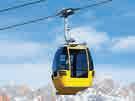

Underground
Read the texts. Say the correct word for each picture. Remember –some of the words are plural!
Philip:

Next summer, we’re going on holiday to an island. We’re going to cross the sea on the . It’s a big boat that carries a lot of , , , , and people in it.

Angela: Martin:
Next month, we’re going to fly to London. Travelling by saves a lot of time.
Next weekend, we’re going to climb Mount Hoverla. We’re going to take the and then continue on foot.
Read the information in the box. Discuss the questions below in small groups. Then report to the class.
In most big cities people can travel by bike, motorbike, car, taxi, bus, tram or the Underground/the Tube.
•Which is the fastest way to travel?
•Which is the slowest?
•Which is the cheapest?
•Which is the most expensive? Listen,
Prepositions of time: for and during for + period of time; during + noun
Read the examples below.
We’re going to tour Ukraine for 10 days. (How long?)
Justin almost fell asleep during the film (When?)
Say the correct preposition in each sentence.
Model:
The Wilsons are on holiday for one month.
1. What are you going to do … the winter holidays?
2. They are going hiking … three days.
3. Somebody’s phone rang … the film.
4. In summer, I always visit my grandparents … a week or two.
5. Some animals sleep … the day.
Read and listen to the dialogue. Then practise in pairs.
Andrew: Hello.
Dorothy: Hello, Andrew. This is Dorothy. Have you got any plans for this afternoon?
Andrew: I’m going to play football with my mates
Dorothy: Well, what about tomorrow morning?
Andrew: Let me think. Oh, yes. I’m going to visit grandma.
Dorothy: Oh, what a pity! What about tomorrow afternoon?
Andrew: Hey, why are you asking me all these questions? What have you got in mind?
Dorothy: Actually, I want you to meet my cousins from Edinburgh, but if you’re so busy …
Andrew: Wait! I want to meet them too. Why didn’t you start with that?
•do my homework
• take the dog for a walk
•go swimming
•tidy my room
•play computer games
•text my friends


Now make a similar dialogue. Replace the phrases in bold with the suggestions in the box and your own ideas.
Work in pairs. Choose a role card and make a dialogue. Then change roles and make another dialogue.


You are talking to Student B on the phone. Ask him/her about his/her plans for the weekend. At the end say that you want him/her to meet your friend from London. You are free on Monday afternoon, too. Tell Student B when and where you can meet.
You are talking to Student A on the phone. You are busy at the weekend. Answer Student A’s questions. Tell Student A what you are going to do. Say you are free on Monday afternoon. Agree to meet. (Say the time and place are OK.)
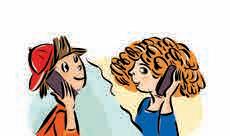

Describing weekend plans
Read the two emails below and answer the questions.
• What are Andrew and Bobby going to do together?
• What are Tina and Dorothy going to do together?
Hi Bobby,
It’s great you’ll be here this weekend. Here’s the plan. First, we’re going to play football. After that mum and dad are going to take us out to a pizza restaurant. In the evening – computer games! On Sunday, we’re going to sleep late. Then we’re going to go mountain biking with Dad. I’m sure it’ll be cool. Do you like this plan?
AndrewHi Tina, I’m so happy that we’re going to spend the weekend together. Here’s my plan. First, we’re going to meet some friends for a walk. After that we’re going to see a film. On Sunday, my friend Jane has got a birthday party. We’re going to help her with the sandwiches. I’m sure we’ll have a great time! Do you like this plan?
Imagine one of your friends or cousins is going to spend the weekend with you. Make a plan and write a similar email to him/her. Follow the models above.
Listen to the conversation and write the correct answers in your notebook.
1. At the weekend, the boy’s family are going to take … around Kyiv.
a. a bus tour
b. a walking tour
2. The boy … sure what he’s going to do.

a. is

b. isn’t
3. Maybe … will get bored quickly.

a. the boy
b. the boy’s brother
4. The girl’s family are going to
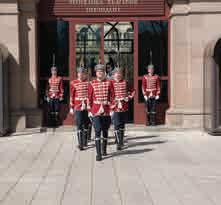
a. spend the day in the monastery
b. visit the monastery and go hiking.

5. In the evening, the girl’s family will stay
a. at a nearby hotel.
b. at the monastery.
Listen again and check your answers.
Read the article and write the correct answers in your notebook.
5 p.
A lot of people think the Grand Canyon is one of the seven wonders of the natural world. This famous national park is located in the State of Arizona, USA. The Colorado River runs through it.

The Grand Canyon became a national park in 1919. It is one of the 47 national parks in the USA. It is home to lots of Native Americans, who first started living there thousands of years ago.


The Grand Canyon isn’t the widest, longest or deepest canyon in the world but it is a very popular tourist destination. Around five million people visit it every year. It is a great place for hiking or rafting. Visiting the Grand Canyon National Park is easy even without a ranger or a tourist guide. There are audio guides that people can download to their mp3 player or mobile phone.
Source: http://www.sciencekids.co.nz
1. The Grand Canyon is

a. an ancient wonder.
b. a natural wonder.
2. The national park is in the state of
a. Arizona.
b. Colorado.
3. A lot of Native Americans … in the national park.
a. live
b. hunt
4. The Grand Canyon … the deepest canyon in the world.
a. is


b. isn’t
5. Tourists can go … there.
a. rafting and kayaking
b. rafting and hiking
6. It is not … to visit the Grand Canyon without a ranger or a guide.
a. easy
b. difficult
Work in pairs. Choose a role card and make a dialogue. Take turns.
Student A: Ask Student B about his/her plans for the winter/summer holidays. Invite Student B to join in your plans for the holidays.

Student B: Answer Student A’s questions. Accept or decline Student A’s invitation. If you decline, tell Student A what other plans you have got.
Go to page 22 in Workbook 1 to do the Grammar and Vocabulary sections.
I know how to: greet a friend. introduce a friend. make a request. describe personality. talk about arrangements, plans and intentions.
I can:
use the Present Continuous for actions happening now and for arrangements. use possessive ’s and s’


make predictions. talk about future facts. talk about active leisure and healthy lifestyle. talk about means of transport. use the gerund. use be going to for plans in the future.
use will

Grammar: the Past Simple: regular and irregular verbs; after ; zero article; prepositions of movement
Functions: talking about past events; describing the order of past events

Vocabulary: wild animals
Pronunciation: the sound /iː/
Now say the correct word to complete each sentence.
1. Look through the … and you’ll seethe bird clearly

2. About 269 … of birds build their nests in Ukraine
3. The … is one of the largest and strongest birds in the world.
4. Wow! The view from the top is …!
5. Mum, can you … any mistakes in my homework?
6. The museum has a lot of … objects on display
7. It isn’t a good idea to … lessons.
Answer the questions.
Do you like animals?
Do you like watching wildlife programmes? Can you name any protected animals in Ukraine?
Check the meaning of the words below in the Wordlist at the end of your Student’s Book.
a. an eagle e. spot (v.)
b. binoculars (pl.) f. rare
c. magnificent g. skip (v.)
d. species (pl.)
Listen and repeat.
Listen and check.
Listen and answer the questions.
1. What are the families going to do?
2. Which species of bird do they see?
The Eastern Imperial Eagle is a large bird of prey. It's 72-90 cm long and it's wingspan is 1.86-2.20 m. It's a protected species /'spi:ʃi:z/. There are only about 28 pairs of Eastern Imperial Eagles in Europe.
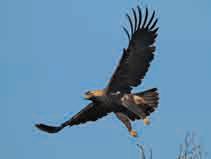
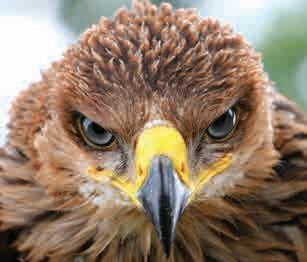
Model:
Listen again and answer the questions.
1. Where do the families need to go first?
2. Who hopes to see the Imperial Eagle?
3. Who doesn’t want to waste time?
4. Who spots the eagle first?
5. Where is the bird when they spot it?
6. What does Justin want to do?
Listen to part of an email and answer the question.
•Who wrote the email?
Now read the whole email and choose the best subject.
a. My trip around Ukraine b. A trip to Kremenets c. A birdwatching trip
From: ali.wil21@ezbox.co.uk
To: dorothy.black@ezbox.co.uk
Hey:) How are you? I’m having a great time here.
Our visit started with a small problem – my absent-minded brother left his mobile on the plane. Luckily, he found it. After that came the adventure weekend. I went rafting for the first time in my life. It was amazing!
On Tuesday morning, we started our Ukrainian tour. We drove to a small town –Kremenets. My mum (you know, she was born in Ukraine) wanted to see it again after so many years.
This morning, we moved on to our next stop. Dad had the idea to climb up a hill and do some birdwatching. Luckily, we spotted the rare bird before we even started. So, we skipped the climbing:)
And now, we’re on the road again ... the eight of us together in a van. How are things in London?
Read the email again and complete the sentences in your notebook. The visit started with a small problem.

1. Justin … but he … .
2. For the first time in her life, Alice … .
3. On Tuesday morning, they … .
4. Alice’s mum … .
5. Alice’s dad … .
6. They skipped the climbing because … .
GRAMMAR SPOT
Study the examples and answer the questions below. We started the tour yesterday. We drove to a small town.
Which verbs are regular?
Which verbs are irregular?
Now check with the rules.
Verbs that add -ed in the Past Simple are regular . Verbs that have special forms in the Past Simple are irregular .
There are three different ways to pronounce the -ed ending of regular verbs. Also mind the spelling of regular verbs in the Past Simple. We learn the forms of irregular verbs by heart.
Find five regular and five irregular verbs in the text in 6. Read the sentences.
In your notebook, write the Past Simple forms of the verbs below.
teach bring buy tell feel write understand fall
Listen, check and repeat.
In your notebook, complete the sentences with the Past Simple forms of the verbs in bold.
Model:
They got up early in the morning.
Vicky … Alice a Ukrainian folk song. Alice … an email to Dorothy

Uncle John … very happy when he … the Imperial Eagle.
Aunt Anna … the children a story about her visit to Kremenets when she … a child. They … some souvenirs.
Study the examples and answer the question.
After we arrived, we went on an adventure weekend. We went on an adventure weekend after we arrived.
What happened first?


Now read the rule.
We use after to talk about the order of events. We put after in front of the action that happened first.
Look at the pictures. Follow the model and make sentences with after and the Past Simple. Be careful – some of the verbs are regular!
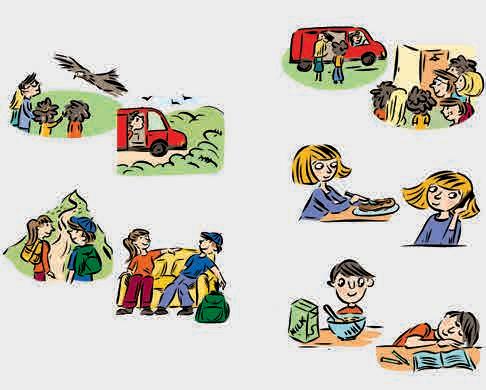
see the eagle have a snack fall asleep get into the van make a sandwich go back home arrive call grandma go hiking be very tired
Model:
After they arrived, they saw the eagle.
Make sentences again. Follow the model below.
Model:
They saw the eagle after they arrived.
Read and compare the sentences in each pair.
a. We go climbing every weekend.
b. We were very tired so we skipped the climbing.
a Eagles can spot small animals up to 3 km away.



b.The eagle saw us and flew away.
a.Children like ice cream.
b.The children in my class like ice cream.
Answer the questions.
Which sentences are about particular things or people?
Which sentences are about things or people in general?
When do we use the ?
When do we use zero article ?

Now check with the rules.
3км
We use zero article when we talk about people or things in general. We use the when we talk about particular people or things.
Say the in the following sentences where necessary.
1. Mum likes … beautiful small towns.



2. … small towns we visited during the trip were very pretty.
3. Children love … animals.
4. In the zoo: Don’t feed … animals.
5. At the adventure weekend, Vicky didn’t enjoy … rafting but she liked … paintballing.
6. … rafting and … paintballing are popular outdoor activities.
7. … students don’t like doing their homework.
8. … students in my class like English lessons!
animals
What words for animals do you know? Make a list in your notebook.
In your notebook, match the animals with the pictures.
a. an ostrich
b. a meerkat
c. a tapir
d. a platypus
e. a sloth
f. an anteater
g. an armadillo
Listen, check and repeat.
15
Do the quiz in your notebook.
1.Which animals live in the desert?

a. Anteaters
b. Sloths
c. Meerkats
2.Which animals are the fastest runners?
а. Ostriches
b. Tapirs
c. Sloths
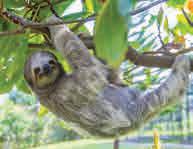
3.Which animals can’t see well?
a. Armadillos
b. Meerkats
c. Ostriches
4.Which animals move only when necessary?
a. Platypuses
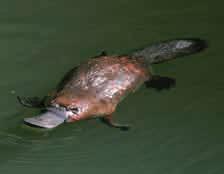
b. Sloths
c. Anteaters
5.Which animals are the heaviest?
a. Ostriches
b. Tapirs

c. Armadillos
6.Which animals haven’t got any teeth?
a. Anteaters

b. Armadillos
c. Meerkats

7.Which animals live in Australia?
a. Armadillos

b. Platypuses
c. Ostriches Listen, check and repeat.

Model:
Prepositions of movement: into , out of , up , down


1. Look. The lift is going up
2. And now it’s going down .
Say the correct preposition in each sentence. It’s raining. Let’s get into this shop.
1. They got … the car and drove on.
3. Get into the car, girls. We’re late for school!

4. It’s polite to help a woman get out of a car.
2. Please, stop the car! I’m sick. I have to get … the car.
3. We climbed … the hill and took some pictures.
4. He slipped and fell ... the stairs.
Read and listen to the conversation. Then practise in groups of four.

Gabi: Vicky: Gabi: Vicky: Gabi: Justin: Gabi: Alice: Gabi:
Hey, did I tell you about my holiday last month?
No, you didn’t. Where did you go?
I went to a fancy hotel in the mountains with mum and dad. Well, what happened?
We wanted to go rafting and hiking. But when we arrived, it started to rain. It didn’t stop raining for five days.
Did you go hiking in that weather?
No, of course, we didn’t! Not when there was a warm outdoor swimming pool! We swam in the rain! It was cool!
That sounds mad!
Yeah! We had such fun!
Now make a similar conversation. Replace the phrases in bold with the suggestions in the box and your own ideas.
last summer last year at the seaside swimming surfing sailing sunbathing
Work in pairs. Talk about your summer holidays. Then change roles and make another dialogue. Use the conversation in as a model.
Read the text about meerkats and answer the questions.
• Where do meerkats live?
• How do they communicate?
Meerkats are small animals. They live in Africa. Meerkats have got long slim bodies. They are 60 to 75 cm long from head to tail. They weigh about 0.5 to 2.5 kg. They live up to 14 years.

Meerkats live in large underground networks with a lot of entrances. They communicate with calls. Their calls have different meanings!
Now read the chart below. Write a similar text about anteaters.

Animals: Giant Anteaters

Live in: Central and South America
Body: long, strong
Length: 90–210 cm

Weight: 18–40 kg
Live up to: 16 years
Fun facts: Anteaters’ tongues are longer than their heads!
You can write about any other animal that you think is interesting. Look for information on the Internet.
The sound iː

Listen and repeat.
he me Peter meter

Now say these words. Then listen and check.
be we she
Grammar: the Past Continuous; while ; a dozen/dozens of ; a hundred/hundreds of ; prepositions of place




Functions: telling a story; describing two actions happening at the same time
Vocabulary: wild plants; protecting the environment
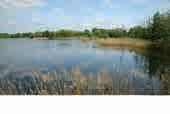

Pronunciation: the sound /ɪ/
Answer the questions.
Do you like going to the beach? What can you do at the beach?
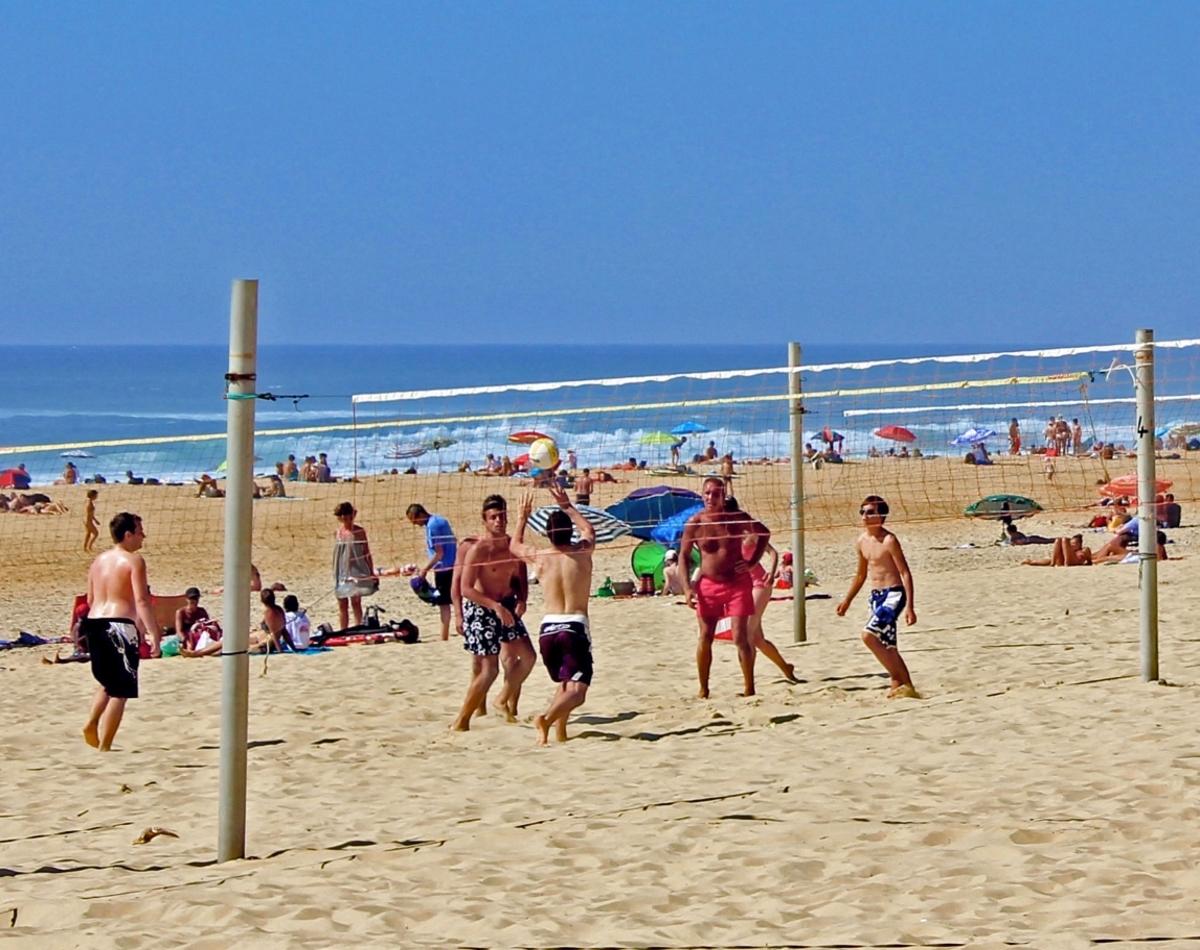
In your notebook, match the words with the pictures.
a. a dune d. a path g. a nature reserve

b. a sea daffodil e. a water lily h. a towel

c. a swimsuit f. rubbish i. swimming trunks (pl.)


Listen and choose the correct answer.
1. Where do the families go first?


a. To the beach. b. To the hotel.
2. What does Vicky see?
a. Dunes. b. Plants.
Listen again and answer the question: Who says these sentences?

1. Last stop.
2. Finally!
3. Speed up!
4. We’re ready!
5. Let’s follow the path.
6. It’s a rare plant!
7. There are dozens of sea daffodils. Amazing!
8. I know it from school.
9. You clever girl!
Read the statements below. Then listen to part of another conversation. Which statements are true?
1. a. Vicky, Alice, Boris and Justin spent the day with their mothers.
b. Vicky, Alice, Boris and Justin spent the day with their fathers.
2. a. The children found a secret beach after they visited Danube Biosphere Reserve.
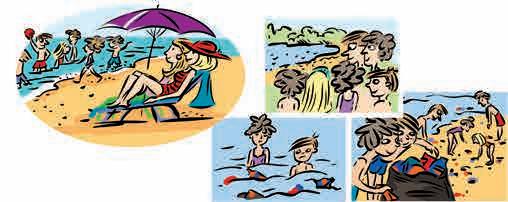


b. The children found a secret beach and then visited Danube Biosphere Reserve.
Note the difference!
Now read the conversation аnd match the two parts of the sentences in your notebook.
Alice: Anna: Justin: Alice:
Vicky: Justin: Dora:
Alice:
Justin:
Boris:
Vicky: John:
Anna:
Justin:
Mum, we’re back!
Where were you all this time?
We were exploring the area, Mum!
First, we went sailing along the Danube River and we visited Danube Biosphere Reserve.
While we were sailing, we saw hundreds of rare birds. This was in the morning. Then in the afternoon we found a secret beach. A secret beach?
Yes, Aunt Dora. We discovered it while we were walking around. It was really cool. There weren’t many people there. But while we were swimming, we saw some plastic bottles floating in the sea. And there was some rubbish on the beach.
We collected the rubbish in a bag. A family with a sailboat took it with them. They’re going to throw it away in recycle bins.
So, dear, while you and Dora were sunbathing, the kids, Peter and I were saving the planet. Well done, everybody!
The explorers are hungry!
Everybody: Justiiiiiin!
1. In the morning, they went sailing
2. They saw some rare birds
3. They discovered a secret beach
4. They spotted some rubbish
5. They collected the rubbish
6. Dora and Anna were sunbathing
Listen and check.
a. while they were walking around.
b. while the others were cleaning the secret beach.
c. and visited a nature reserve.
d. and a family took it away.
e. while they were sailing.
f. while they were swimming.
YES / NO QUESTIONS
Was I he she it swimming ?
Were we you they WH - QUESTIONS
Проєкт
Where was
I he she it swimming ?
were we you they
Answer the questions.
How do we form positive sentences? How do we form negative sentences? How do we form Yes/No questions?
Now check with the rules.
In positive sentences, we use was /were + verb + -ing . In negative sentences, we use wasn’t /weren’t + verb + -ing . In Yes/No questions, we put was /were at the beginning.
Study the example and answer the question below.
At 4:00 pm yesterday, they were swimming.
When do we use the Past Continuous?
Now check with the rule.
We use the Past Continuous to say what was happening around a certain time in the past.
Yes ,
SHORT ANSWERS
I he she it wasn’t we you they were we you they weren’t
I he she it was No ,
IMPORTANT!
Remember the spelling rules with -ing .
7 8
Model: Model:
11:00





What were they doing at 11:00 am yesterday? Say the correct Past Continuous form of the verbs in bold.
sunbathe
Dora and Anna were sunbathing.
1.sail John, Peter and the kids ... .
2.read Dora … a book.
3.text Anna … a friend.
4.chat Vicky and Alice ... .
5.laugh Justin and Boris ... .
Say sentences in the Past Continuous. Use the information below. Follow the model.
At 9:00 аm yesterday Justin was eating a sandwich.
•eat a sandwich (Justin, 9:00 am)
•drive (Peter, 11:00 pm)
•eat ice cream (Vicky and Alice, 2:00 pm)
•swim (Justin and Boris, 4:00 pm)
•drink tea (Dora and Anna, 5:00 pm)
Model:
Ask and answer in pairs. Use the information in
A: Was Justin swimming at 9:00 аm yesterday? ( ) B: No, he wasn’t. He was eating a sandwich.
1. Was Peter sailing at 11:00 am? ( )



2. Were Vicky and Alice eating ice cream at 2:00 pm? ( )
3. Were Justin and Boris swimming at 4:00 pm? ( )
4. Were Dora and Anna sunbathing at 5:00 pm? ( )
Model:
2. While
Study the examples and match them with the rules.
1. We saw some rare birds while we were sailing
2. They were swimming while he was sleeping
a.We use while to say that a short action happened during a long action.
b.We use while to say that two actions were happening at the same time.
5. Was John sleeping at 11:00 pm? ( ) IMPORTANT! When we have a short and a long action, we put while in front of the long action.
Join the sentences with while .
Dora and Anna were sunbathing. The others were cleaning the beach.
Dora and Anna were sunbathing while the others were cleaning the beach.
1. Boris phoned Vicky. She was sunbathing.
2. The cousins saw Gabi. They were waiting in front of the cinema.
3. We were chatting. We were eating ice cream.
4. The family saw the Imperial Eagle. John was talking about it.
5. The children discovered a secret beach. They were exploring the area.
Listen and check.
IMPORTANT!
In your notebook, join the sentences with while . You can put while at the beginning of the sentence, too.
Model:
Andrew lost his mobile. He was walking in the park. Andrew lost his mobile while he was walking in the park.
1. They were walking to the beach. They saw dozens of sea daffodils.
2. Justin fell asleep. He was watching a film.
3. Vicky was listening to music. Her mobile rang.
4. Justin came into the room. Alice was writing an email to Dorothy.
5. They collected a lot of rubbish. They were cleaning the beach.
When the sentence begins with while , we put a comma after the long action. While he was walking in the park , Andrew lost his mobile. long action
Model:
A dozen/dozens of , a hundred/hundreds of


12 = a dozen 100 = one hundred
Study and compare the examples.
Mum needs a dozen eggs for the cake. There are dozens of sea daffodils in this nature reserve.
A hundred people took part in the swimming race. They saw hundreds of rare birds.
Say a dozen, a hundred, dozens of or hundreds of to complete the sentences. There is more than one correct answer. Translate the sentences into Ukrainian.
A group of twelve things is a dozen.
1. There were … people in front of my school this morning.
2. Only … people live in this village.
3. I’ve got … contacts on my Viber account.
4. Мum tells me … times a day to be careful when I cross the street.
5. My dad answers … emails every day.
one (a) billion = 1,000,000,000
the environment = the natural world around us (the land, the water, the air, plants and animals)
We use a dozen and a hundred to mean an exact number: 12 and 100. There are dozens of seals and dolphins in Danube Biosphere Reserve.
In informal English, we sometimes use a hundred when we mean a large number. Jane has got a hundred problems at school.
Read the text. Try to guess the meanings of the words and phrases below. Then look them up in the Wordlist at the end of your Student’s Book. go green recycle reuse save energy save water
‘Going green’ is a new way of thinking about the world around us and about the way we live our life.
When we talk about ‘saving the planet’ or ‘saving the environment’, we are actually talking about our life in the future! That’s because we ALL need:
• Clean air to breathe
• Clean water to drink
• Healthy food to eat
• Healthy places to live in
• Energy for the places where we live, learn, play and work.
Maybe you are thinking: ‘Hey, I’m just one person on a planet with billions of people. What can I do?’ ‘Going green’ starts with small, simple actions: save energy, save water, reuse and recycle things.
These small, simple actions will help us save the planet and make our life happier and healthier.
Work in pairs. Copy the word webs into your notebook. Complete them. Use the phrases in the box and your own ideas.
ways
Проєкт
•waste paper
•plastic bottles
•glass
•take shorter showers
•bottles
•notebooks
•magazines
•plastic bags
•paper cups
•newspapers
•turn off the lights
•turn off the TV
Listen, check and repeat.
Look at the pictures and answer the questions.
•Where do we put paper?
•Where do we put metal and plastic?
•Where do we put glass?
•Where do we put general waste?

If you don’t know the answers, look for recycle bins in the street or check on the Internet.

Prepositions of place: in , on , at Read the examples below. Finally, we’re at the seaside! Look, there are some plastic bottles in the sea. Our hotel room is on the second floor.
in on a room/a buildingthe ground the street the second floor a park/a gardena road the water the wall the sea a page at the door the desk the seaside the bus stop the end of the street
Say the correct preposition in each sentence.
Model:
I left my mobile in the hotel room.
1. Vicky and Alice are … the door. They’re going out.
2. The kids spent the morning … a nature reserve.
3. The Wilsons and the Biyvovks are … the road to Lviv
4. Boris and Justin were swimming … the sea when they heard a scream.
5. There’s a park … the end of this street.
6. Look at the exercise … page 105.
Read and listen to thе dialogue. Then practise in pairs.
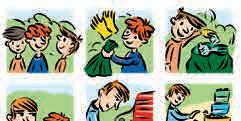
A: What are you going to do with this paper bag?
B: I’ll throw it away.
A: Where?
B: In the bin, of course, not on the ground.
A: Look at this note here – Reuse or recycle this bag.
B: What do you mean?
A: You can throw it in the recycle bin over there. Going green. Don’t you remember this lesson?
B: Yes, you’re absolutely right. Thank you for the idea. I’m going green! Yippee!
•plastic bottle
•plastic bag
•sign
•bottle
• bag
• fill it with water at home and use it again
•use it again when you do the shopping
•... that’s a good idea. Thanks.
Now make a similar dialogue. Replace the words and phrases in bold with the suggestions in the box and your own ideas.

Discuss in pairs or small groups. Then report to the class.
•Did you reuse or recycle anything last week? Why not?
•Did you do anything to save water or energy?
•What else can you do to ‘go green’?
•When are you going to start doing it?
Read Alex’s homework and answer the question.
• What did Alex do last Saturday?
Last Saturday, there was a clean-up in my town. My parents and I got plastic bags and gloves and went to the park. We collected plastic and glass bottles and paper cups. While we were cleaning, people stopped and said: 'Well done!'. After we collected all the rubbish, we separated the plastic, glass and paper and threw them in recycle bins.
Write a similar story about a clean-up in your town or at your school. If you prefer, describe the clean-up in Alex’s neighbourhood.
The sound ɪ
Listen and repeat.
bit hit sit wit
Now say these words. Then listen and check.
bill fill hill will

Grammar: the Past Simple and the Past Continuous, so and such Functions: describing past events; making an excuse
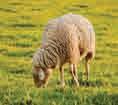

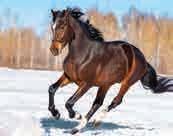



Vocabulary: the city and the country

Pronunciation: the sound /aɪ/








Look at the pictures. Try to guess the meaning of the words in bold. Then look up the words in the Wordlist at the end of your Student’s Book.
Answer the questions.
Where do you live – in a city, a town or a village?

What is good about living there?
What is not so good?
Listen and answer the questions.
1. Where are the Biyvovks and the Wilsons going?
2. Did they have any problems on the way to the village?

Listen again and answer the questions.
1. What does Granny mean when she says ‘All my darlings together!’?
2. Where did the families stop on the way?

3. What does Justin want to show his grandparents?

4. What was Granny doing while they were travelling?

5. Who smells food?


Listen to part of another conversation. In your notebook, put the pictures in chronological order.
Now read the whole conversation and the sentences below. Say true or false. Correct the false sentences.
Alice, Vicky: Heeelp!
Justin: What’s the matter?
Alice: Scare these monsters away!
Boris: Monsters? Justin, can you see any monsters around? Do you mean these geese, girls? Shoo! Shoo!
Alice: Thanks, Boris! Oh, my! That was scary!
Boris: What happened?
Vicky: Alice and I were in the field behind the house. While we were walking, we heard a hissing sound. We turned around and saw these scary birds.
Justin: You mean the geese, yeah?
Alice: They were following us. And then they attacked us!
Justin: Seriously? Weren’t they just grazing?
Alice: No! We started running and they started chasing us!
Vicky: And then you saved us!
Alice: You guys are very brave! Oh-oh! Justin, Boris, don’t look back! Run!
Boris: What is it, Alice?
Alice: It’s a bull! Ruuuun!
Dora: Look who’s coming! What’s going on? Why are you galloping?
Vicky: I feel like I’m in a horror film! So many monsters around …
Boris: The geese were OK, but this bull …
Anna, Dora: What bull?
Alice: You guys ran very fast … but I was just kidding you …
Boris, Justin: Aliiiice!
Model:
Some monsters scared Vicky and Alice. False. Some geese scared Vicky and Alice.
1. Boris scared the geese away.
2. While Vicky and Alice were walking, they met Justin.
3. The geese were hissing at the girls.
4. Vicky and Alice chased the geese.
5. The children were running when Dora and Anna saw them.
6. Alice was joking about the bull.

1.The Past Simple and the Past Continuous
Study the examples and answer the questions below.
1. Justin took a lot of photos.
Model:
2. I was tidying my room at 5:00 pm yesterday.


3. While Vicky and Alice were walking, they heard a hissing sound. My brother was hiding behind a tree when we spotted him.
When do we use the Past Simple?
When do we use the Past Continuous?
Now check with the rules.
a.We use the Past Simple to talk about a completed action in the past.
b.We use the Past Continuous to say what was happening around a certain time in the past.
c.We often use the Past Continuous and the Past Simple together when we talk about a long and a short action in the past. The long action is in the Past Continuous. The short action is in the Past Simple.
Say the correct form to complete the sentences.
John sprained / was spraining his ankle while he hiked / was hiking. John sprained his ankle while he was hiking
1. When the children were arriving / arrived, granny and grandpa waited / were waiting for them.
2. Vicky and Alice walked / were walking in the field when the geese attacked / were attacking them.
3. Dora and Anna relaxed / were relaxing when they heard / were hearing the children coming.
4. Peter was driving / drove very slowly when he saw / was seeing a horse on the road.
5. Granny cooked / was cooking lunch when I called / was calling her.
6. The eagle flew / was flying above the trees when they spotted / were spotting it.
In your notebook, complete the sentences with the correct tense of the verbs in bold: the Past Simple or the Past Continuous.
arrive, wait
Model:
1.fall, watch
2.climb, start
3.find, jog
4.see, drive
5.take, enjoy
6.make, come
Listen and check.
2. So and such
When the Wilsons arrived at Kyiv Airport, the Biyvovks were waiting for them.
Justin … asleep while he … a film. They … up the hill when it … to rain. Justin … a lost dog while he … in the park. They … some rare birds while they … to the village. We … this photo while we … the view. Anna … tea when Alice and Vicky … in.
So and such mean ‘very, really’.
Study the examples and answer the questions.
1. I’m so happy to see you.
2. Granny walks so slowly.
3. It’s such a sunny day!
4. You’re such clever children!
Complete the sentences. Say so or such .
Model:
Dad is so hard-working.
1. Don’t be … curious!
2. Why are you … a stubborn child?
3. Thank you, Alice! You’re … a kind girl!
4. I feel … happy! It’s … a wonderful day!
5. Sometimes I’m … absent-minded!
6. Gabi and Vicky are … good friends!
Model:
When do we use so ? When do we use such ?
Now check with the rules.
We use so + adjective or adverb. We use such + (adjective) + noun.
In your notebook, complete the sentences with so or such .
This test is so hard. It’s such a hard test.


1. Granny cooks … well. She’s … a great cook!
2. These children are … naughty! They’re … naughty children!
3. My sister is … a bossy person! She’s … bossy!
4. Grandpa is … generous. Grandpa is … a generous man!
5. Boris and Justin can run … fast. They’re … fast runners!
6. My little brother is … a selfish boy! My little brother is … selfish.
What kinds of buildings and places can you find in the city and in the countryside? Work in small groups. Make a list. Then report to the class.


Look at the pictures. Guess the meaning of the words and phrases. Listen,


the Underground/the Tube (BrE) = the subway (AmE)
subway (BrE) = underpass (AmE)
You can’t cross the street here. (BrE) Use the subway over there. (AmE) Use the underpass over there.
Say the correct words from to complete the sentences.
1. There is a large wooden … in front of our house.
2. Grandpa has got a … where he grows the most delicious grapes.
3. My father works in an … in the city centre.
4. There are lots of apple and pear trees in this … .
5. This … has got 50 floors. It’s the tallest building in the city.
6. My grandparents have got a lovely … in the country. They keep two cows and some hens in the … .
7. There’s a lot of … in my street and I always use the … to get to the other side.

8. We live in a flat. Our … is on the main street and it’s a bit noisy.

Read and listen to the dialogue. Then practise in pairs.
Lea: Hello.
Sara: Hi, Lea.
Lea: Hi, Sara. I called you 10 minutes ago.
Sara: Sorry, I couldn’t answer because I was talking to mum. What is it?
Lea: Listen! What shall we do this afternoon? Why don’t you come to my house?
Sara: Great. We’ll find something to do.
Lea: Yeah. See you later.
Sara: OK. Bye.
Sorry, I couldn’t answer.
I’m really sorry. I didn’t hear my mobile because …
I’m terribly sorry. I didn’t answer because …
Now make a similar dialogue. Replace the phrases in bold with the ideas in the box or invent your own excuses!
USEFUL LANGUAGE
•Sorry, I didn’t answer but …
•I’m really sorry. I didn’t hear my mobile because …
•I’m terribly sorry. I didn’t answer because …
•I was riding my bike.
•I was listening to some music.
•I was talking to my teacher.
Work in pairs. Choose a role card and make a dialogue. Then change roles and make another dialogue. Use your own ideas.
Student A: YouaretalkingtoStudentBonthe phone.Twodaysago,youinvited StudentBtoapartybuthe/she didn’t come. Askwhy.Acceptorrefuse.





You are talking to Student A on the phone. Two days ago, Student A invited you to a party but you couldn’t go.
Make an excuse (say why you couldn’t go and what you were doing). Invite Student A to meet today and do something together.
Say goodbye.
Read the paragraphs and answer the questions.

• Where do Ben’s grandparents live?
• Where do Jenny’s grandparents live?
My grandparents live in a small village in the mountains. They have got a cottage with a barn and a large yard. My grandparents grow tomatoes, peppers, cucumbers and potatoes in the small garden behind the cottage. They have got an orchard, too. It’s just outside the village. The orchard has got a dozen apple and cherry trees.
My grandparents live in a big city. They have got a flat. In spring, they leave the city and move to their country house. It’s very old but it has got everything they need. Grandma grows a lot of vegetables and flowers. Grandpa loves his vineyard. In autumn, my grandparents move back to the city where they spend the winter.
Write a similar description of the place where your grandparents or other relatives live. Follow one of the models above.


The sound aɪ

Listen and repeat.
bite site white write

Now say these words. Then listen and check.
fine line mine nine
1. You can see various waterbirds

a. only in summer.
b. all year round.
Listen to the text and write the correct answers in your notebook.
2. Visitors can observe … in the Manager’s Garden.
a. butterflies
b. birds
3. You can go on a school visit to the Reserve on


a. Tuesday.
b. Wednesday.
4. Visitors can … the binoculars at the Visitor Centre.

a. use
b. buy
5. The guided walk around the Reserve starts from


a. the Visitor Centre.
b. the main car park.
Listen again and check your answers.

Read the article and write the correct answers in your notebook.

Dolphins are some of the most playful and intelligent animals on our planet. They live and travel in groups called pods. Dolphins communicate through different sounds. Researchers at one of the Nature Reserves believe that these sounds are like the words and sentences people use to communicate. The researchers studied two Black Sea bottlenose dolphins, called Yasha and Yana. The dolphins lived in a swimming pool. The scientists noticed that one dolphin listened to the sounds that the other one was making and then replied. It looked like a conversation between two people.
The researchers found that Yasha and Yana could create sentences of up to five ‘words’. Scientists believe that dolphins use their language to identify themselves, have relations with other dolphins, and do things together.
1. A pod is
a. a place where dolphins live.
b. a group of dolphins.
2. Yasha and Yana were the names of
a. the dolphins.
b. the researchers.
3. The scientists recorded two dolphins
a. in a pod.
b. in a pool.
4. While one dolphin was making sounds, the other dolphin
a. was listening.
b. was answering.
5. The dolphin ‘sentences’ were … than five sounds.

a. longer
b. no longer
6. Scientists believe that dolphins use their language to exchange information
a. with people.
b. with dolphins.
Choose a role card and follow the instructions below.
Tell Student B what happened at school yesterday. Make two or three ‘mistakes’.

Listen to Student A carefully. After he/she finishes, correct the ‘mistakes’. Be polite. You can start like this: It was a nice story but you weren’t always right … for example you said ‘We didn’t have English’ but in fact we had …;
‘We didn’t start/finish at …’ but we started/finished at…;

‘We weren’t having a Literature class at ...’ but we were doing a test in …, etc.
Go to page 42 in Workbook 1 to do the Grammar and Vocabulary sections.
I know how to:

talk about wild animals and plants. talk about environmental protection. talk about the city and the country. talk about past events. describe the order of past events. describe two actions happening at the same time. tell a story. make an excuse.
I can:
use the zero article. use the Past Simple. use the Past Continuous. use after and while use so and such use a dozen/dozens of; a hundred/hundreds.

Do you know what yoga is?
Yoga is a system of exercise, meditation and breathing. It comes from Ancient India. A lot of children around the world do yoga at school. It is fun and relaxing and it is great exercise for a teenager’s body and mind. Yoga makes you stronger, fitter and healthier. It helps you concentrate and relax.

Yoga practice consists of hundreds of different poses. Each position or pose is named after a different object, person or animal, for example, tree, cat, etc.




Look at these yoga positions below and try to guess their names. Use the words in the box.
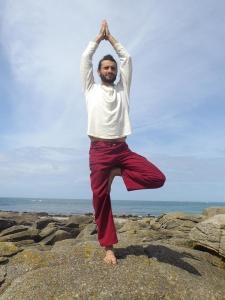
Now read the instructions and match them with the positions. Did you get the names right?
Mountain position
Stand up straight with feet together, shoulders relaxed, arms by your side. Take a deep breath and raise your hands over your head with arms straight. Reach up towards the sky with your fingertips.
Tree position
Stand up straight. Put your right foot on your left thigh. Join your hands in front of your chest.
Chair position
Stand up straight, legs together. Raise your arms. Bend your knees as much as possible and try to keep your heels on the floor.
Forward bend
Stand up straight, keep your back straight too. Slowly bend forward. When you can’t keep your back straight any longer, lower your head and grab your legs with your hands.
Look at the pictures in again. Do these yoga exercises seem easy to do? Choose one of the positions and try it out! Ask your classmate to check if you are doing it right! Take turns and then discuss the questions below.
• How do you feel after doing these exercises?
•Was it difficult?
•Do you want to do it again?
Now challenge yourself with the movement you think is the most difficult! Have fun! You can do these exercises when you are stiff or stressed. Or when you need to move a little, maybe during the break!
Listen to the song.
OUR WILD FLOWERS
Verse 1:
The fields are full of lovely flowers, To name them all will take you hours. Some stand up tall, some stay down low, Some climb on others as they grow.
Verse 2:
Their colours always are a joy –Pink for a girl, blue for a boy, And purple, yellow, cream and white Their petals wave – a gorgeous sight.
Chorus:
You’ll find them everywhere you look: Under the trees, beside the brook, Even on the city street
There are wild flowers by your feet.
Verse 3 (repeat):
We must be sure they will survive, Protect them, keep them safe, alive. Leave them flowering in the sun To be enjoyed by everyone.
Chorus:
You’ll find them everywhere you look: Under the trees, beside the brook, Even on the city street
There are wild flowers by your feet.
Grammar: quite /very ; (not) as as ; reflexive pronouns


Functions: comparing people and things; talking about festivals and celebrations; birthday greetings; agreeing

Vocabulary: festivals and celebrations

Pronunciation: the sound /ɒ/
Answer the questions.
Look at the pictures above. What kind of festivals are these? Do you know of any folk music festivals? Is there a folk music festival in your town?
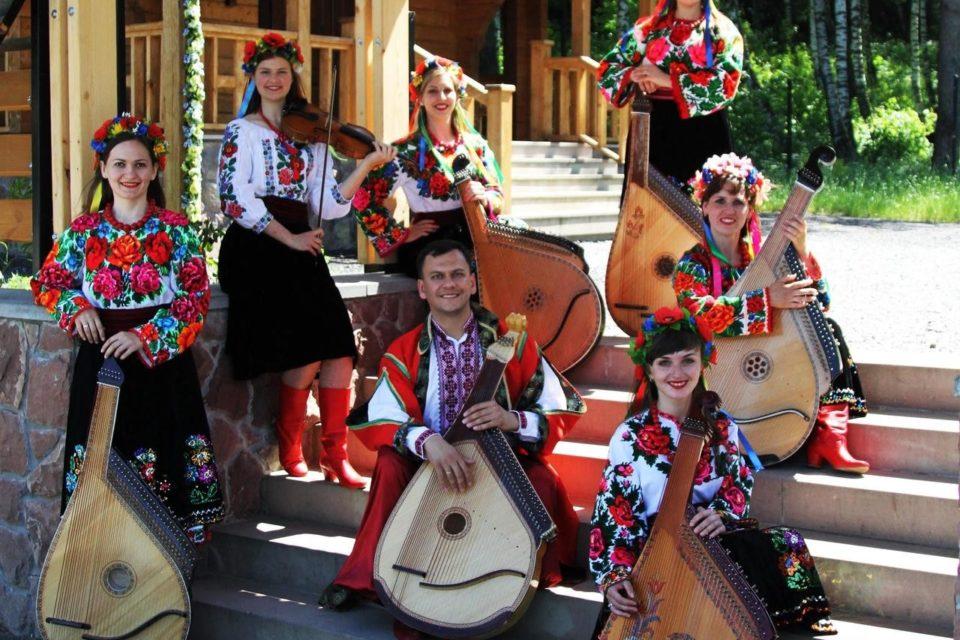
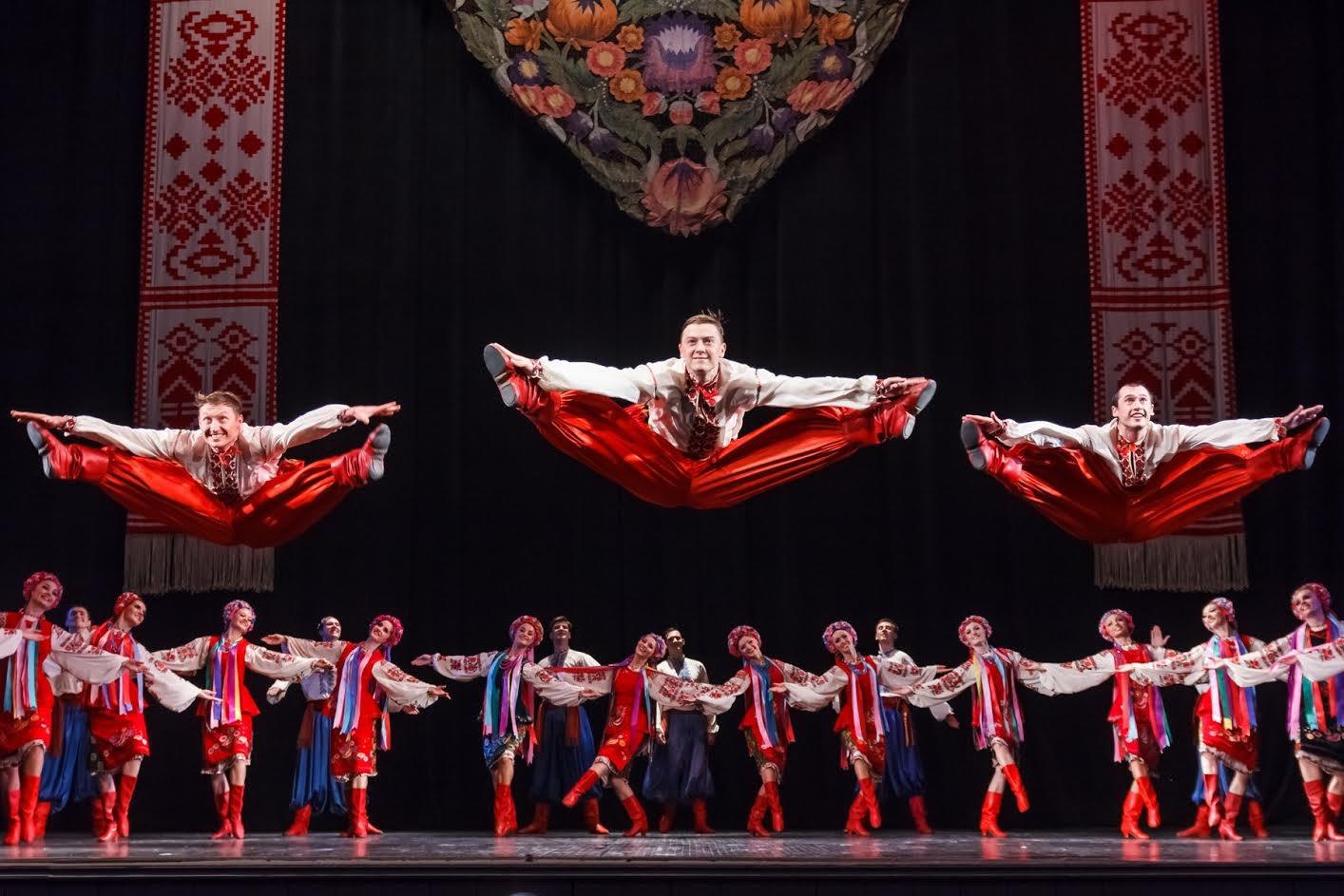

crowd, informal –a group of friends I spent the day with the usual crowd.
WORDS IN ACTION
a
exhausting
майбутньогопідручникаВидавництво «Ранок»
rhythm a wolf

3
Read the webpage and answer the questions.
1. WhendoesthePipingLive! FestivalinGlasgowtakeplace?
2. Is it a national or an international festival?


3. What can you do at the festival? 4


Piping Live! Festival

The Piping Live! Festival in Glasgow takes place in August. For one week the meadows and hills around the picturesque city of Glasgow host an exciting competition among bagpipers from all over Scotland and from across the world. This year there will be participants from France, Hungary, the UK, the Netherlands and Japan. The youngest participant is 5 and the oldest – 85! Come and enjoy this incredible celebration of folk music, traditional dances and colourful national costumes.
Read the webpage again. Find the words that match the definitions below. Write them in your notebook.
1. an organised event in which people try to be better than other people and win prizes
2. a person who joins in an activity
3. fields
4. having a lot of colours
5. magnificent, extraordinary
6. pretty and charming
Listen and check.
Model:
Listen and say true or false.
1. The four cousins are at a folk music festival.

2. Vicky teaches Alice and Justin to play the bagpipe.
Now read the whole blog and complete the sentences that follow it.



This morning we got into the van and drove to the Piping Live! Festival.
The bagpipe competition was quite exciting. We saw dozens of bagpipers and we were surprised to see that women and girls could be bagpipers, too! All the participants were dressed in colourful national costumes.
Listen again and answer the question: Who says these sentences?
Gela Festival is quite famous. Boris
1. Shall we join?
2. He’s about my age.
3. Yeah, this tune’s amazing!
4. It’s important to feel the rhythm.
5. It’s exhausting!
6. Yeah, as hungry as a wolf!
Listen to part of a blog and answer the question.

•What interesting fact did the cousins learn about the bagpipers?
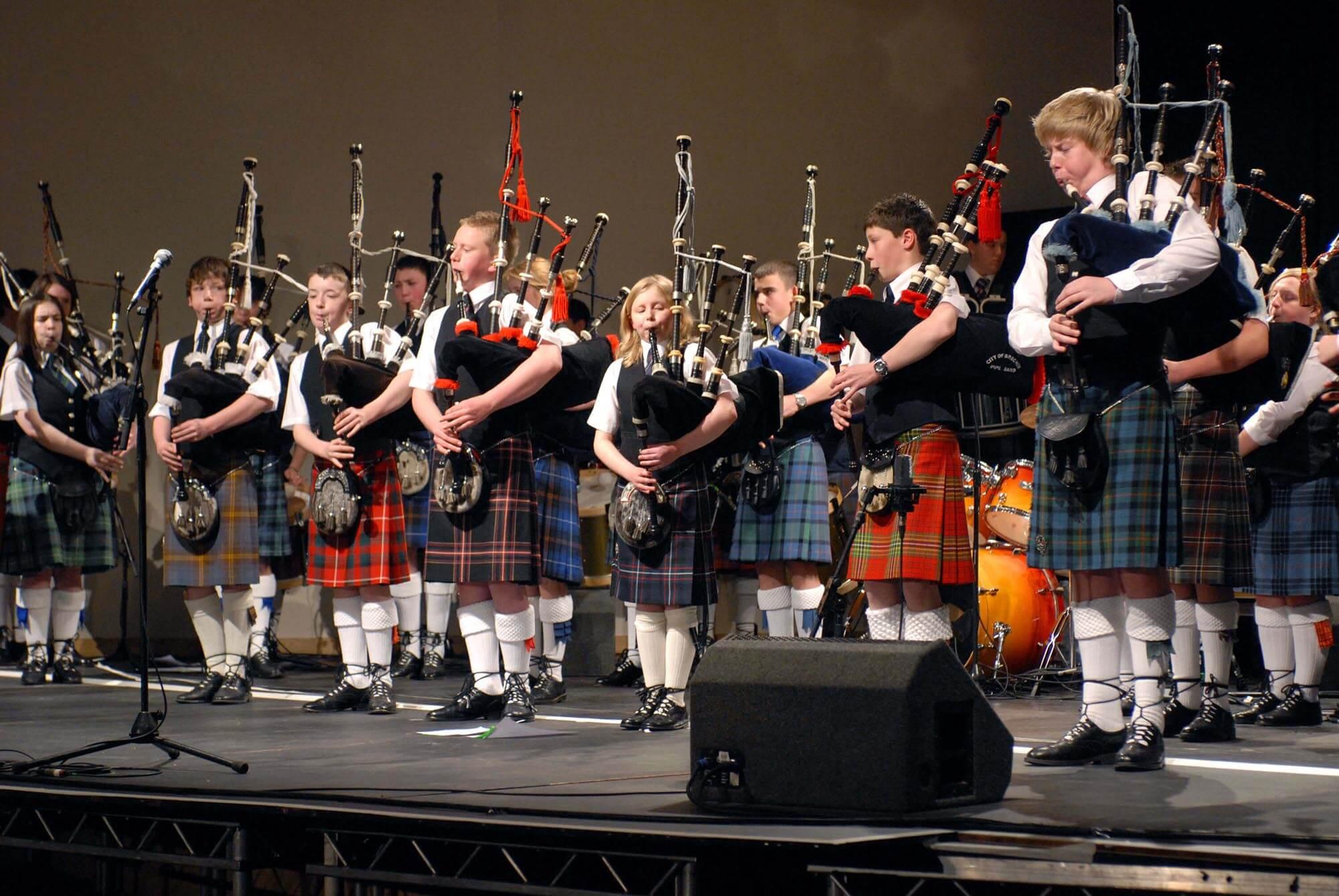
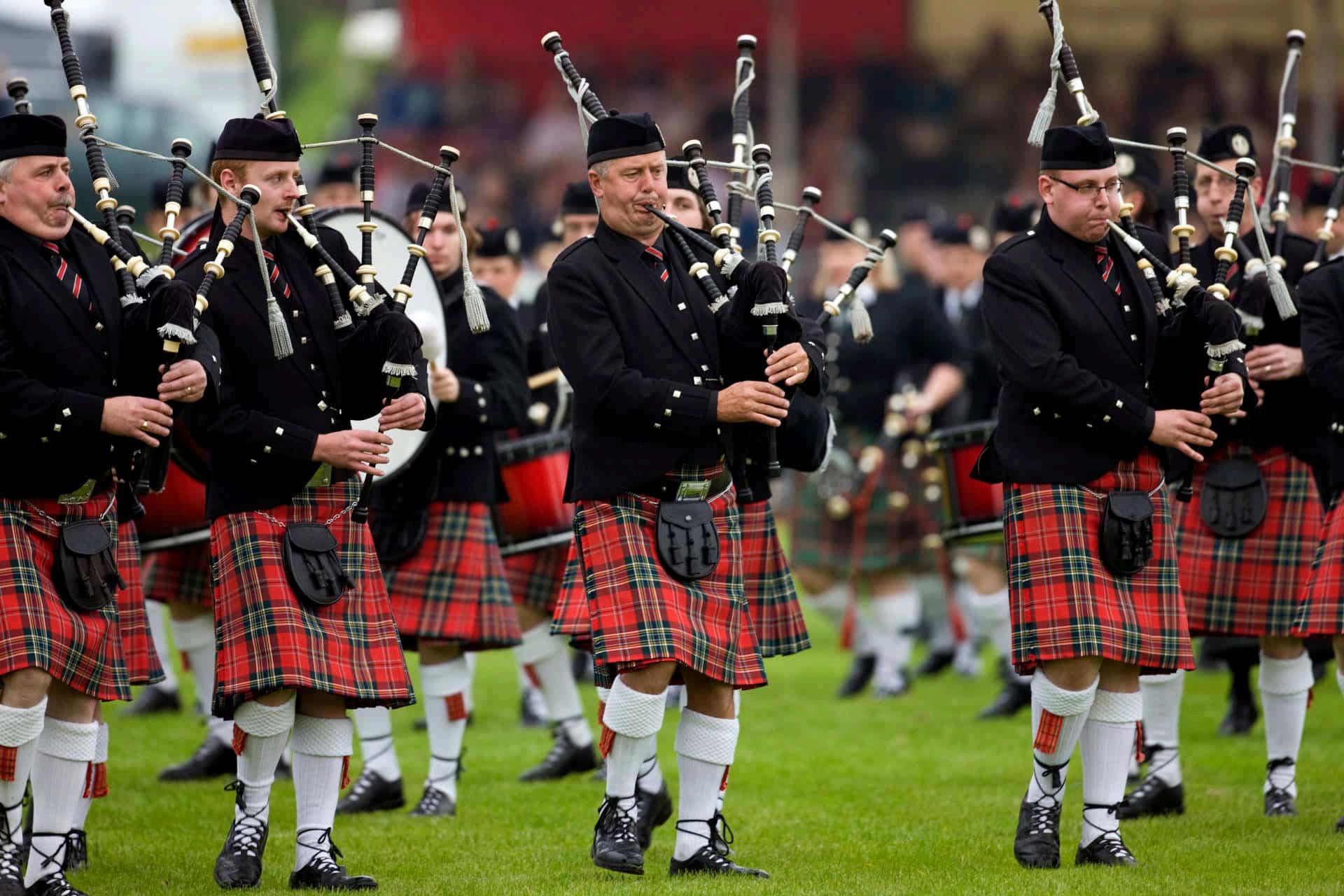
Every time they started playing a more lively tune, the crowd began dancing! Even Justin and I joined the horo! Vicky showed us the steps and we picked up the rhythm quite quickly!
The last participant was a boy from Sweden. He told us that his father was Ukrainian. During one of their visits to Scotland, his father bought him a bagpipe. The boy taught himself to play by simply listening to folk music!
To be honest, I didn’t expect that but WE ALL HAD SO MUCH FUN! :)
Model:
The bagpipe competition was exciting.
1. All the participants were wearing … .
2. Every time the tune became more lively, the crowd … .

3. … joined the horo circle.
4. … picked up the rhythm quickly.
5. The Swedish boy taught himself … .
Listen to the tunes. Then answer the questions.
• Can you recognise the Irish bagpipe?
• Can you guess what the other bagpipe is?


TheIrishandtheScottishbagpipeslookandsoundverydifferent. TheScottishbagpipeproducesamoresolemnsound.Youcanhearit at official ceremoniesandcelebrations.
TheIrishbagpipeissofterandmoremelodious.Itisusuallyplayedsolo.
1. Quite and very
Look at the pictures and read the examples. Which word is stronger: quite or very ?

Say sentences about the pictures. hot tired expensive cold tall

cold. It’s quite cold. It’s very cold.

2. As … as / not as … as Look at the pictures and read the examples. Then answer the questions.
Vicky is as tall as Gabi is as tall as Vicky.
Model:
Model:
What does as … as mean? What does not as … as mean?
Now check with the rules.
Vicky is not as tall as Boris. (= Boris is taller than Vicky.)
Complete the sentences in your notebook. Use as ... as and the adjectives in bold.
Vicky (13), Boris (13) old Vicky is as old as Boris.
1. trainers (£150), hiking boots (£150) expensive These trainers are … the hiking boots.

2. Sam (1.8 m), Ben (1.8 m) tall Sam is … Ben.
3. December (-10°C), February (-10°C) cold December is … February

4. Vicky (45 kg), Gabi (45 kg) heavy Vicky is … Gabi
Say it in another way. Use not as … as.
My sister is lazier than me. I’m not as lazy as my sister.
1. I’m more patient than my friend.



2. I think rafting is more exciting than kayaking.
3. I think snowboarding is more dangerous than skateboarding.
4. Airplanes are faster than helicopters.
5. Running is more exhausting than walking.
We use as + adjective + as to say that two people or things are the same in some way. We use not as + adjective + as to say that two people or things are different in some way.

He is as tall as me. = He is the same height I am.
Read and compare the examples.
Justin didn’t know how to dance horo. Alice taught him.
The Swedish boy taught himself to play the bagpipe.
Now read the reflexive pronouns and answer the questions. myselfourselves yourselfyourselves himself herself itself themselves
When do we add -self ? When do we add -selves ?
Now check with the rules.
We add -self in the singular. We add -selves in the plural.
IMPORTANT! The stress is on self /selves : /maɪˈself/, /ðəmˈselvz/.
Say the correct reflexive pronoun in each sentence.
1. The salad is delicious! Did you make it …?
2. Listen to this story. John wrote it … .
3. I’m trying to teach … to play the piano.
4. Sara painted this picture … .
Festivals and celebrations




Work in groups of four. Choose a festival or a celebration. What do people do then? What do they eat? Make two word webs. The pictures below can help you.
Now read the words below. Are they in your webs?
•dance
•sing
•play music
•decorate
•give/receive gifts

•send a greeting card

•wear a special costume
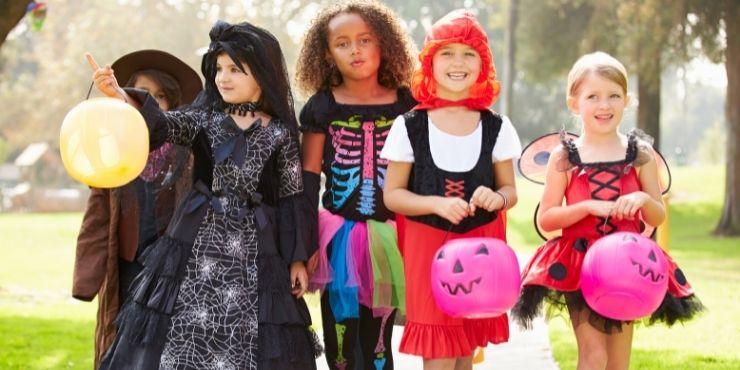
•prepare/cook/have a special meal

•invite guests
Model:
Try the cake. I made it myself
5. Stop shouting, children! Control …!

6. Alice and Justin enjoyed … at the festival.
7. This kitten is so small! It can’t feed … .
In your notebook, match the phrases with the pictures.
a. make a bonfire

b. watch fireworks

c. put up decorations
d. make a wish
e. pull a cracker
f. throw a party
g. light candles

Say the correct phrases from to complete the sentences. Sometimes you need the plural!
1. The Wilsons always … at the Christmas dinner table.
2. A: Mummy, can you … on the cake?
B: Yes, darling, now close your eyes and …!
3. In my family we … a month before Christmas.
4. We’re going to … for my brother’s birthday. It’ll be a surprise.
5. November 5th is Bonfire Night in the UK. Some people … in their gardens. All over Britain, people … .
Guy Fawkes Day, Bonfire Night or Fireworks Night is celebrated on November 5th in the UK. People light fires outside, often with a pile of old furniture, and have fireworks.

Read and listen to the dialogue. Then practise in pairs.
Alice:
Vicky: Alice:
Vicky: Alice: Vicky: Alice:
Vicky: Alice:


Hey, Vicky. It’s grandpa’s birthday tomorrow. Yes, I know. He’s turning 65. Justin and I’ve got an idea. Let’s throw a party in the garden. It’ll be a surprise.
Great! What are we going to do?
Mum and Aunt Dora are going to put up decorations.
Dad and Uncle Peter are going to grill some meat. Boris is going to be the DJ What am I going to do?
You and I are going to help grandma make the cake. At the end of the party we’re going to have fireworks.
Sounds perfect! Wait! What is Justin going to do? Well, he’s going to make a bonfire and he’s going to eat as much as possible, of course!
grandma she 60 back yard make the cake/ prepare a special meal make a bonfire/light candles/ play the guitar/sing songs
grandpa put up decorations be the DJ
Now make a similar dialogue. Replace the words and phrases in bold with the suggestions on the right and your own ideas.
Work in pairs. Make a dialogue. Imagine you are planning a surprise party for a friend. Make a list of the things you are going to do. Decide who is going to do them. Use the dialogue in as a model. 16

Read and listen to the dialogues. Then practise in pairs.
1.A: Hello.

B: Hello, Lilly! Happy birthday to you!
A: Thank you so much.
B: You’re welcome.
A: I’m having a party tomorrow.You’re invited.
B: Thanks. I’ll be there.
A: See you tomorrow!

B: Bye!
2. A: Happy birthday, grandpa!
B: Oh dear, thank you so much!
A: You’re the best grandpa in the world!
B: Thank you, dear!
Work in pairs. Make similar dialogues. Replace the words in bold with your own ideas.

My favourite family celebration
Read David’s description of a traditional family gathering and answer the question.

• When do David’s family gather together?
My favourite family celebration
My favourite family celebration is my town’s festival. At noon, all my family gather at my grandparents’ house. My grandmother always prepares a special meal for dinner. After that we go to the town square. There is live music and dancing. We meet relatives and neighbours there. We dance and sing and chat. In the evening, we watch the fireworks. It is great fun!
Write a description of a traditional gathering of your family. Follow the model above.

The sound ɒ



Listen and repeat.
hop top stop shop
Now say these words. Then listen and check. dot got hot lot
Grammar: can , could , be able to ; too and enough
Functions: talking about abilities and possibilities; inviting a friend; congratulating people; making arrangements; making an excuse





Vocabulary: hobbies and interests
Pronunciation: the sound /əʊ/
Answer the questions. Read the words for hobbies and interests.
What are you interested in?
What are you NOT interested in?
music
tennis
cooking swimming tv
birdwatching languages photos
fishing
proud (of) perform (v.) Congratulations! a stage a novel a performance
4
Shhhh! The actors are on stage now!
reading chess
painting
I’m very proud of you!
football
puzzles
singing clothes animals shopping
Look at the pictures. Read the sentences and try to guess the meaning of the words in bold. Listen and repeat.
Congratulations!
I’m going to perform my own music.
Yes! Amazing!
6 It was a great performance!
I’m reading ‘The Prince and the Pauper’. It’s a famous novel by Mark Twain.

Mark Twain is the pen name of Samuel Langhorne Clemens (1835–1910). He was a famous American writer and journalist.

Listen and answer the question.
• What are Vicky and Gabi talking about?
a. A famous novel.
b. A musical performance.
c. A theatrical performance.
Listen again and choose the correct answer.
1. … invites the others to go to the theatre.
a. Gabi b. Vicky
2. Gabi is going to … ‘The Prince and the Pauper’.


a. watch b. play in
3. Gabi is sure that Alice and Justin
a. know the story
4. The invitation is
b. don’t know the story
a. in English. b. in Ukrainian.
5. Vicky … how to get to the theatre.

a. knows
Invite friends
Why don’t you come …?
b. doesn’t know
Now read Gabi’s invitation and answer the questions.
1. Where is the performance?
2. What time does it start?
You are invited to The Drama Club production of
a play by John Shelton based on the novel by Mark Twain
Starring: Gabi Valchuk and Peter Crystal
Saturday 7:00 pm
The Globus Theatre
Why don’t you join me/us?
I’m throwing a party tomorrow. You’re invited.
Read Gabi’s email and find the correct map.
To: vicky_a21@abv.bg
Cc: Boris@, Alice@, Justin@ Hi guys,
This is how to get to the theatre from your home.
1. Take bus route 6 to the city centre.
2. Get off at the fourth stop.
3. Cross the street and turn left.
4.
5.
Walk about 200 metres. Then turn right into Regent Street. The theatre is the second building on the right.
Don’t get lost :) Gabi
Listen to part of another conversation and answer the question.
•Why isn’t Gabi going on tour next week?
Now read the whole conversation. Then read the summary of the situation. Find three mistakes in it.
Copy the summary into your notebook and correct the mistakes.
Alice: Gabi:
Alice:
Boris:
Gabi: Alice: Gabi:
Vicky:
Alice:
Justin:
Congrats, Gabi! You were fantastic! Thanks, Alice! I’m so happy you liked the play. I couldn’t understand the words but I liked your acting.

The other actors were very good, too. Are you the youngest of all?
Yes, I am. The others are going on tour next week but I’m too young to travel with them.
What a pity! When will you be able to go on tour?
Next year. I’ll be old enough then.
Gabi, you’re brill! So talented! I’m sure you’ll be a star some day! And maybe you’ll perform in London. What do you think, Justin?
It was a great performance… but which part did Gabi play?
Alice, Vicky and Boris: Justiiiiiin, she was the Prince!
On Saturday evening, Vicky, Alice and Justin went to the theatre. Vicky’s friend, Gabi, was one of the actors. Alice could understand the words and she liked Gabi’s acting a lot. Boris liked the other actors, too. Gabi was one of the oldest actors. Justin couldn’t recognise Gabi because she played a male part.
Listen and check.
W O R D B O X
brill = brilliant
Congratulations!
You were fantastic! Well done!
Congrats! = Congratulations! theatre (BrE) = theater (AmE)

recognise (BrE) = recognize (AmE)
1. Can, could and be able to
PRESENT PAST FUTURE
Positive You can help me.You could help me.You will be able to help me.
Negative You can’t help me.You couldn’t help me. You won’t be able to help me.
Question Can you help me? Could you help me? Will you be able to help me?
Read and compare the examples.
1. Can you come to the theatre with me?
2. Will they be able to understand me?
3. Alice couldn’t understand most of the words.
Now match with the rules.
We use can to talk about a present ability or possibility. We use could to talk about a past ability or possibility. We use be able to to talk about a future ability or possibility.
Change the sentences into the past tense. Be careful – some sentences are positive, some are not!
He can’t understand the grammar rule. He couldn’t understand the grammar rule.
1. I … ride a motorbike when I’m sixteen. Dad’s going to teach me.
2. We … go to the performance next week because we’re having a family gathering.
3. Anna was sick last week and she … take part in the dance performance.
4. Next summer, we … spend more time camping in the mountains.
1. My sister can play the guitar. … when she was seven.
2. I can’t visit my grandparents today. … yesterday because I was very busy.
3. Can you dance horo? … when you were eight?

4. Maria can sing very well. … when she was little.
5. I can’t go to the theatre. … last night because I didn’t feel well.
Change the sentences into the future tense. Be careful – some sentences are positive, some are not!
Model:
He can’t understand the grammar rule. He won’t be able to understand the grammar rule.
1. I can’t come to your party. … on Saturday. My cousins are visiting us.
2. Alex can’t pass the test. … next week. He’s not studying hard enough.
3. Alice can’t speak Ukrainian. But … next year. She wants to learn it.
4. They can’t drive. … next August. They won’t be 18.
5. Jane can’t walk on her hands. But … next month. She’s practising a lot. Say the correct form of can or be able to : positive or negative, past or future.
Model:
My grandmother could speak five languages when she was 30.
5. I was really tired last night and I … finish ‘The Prince and the Pauper’.
Read the examples. Match the phrases in bold with their meaning.
1. The shoe is too small for her.
2. The shoe is big enough for her.
3. I’m too young to drive.
4. My sister is 18. She’s old enough to drive.
a.as big as necessary
b.not as big as necessary
c.as old as necessary
d.not as old as necessary
Say the correct phrase to complete each sentence.
What a terrible noise!
Model:
Model: Jordan Romero
It’s too loud / loud enough! It’s too loud!

1. I can’t see anything in this room! It’s dark enough / too dark.
2. Put on your jacket. It isn’t too warm / warm enough
3. You can’t swim in this pool. It isn’t too deep / deep enough.
4. I can’t eat this soup. It’s too hot / hot enough
5. Can I have some more honey, please? My tea isn’t too sweet / sweet enough
6. Don’t buy this T-shirt. It isn’t too large / large enough
7. I can’t buy this computer game. It’s expensive enough / too expensive



8. I don’t want to go out. It’s cold enough / too cold.
Say it in another way. Follow the model.
This room is too small for the party. (large) This room isn’t large enough for the party.
1. Sam is too young to watch horror films. (old)
2. The kid is too short to reach the cupboard. (tall)
3. My sister is too impatient! (patient)
4. Jerry can’t make friends easily. He’s too shy. (communicative)
5. Can you read this note for me? The letters are too small. (big)



IMPORTANT! too small = not big enough too young = not old enough

Work in groups of four. Answer the questions below. Then report to the class.
•Have you got any free time on weekdays? What do you do then?

•Have you got any free time at weekends? What do you do then?

•What do you like doing during the school holidays?
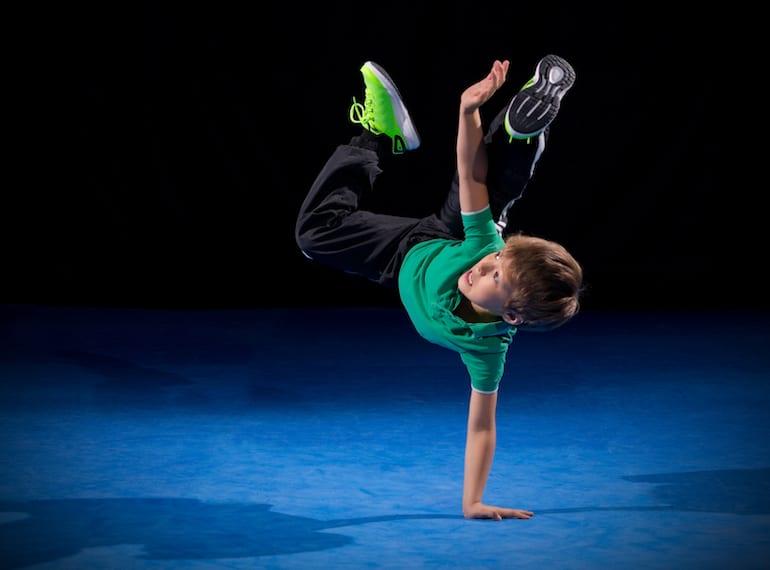



Read the words and phrases below and match them with the pictures.
a. drawing
b. collecting things
c. dancing
d. playing board games
e. doing puzzles
f. baking
g. acting
h. singing in a choir
i. playing ball games
j. keeping a pet
k. playing a musical instrument

l. playing adventure games
Listen, check and repeat.
Work in pairs. In your notebook, make two word webs with the words and phrases from 15. Add your own ideas.
Are you into any of these hobbies and interests?
Listen to four teenagers talk about their hobbies. Tick the activities they talk about in your word webs.
Making arrangements
Make an excuse
I’m sorry, I won’t be able to come.
I’m very sorry. I’ll be busy at this time.
Read and listen to the dialogue. Then practise in pairs.
Vicky: Peter: Vicky: Peter: Vicky: Peter:
Dad, can we go to the theatre tomorrow?
The Drama Club is performing ‘The Prince and the Pauper’. Gabi will be on stage. Of course you can. What time does it start?
7:00 pm.
I’m sorry, I won’t be able to give you a lift.
I’ve got a meeting.
Don’t worry. We’ll take the bus. Gabi sent us a map with instructions.
OK. Let’s check the timetable online. Oh, yes. You can take the 6:15 bus. But wait. There are usually traffic jams around 6:00 pm.
All my friends will be there. 6:00 pm
I’ll be busy at this time. We know the way.
Vicky: Peter: Vicky:


We’ll take the 6:03 bus then.
I’ll pick you up after the performance.
That’s great! Thanks, Dad!
5:00 pm
film
Now make a similar dialogue. Replace the words and phrases in bold with the suggestions on the right and your own ideas. The timetable below will help you.
Bus
route
14:2115:3316:2617:1518:1519:1620:18







14:3915:5116:3917:2718:2719:2920:32
14:5716:5117:3918:3919:4220:56
17:5118:5119:54
Work in pairs. Choose a role card and make a dialogue. Then change roles and make another dialogue. You can use the dialogue in 18 as a model.
WRITING My hobby

• Where does Justin go every Thursday after school?
My hobby is cooking. I go to cookery classes every Thursday after school. A chef teaches us how to cook. We make yummy dishes like pizza, pasta, fish pie and carrot cake. At the end of the class, we eat all the food. On Sundays, I help Mum with the dinner. My family is very happy with my hobby!
Write about your hobby. Follow the model in . If you prefer, write about Clara’s hobby.


You are the child. You want to go to a birthday party. Ask your mum/ dad if you can go to the party.



PRONUNCIATION
20 1 3 2 4 19 22 20 21 Проєкт майбутньогопідручникаВидавництво «Ранок»
tone bone stone alone
Grammar: would (like) ; indefinite pronouns; countable and uncountable nouns; concrete and abstract nouns; a bit/a number of Functions: ordering food and drinks; making polite requests and offers
Vocabulary: restaurant food


Pronunciation: the sound /ʌ/
Answer the questions.
Do you like going to restaurants?
What’s your favourite dish?
What’s your favourite drink?
1. Are you ready to order?
2. My family eat out every Sunday.

Listen and repeat.
Listen and answer the question.
• Where are the families going to have dinner?


Look at the pictures. Read the sentences and try to guess the meaning of the words and phrases in bold.
order (v.) eat out (v.) garlic trout
I’m starving. spinach
3. Do you like garlic?

4. Yesterday I caught this big trout but then I let it go.

5. Mum, where’s dinner? I’m starving.
6. My grandma grows spinach in her garden.

Listen again and answer the question: Who says these sentences?
Model:
Is there anybody home? Justin
1. I’m starving!
2. We’re eating out tonight.
3. Can you survive till then?
4. I’ll try
5. I think I can eat ten kebapche!
6. Hey, Alice, you’re ready to order in Ukrainian!
Read the menu and try to guess the meaning of the words in BLOCK CAPITALS.
Spinach
MAIN
Grilled
Grilled
Listen to part of another conversation and complete the sentences.
1. Vicky orders the same as …
2. Boris orders the same as …
Now read the whole conversation and answer the questions below.
Waiter: Good evening.
John: Good evening. We’ve got a reservation for eight people.
Waiter: Follow me, please. … Here’s the menu. I’ll be back shortly to take your orders. ***
Waiter: Are you ready to order?
Alice: Yes, I’ll have the spinach balls and garlic bread, please.
Vicky: The same for me, please.
Justin:
Boris:
I'll have a grilled salmon and a potato salad, please.
I’d like the same, please.
Waiter: And for you, madam?
Anna: I’ll take the grilled trout and a mixed leaf salad, please.
Dora: I’d like the wild mushroom pasta, please.
Peter: A pork steak with mashed potatoes for me, please.


chips (BrE) = (French) fries (AmE)

a beverage = a drink
a smoothie = a drink madefrom fruit, milk or cream, and icecream
Waiter: And for you, sir?
John: What can you recommend?
Waiter: Try the beef sausage. It’s homemade.
John: I’d like to try it.
Waiter: Anything else?
John: Yes. A tomato salad and a small portion of chips, please.
Waiter: Would you like something to drink?

Dora: Yes, please. Fruit juice for the kids and for the adults …
1. Have the families got a reservation?
2. Who orders fish?

3. Which main course does Dora order?
4. What does the waiter recommend?
5. What will the kids drink?
1. Would (like)
Study the examples and match them with the rules.
1. I’d like (would like) some tea.
2.A: Would you like some tea?
B: Yes, please./No, thank you.
a.We use would like or ’d like to make polite requests.
b.We use would you like...? to make polite offers.
Model:
IMPORTANT!
When we accept an offer, we say Yes, please . When we refuse, we say No, thank you
Read the sentences and say O (offer) or R (request) for each sentence. What would you like to eat? O (offer)

1. I’d like some fruit, please.

2. Would you like another glass of water?
3. I’d like the chicken soup, please.
4. Would you like a dessert?
5. I’d like a pancake with chocolate, please.
6. Would you like anything else?


somethingsomebodysomeone
anythinganybodyanyone
nothingnobodyno one
everythingeverybodyeveryone
Study the examples and answer the questions.
There’s somebody/someone at the door. I don’t want anything to eat. I’m full. Did anybody/anyone help you? Nobody helped me. Her name is Dorothy but everyone/everybody calls her Dotty. We ate up all the food. Everything was so delicious!
IMPORTANT!
We use a singular verb after an indefinite pronoun.
What pronouns do we use for people? Which pronoun means ‘all the people’?
What pronouns do we use for things? Which pronoun means ‘all the things’? What kind of verb do we use with nobody/nothing – a positive or a negative one?
Проєкт
Now check with the rules.
In your notebook, complete the sentences with somebody , anybody , something , anything , everybody or everything .
Model:
Granny is cooking something delicious for dinner.
1. Come to the table, …! Dinner’s ready.
2. Has … got an umbrella? I can’t find mine.
3.A: I don’t know … about healthy eating.
B: Don’t worry. I’ll tell you … you need to know.
4. Would you like … to drink?
5. We haven’t got … to eat at home. Shall we go to a restaurant?
6. … broke into the house while we were eating out last night.
7. … knows the story of ‘The Prince and the Pauper’. It’s very popular.
Do you remember?
We use something in polite offers and requests:



Would you like something to drink? Can I have something to drink?
3.Countable and uncountable nouns
Read the rule below.
Nouns can be: countable (a burger – burgers, a mushroom – mushrooms) and uncountable (rice, spinach, garlic). concrete (bread, butter) and abstract (music, information, idea).
Now read the dialogue and find examples of countable and uncountable, concrete and abstract nouns.
A: Let’s eat out tonight.
B: That’s a great idea. I’ll have a burger and some chips.
A: I’ll have pasta and a dessert.
Some nouns are both countable and uncountable .
I like salad. Two tomato salads , please.
We can make a lot of uncountable nouns countable by adding a piece of, a slice of, a glass of, etc.
I’m thirsty. I’ll have a glass of water
Can I have two pieces of this cake, please?
Listen, point and repeat.
a packet of sugara piece of cakea slice of breada bowl of soup





a cup of teaa carton of juicea glass of milka bottle of water
Say the correct phrase for each picture. Be careful – some phrases are in the plural!
1. I’d like two, please.
2. A: Would you like some dessert?

B: Yes. , please.
3. Grandpa takes three in his tea.
4. I’m not very hungry. I’ll have.
4. A bit of and a number of Study the examples and match them with the rules below.
1. Do you need a bit of help with the menu? (= some help)
2. A number of people are waiting for the bus. (= several)
We use a bit of and a number of to talk about quantities.
a.We use a bit of in informal speech with uncountable nouns.
b.We use a number of with plural countable nouns. The verb is plural.

5. Mum always has for breakfast and Dad has.
6. After the race, John drank two.
7. There are three in the fridge.
Say a bit of and a number of to complete the sentences.
Model:
A number of students were ill at the holiday camp.
1. Everyone needs … help sometimes.
2. There were … people in front of the theatre.
3. Would you like … cream in your coffee?
4. … children in Ukraine have got family members abroad.
5. With … luck, we’ll find a table in this café
Restaurant food
Work in small groups. What words for food and drinks do you know? Make a list.
Read the menu. Try to guess the meaning of the words in bold. Then look up the words in the Wordlist at the end of your Student’s Book.
Shrimp salad
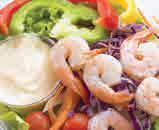
Garlic mushrooms
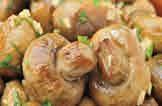
Pumpkin and carrot soup
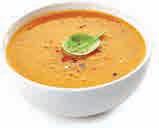
Listen, point and repeat.
Bangers and mash
Sausages, mashed potatoes and baked beans
Shepherd’s pie
Small pieces of lamb and mashed potatoes

Roast beef
Served with green peas, carrots, roast potatoes and Yorkshire pudding



Apple crumble with ice cream

Toffee pudding

Sliced turkey breast
Served with cranberry sauce
Scones with strawberry jam
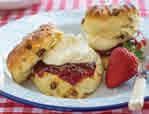
Read the menu again. In your notebook, write examples of:
a. One meat product
b. One type of seafood
d. Three types of vegetables

e. Three types of fruit
c. Two types of meat 8989
Read the dialogue in pairs. Say the correct word for each picture.
Waitress: Hello. Are you ready to order?
Customer: Yes, I’d like a to start with.
Waitress: And for your main course?
Customer: I’ll take the , please. Can I have it without cranberry sauce?
Waitress: Sure. Would you like a dessert?
Customer: Yes, I’d like some , please.
Waitress: That’s a good choice. And what would you like to drink?
Customer: A glass of mineral water, please.
Waitress: Still or sparkling?

Customer: Sparkling, please.
Waitress: Is there anything else?
Customer: No, thank you.
Listen and check. Make
Order a meal
I’d like … as a starter/to start with.






I’ll have/take … for main course.
Ordering food and drinks
Read and listen to the dialogue. Then practise in pairs.
Fruit Juices £3
CITRUS MIX
Orange, Grapefruit, Lemon
HAPPY BERRY
Strawberry, Cranberry, Pear
FEEL GOOD
Watermelon, Mango, Apple
Sandwiches £4
Chicken & Avocado
Cheddar & Tomato
Tuna & Lettuce
Ham & Egg
Baguettes £5
Ham & Cheese
Tuna & Cucumber
Roast Beef
Turkey & Avocado
Hot Drinks £2

Tea
Coffee Cappuccino
Hot chocolate
Barista: Good morning. How can I help you?
Customer: I’d like a Tuna & Cucumber Baguette, please.

Barista: Anything to drink?
Customer: A Happy Berry, please.
Barista: Is that all?
Customer: Yes. How much is that?
Barista: That’s eight pounds, please.
Customer: Here you are.
Barista: Thank you. Enjoy your meal!
Customer: Thanks a lot.
Now make a similar dialogue. Replace the phrases in bold with other options from the menu on p. 90.


Work in pairs. Choose a role card and make a dialogue. Then change roles and make another dialogue. You can use the dialogues in and as models.
Student A:
You are a barista in a coffee bar. Serve your customer.
Student B:
You are a customer in a coffee bar. Order some food and a drink.
Student A:



You are a customer at a restaurant. Order some food and a drink.
Student B:
You are a waiter/waitress at a restaurant. Serve your customer.
barista = a person who serves customers in a coffee bar
My family’s eating habits
Read about Dorothy’s family and answer the question.
• What do Dorothy’s family sometimes do at weekends?
On weekdays, everybody is busy but normally we eat dinner together. We usually have pasta, soup or stew. At weekends, we sometimes eat out. We like going to Italian restaurants. My sister and I love pizza. Mum often orders a salad and pasta. Dad usually has a beef steak and garlic potatoes. We always have Italian ice cream for dessert. It’s yummy!
Write about your family’s eating habits. Follow the model above.


The sound ʌ
Listen and repeat. but cut hut nut
Now say these words. Then listen and check.
bus duck luck stuck
Listen to the conversation and write the correct answers in your notebook.
Listen again and check your answers.
The boy apologises to the girl for not going to her birthday.
b. for forgetting her birthday.
2. The boy … the photo to the girl.
a. is sending

b. is showing
3. The girl thinks ... funny.
a. the band is
b. the hats are
4. The girl thinks the man’s hair is
a. colourful.
b. cool.
5. The boy thinks … go crazy at the carnival.

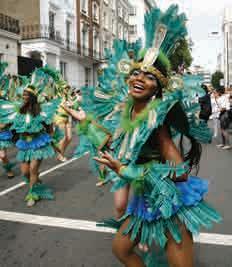



a. all the people
b. some people
Read the article and write the correct answers in your notebook.



Jamie Oliver is a British chef. He is famous for his TV shows and cookery books. He has got a lot of restaurants around the world. People prefer his restaurants because they can eat healthy and delicious food there.

Jamie is rich and famous but what makes him special is his mission. He says: ‘I work hard to save lives in my own way. I’m not a doctor; I’m a chef.’ Jamie is passionate about sharing his ideas for healthy meals and easy recipes.
With the project Jamie’s School Dinners , Oliver wants to change school lunches. Instead of junk food in school canteens, Jamie tries to introduce delicious and healthy meals. Unfortunately, this is very hard.
Jamie’s Ministry of Food project teaches people how to cook. They go to courses where they learn how to prepare homemade food.
Work in pairs. Choose a role card and make a dialogue. Change roles.

Talk with Student B about his/her favourite celebration. Ask about:
• the activities people do;
• the presents;
• the food and drinks.
1. Jamie Oliver is a famous British
a. cook.
b. doctor.
2. People go to Oliver’s restaurants because
a. they offer cheap food.
b. they offer healthy food.
3. Jamie … about teaching people how to cook healthy food.
a. is enthusiastic
b. isn’t enthusiastic
4. According to the article, British children eat … at school.
a. junk food
b. healthy food
5. People join the Ministry of Food project
a. to learn to cook.
b. to become chefs.
6. The article is about
a. Jamie Oliver and his restaurants.
b. Jamie Oliver and his mission. 6 p.
Talk with Student A about your favourite celebration. Answer Student A’s questions.
Go to page 22 in Workbook 2 to do the Grammar and Vocabulary sections.


talk about festivals and celebrations. give birthday greetings. agree. talk about hobbies and interests. invite a friend.
Now I can:


compare people and things. use can/could and be able to . use indefinite pronouns.
make an excuse. congratulate people. talk about abilities and possibilities. order food and drinks. make polite requests and offers.
use reflexive pronouns. use too and enough . use quite and very


Grammar: cardinal and ordinal numbers; and , or , but , so

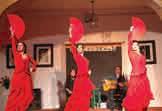
Functions: agreeing and disagreeing; asking and answering about countries

Vocabulary: continents; countries and nationalities

Pronunciation: the sound /juː/
Answer the question.
What do you imagine when you hear the names of these countries:
Еgypt Spain Italy Brazil China



1 2
Look at the pictures. Read the sentences and try to guess the meaning of the words in bold.
a stall

a fair an exhibition


a bank
Listen and repeat.
Look at the compass. Read and translate the cardinal points.



Listen, point and repeat.
Now study the map and answer the questions.
1. How many stalls can you see?
2. What else is there at the fair?
3. Where is the stage?






4. Where is the café?
read a map = understand what a map shows study a map = look carefully at a map
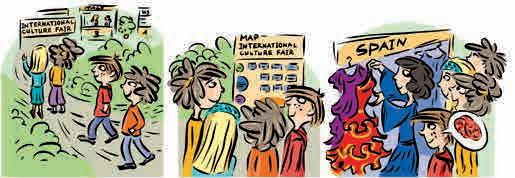
Listen and answer the question.
• Which places on the map above don’t the children mention?
chorizo /tʃəˈriːzəʊ/ = a type of pork sausage from Spain or Latin America
flamenco /fləˈmeŋkəʊ/ = a style of Spanish music, singing and dancing
Model:
Listen again and say true or false. Correct the false sentences.
Vicky, Boris, Alice and Justin are walking in the street. False. They are walking in the park.
1. The International Culture Fair wasn’t in the park last week.
2. Boris can hear some music.
3. They stop at the Chinese stall.
4. The woman shows two dresses to the girls.
5. The flamenco lesson costs 5 pounds.
6. Justin wants a free chorizo sandwich.
Do the Culture Quiz! Look at the pictures. In your notebook, match the pictures with the places of interest.
• Residence of Bukovinian and Dalmatian Metropolitans

Now listen, check and repeat.
Listen to the text. Then say the correct place of interest from to complete each sentence.
7
1. … is in southwestern England.
2. … is one of the largest structures on Earth.


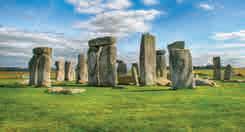
3. … is an amphitheatre in Rome.

4. … are on the west bank of the Nile River.

5. … are in Peru.
6. … is a monument in south-western Ukraine
Read the first part of the text. In your notebook, correct the mistake in each of the sentences below.
Stonehenge /ˌstəʊnˈhendʒ/ is a circle of giant stones near Salisbury /ˈsɔːlzbəri/ in southwestern England. Work began around 3000 BCE. Nobody knows exactly why people built Stonehenge but they probably gathered there for religious ceremonies.
The Great Wall of China is one of the largest structures on Earth. It took two thousand years to build the wall. The best-preserved part of the wall is about 8,850 km long.
The Colosseum /ˌkɒləˈsiːəm/ is a giant amphitheatre in Rome. It was built between 70 CE and 82 CE. It seated 50,000 spectators. The Colosseum was the scene of thousands of combats between gladiators and contests between men and animals.

1. Stonehenge is a giant stone near Salisbury.


2. The Great Wall of China is about 8,850 km long.
3. The Colosseum seated 500,000 people.
Now read the second part of the text. In your notebook, complete the sentences below.
The Pyramids of Giza /ˈgiːzə/ stand on the west bank of the Nile River in Egypt. The oldest pyramid was built for Cheops /ˈkiːɒps/, the second king of the 4th dynasty. It is also the largest pyramid so it is called the Great Pyramid.
The Nazca /ˈnæzkɑː/ Lines are large line drawings created on the surface of the Earth in southern Peru. They include mainly plants, animals and various geometric shapes. The Nazca civilisation created the lines more than 2000 years ago.
The Residence of Bukovinian and Dalmatian Metropolitans is actually a university campus in Chernivtsi but it looks like a Middle Ages castle. In winter, it looks like a snowy kingdom that attracts you with its splendour and mystery.
1. The largest pyramid is called … .






2. The Nazca Lines include mainly … .


3. The Residence of Bukovinian and Dalmatian Metropolitans looks like ... .

1.Cardinal and ordinal numbers
We usually say the in front of ordinal numbers. With numbers of four or more digits, we use a comma after every third digit from right to left.
A cardinal number says the amount or how many of something there is, such as one horse or two, three, four, five etc. horses in a race, or songs on a playlist. An ordinal number tells the position of something in a list, such as 1st , 2nd , 3rd , 4th , 5th , etc.

Work in pairs. Say cardinal and ordinal numbers.
Model:
A: One. B: First.
Look at the picture of the skyscraper. Practise the dialogues in pairs. Then make your own dialogues.
1. At the reception desk
A: Excuse me, where’s the Italian café?
B: On the third floor. The lifts are on the left.
2. Imagine you are staying at the hotel or you have got an office in this building.
A: Where’s our hotel room?
B: On the 22nd floor.
A: Amazing!
A: Where’s your office?
B: On the 9th floor.
A: Great!
Study the examples and answer the question.
1. We went on a school trip to Chernivtsi and we saw the University campus.
2. You can stay at the hotel or you can go sightseeing.
3. I’m very tired but I can’t miss the visit to the Colosseum.
4. The Great Wall of China is very long so we only walked a small part of it.
Why do we use words like and , or , but and so ?
Now match with the rules.
Words like and , or , but and so join two parts of sentences.
a.We use and to add information.
b.We use or to give alternatives.
c.We use but to give different information.
d.We use so to give result.
In your notebook, join the two parts of the sentences.
Vicky and Alice tried the dresses on You can see the pyramids
We didn’t want to queue for tickets There were too many people in front of the museum The Great Wall consists of a number of walls It was raining yesterday You can order some Chinese food
Now listen and check.


Look at the map. Find the continents. Listen, point and repeat.
and but so or
they had a free flamenco lesson. you can’t go in. we bought them online. we couldn’t get in. it is very long. they didn’t go sightseeing. you can try the sandwiches.
Work in pairs. Point and say the name of the continent.
Now answer the questions.
•Which is the largest continent?
•Which is the smallest continent?


•Where is the UK?
•Where is Egypt?
•Where is China?
•Where is Brazil?
•Where is the USA?
A simple sentence has got a subject and a verb and expresses one complete thought. A compound sentence is made up of simple sentences joined by words like and , or , but , so .
Model:
Model:
2.Countries and nationalities
Revise in small groups. What countries and nationalities do you know? Make a list on the board.

Listen, point and repeat.
Asking and answering about countries
Read and listen to the dialogue. Then practise in pairs.
Athens /ˈæθənz/ Brasília /brəˈzɪlɪə/ Paris /ˈpærɪs/ Kyiv /‘kijiv/ Berlin /bɜːˈlɪn/ Beijing /ˌbeɪˈdʒɪŋ/
A: Hi, I’m Pablo.
B: Hi, Pablo. I’m Simeon. Where do you come from?
A: I come from Spain
B: Where do you live in Spain?
Work in pairs. Look at the pictures and try to guess the nationalities.







A: I think they’re Greek.
B: I think so, too.
A: I think they’re Spanish.
B: I don’t think so. I think they’re Greek.
A: Hm. You’re right.

HOW TO Agree
I think so, too. You’re right.
Disagree

I don’t think so.
I’m not sure about that.
Listen and check.
A: I live in Madrid. It’s the capital of Spain. What about you?

B: I’m from Ukraine. I live in Lviv

A: Is it the capital?
B: No, it isn’t. The capital of Ukraine is Kyiv.
Now make a similar dialogue. Replace the words in bold with the capitals in the box and your own ideas.
Work in pairs. Choose a role: Student A or Student B. Read the role cards and make a dialogue. Then change roles and make another dialogue. You can use the dialogue in as a model. Add your own ideas. 19
Student A:

Imagine you are at an international student camp. Choose a role card. You meet Student B for the first time.
Student B:
Imagine you are at an international student camp. You meet Student A for the first time.

Name: Maria Luiza
Age: 14
Country: Brazil

City: Rio de Janeiro
U10
Age: 15 Country: Turkey City: Istanbul
Name: Fenfang
Age: 15 Country: China City: Shanghai

Filling in a form
Name: Michael Age: 17 Country: USA City: New York

Age:16 Country:Ukraine City:Ternopil

Name: Pierre
Age: 14

Country: France


City: Nice
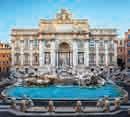
Where are you from? = Where do you come from?
Read Dorothy’s email and answer the questions.
• Where is Dorothy? Where is she staying?
From: dorothy.black@ezbox.co.uk
To: ali.wil21@ezbox.co.uk Tuesday, August 20, 11:09 pm



Ciao Alice, Mum and I arrived in Rome yesterday. We’re here for a week. Our hotel is in the city centre. We checked in and went sightseeing. The Colosseum is absolutely huge!
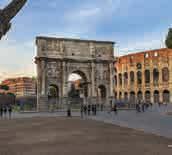
It’s very hot here so we’re eating a lot of gelato (ice cream). Italian gelato is the best in the world!!!
See you in London!
Ciao!
Dotty
Xxxx
Go to p. 29 in Workbook 2. Then read Dotty’s email once again. Fill in the registration form.
The sound juː
Listen and repeat.
dune cute tune
W O R D B O X
ciao /ˈtʃaʊ/
(Italian pronunciation: [ˈtʃaːo]) is used for both ‘hello’ and ‘goodbye’.
Now say these words. Then listen and check. use amuse excuse
101101
Grammar: make and do ; type 0 conditional

Functions: describing jobs; talking about pocket money





Vocabulary: jobs
Pronunciation: falling intonation


Choose the correct answer.
What is pocket money?

a. Money that parents regularly give to their children.
b. Money in your pocket.
What is a Saturday boy?
a. A teenage boy who works on Saturdays.

b. A teenage boy whose birthday is on Saturday.
Now listen and check.
Look at the pictures. Read the sentences and try to guess the meaning of the words and phrases in bold.
The noun money is uncountable. Where is the money?
How much money have you got?
Now answer the questions. Do you get any pocket money? Is it enough for you?
How do you spend your pocket money?
Listen and choose the correct answer.
a. Boris and Justin are looking for a job.
b. Only Justin is looking for a job.
delivering flyers
a sec. = Wait a second. sis (informal) = sister
Where there’s a will, there’s a way is a popular English saying. It means: When you really want to do something, you can do it even if it is very difficult.
Listen again and answer the question: Who says these sentences?
3. I can do a job if my parents let me do it.
4. Guys, are you ready?
5. He’s looking for a job!
OK, just a sec. Justin
1. I want to make money.
2. You’re not old enough to work!
Listen to part of a text and answer the question.
•Can you do paid work if you are 13?
6. Are you serious?

7. Why not?
8. Aha, you want to be a Saturday boy!
9. Where there’s a will, there’s a … job!
Model:
Now read the whole text and the sentences below. Say true or false. Correct the false sentences.
Alotof modern kids want to have a couple of extra tenners a week and there’s much they can do to earn their own money – babysitting, dog walking, delivering flyers, etc. But before a teenager starts looking for a job, here are a few ‘need to know’ points.
Children can only do paid work from the age of 13. Even after their 13th birthday they must not work in an environment that can be dangerous for their health.
In term time, children under 16 must not work for more than two hours on Sundays and more than 12 hours a week. They must not work before 7:00 am or after 7:00 pm, or during school hours.
In the holidays, things get more relaxed. 13- and 14-year-olds can work a maximum of 25 hours weekly. They cannot work more than 5 hours on weekdays or Saturdays or more than 2 hours on Sundays.
Source: http://www.huffingtonpost.co.uk/
A lot of children want to earn extra pocket money. True
1. In the text, babysitting, dog walking and delivering flyers are examples of jobs for adults.
2. Children mustn’t work in dangerous environment.
3. Rules are the same for term time and for the holidays.
4. In term time, children can work 25 hours a week.
5. Children can work more than two hours on Sundays.
W O R D B O X
Model: a tenner (informal) = ten pounds
a couple of (informal) = a small number of
a term = one of the periods of time into which the year is divided for students
etc. (short for ‘et cetera’) /еtˈsеt(ə)rə/ = and so on


In the UK, the school year is divided into three terms: the autumn term, the spring term, and the summer term. The school year starts in the middle of August in Scotland and at the beginning of September in England and Wales. The summer holidays begin at the end of June in Scotland and in the middle of July in England and Wales. The summer holidays last for six weeks.
1. Make and do
People often confuse the verbs make and do .
Compare these sentences. Then answer the questions below.
Mum made a cake. I didn’t do anything yesterday.
When do we use make ? When do we use do ?
Now check with the rules.
We use make when we create something. We use do for general activities. Do is often used with something , nothing , anything or everything .
There are many fixed phrases with make and do . You have to learn them by heart! Sorry!
a wish

Listen and repeat.
a mess
money make friends a mistake
a phone call
an effort your bed
a noise
homework
the housework
a test

an exercise a project
a job do
a crossword
a favour your best
Model:
Say make or do to complete each sentence.
Justin wants to make money.
1. We ... tests every week.
2. Can you … me a favour?

3. Can I use your mobile? I need to … a phone call.
4. A: Peter, why didn’t you … your bed this morning?
B: Sorry, Mum, I was in a hurry.
5. Let’s … the crossword in the workbook.
6. Every year, I … a lot of friends at summer camps.
We use type 0 conditional to talk about facts and things that are always true. The condition always has the same result. We use if + Present Simple for the condition and Present Simple for the result.
IMPORTANT! We always put a comma after the if -part.
If + Present Simple , Present Simple
If the weather is fine, If I don’t understand a rule, we usually go for a walk. I ask the teacher.
In your notebook, match the two parts of the sentences.
1. If we study hard,
2. If I do the cleaning,
3. If we make a mistake,
4. If Dad has time,
5. If you have an accident,
6. If I don’t know something,
7. If I want to go out,
Listen and check.
IMPORTANT!
a. I look for information on the Internet.
b. you call 112.
c. we make good progress.
d. I get extra pocket money.
e. he gives me a lift to school.
f. I ask my parents first.
g. the teacher corrects it.
112 is the emergency number in Europe. You can call it for free for urgent help.
Model:

Work in pairs. Ask and answer.


A: What do you do if you are free at the weekend?
B: (If I’m free at the weekend,) I go swimming.
1. What do you do if you are free on a weekday?


2. What do you do if you can’t do your homework?

3. What do you do if you don’t understand something in class?
4. What do you do if you are at the seaside and the weather is bad?


Revise in small groups. What words for jobs do you know? Make a list on the board.


In your notebook, match the pictures with the jobs.


Model:
Listen, check and repeat.
Say the correct jobs from to complete the sentences. An office worker is someone who works in an office.

1. … is someone who cuts or styles hair.

2. … is someone who serves customers in a shop.

3. … is someone who cooks food in a restaurant.
4. … is someone who repairs vehicles.

5. … is someone who creates computer programs.
6. … is someone who cares for ill people, especially in a hospital.




7. … is someone who drives a vehicle, especially as their job.
8. … is someone who works in a factory.
9. … is someone who designs or builds things such as machines, roads, etc.






Work in pairs. Play a guessing game. Ask and answer as in the model. Take turns.
A: I repair cars. What do I do?
Model:
B: You’re a mechanic.
A: Yes, that’s right!
spend money on sth = buy something have money on me = have money in my pocket
IMPORTANT!
When you ask about someone’s job, you usually say What do you do? , not What is your job?
The answer is I am a/an ... or I work as a/an ..., not My job is
Read and listen to the dialogue. Then practise in pairs.

When do you get your pocket money?
I get it every day.
Do you get extra pocket money if you help with the housework?
Yes, I do.

Do you get extra pocket money if you have an excellent mark?
No, I don’t.
Do you save any pocket money?
No, I don’t.
once a week every Monday cleaning less a poor mark
Now make a similar dialogue. Replace the words and phrases in bold with the suggestions on the right and your own ideas.
Work in pairs or small groups. Do a class survey. Copy the table into your notebook and take notes. Add more columns if you need them.
The interviewer prepares the questions in advance, for example: What do you spend your pocket money on? Do you spend any money on books? Do you save any money?, etc.








Then report to the class and create a class chart.
Vasil spends his pocket money on snacks, books and games. He doesn’t save any money.
Describing a job




Read the descriptions and answer the questions.
• What does Jenny’s mum do?
• What does Phil’s dad do?
• What does Emma’s aunt do?
My mum is a factory worker. She makes clothes. She works long hours. Mum starts work at 8:00 am and finishes at 6:00 pm. She doesn’t work at weekends. My mum is very hard-working. She doesn’t earn much money but she likes her job.
Galya, 13
My dad is a software engineer. He creates computer programs. He works in an office but on Fridays he works from home. Dad works very hard. He often works at night or at weekends. He is often very tired but he loves his job.
Ivailo, 12
My aunt works in a restaurant. She works in shifts. She sometimes works on Saturdays and Sundays. My aunt serves a lot of people every day so she must be polite and patient. Her job is quite hard but she is happy with it.

Emma, 13
Describe the job of a family member or a relative. Follow the models above.
Falling intonation
Listen and repeat.
Where’s the nearest bus stop?
What time does the film start?
Where are you going?
Intonation means how the voice rises and falls when we speak. Falling intonation is very common in wh -questions.





Grammar: can , could and may (permission); adverbs of manner

Functions: asking for permission; making a request; expressing gratitude

Vocabulary: good manners


Pronunciation: rising intonation
What do you say in these situations? Choose the correct answer.
Look at the pictures. Read the sentences and try to guess the meaning of the words in bold.
1. You step on someone’s foot.
a. Sorry!
b. Pardon!
2. You make a mistake.
a. Excuse me.
b. I’m sorry.
3. You want to attract someone’s attention.
a. Pardon!
b. Excuse me!
4. You want to ask the way.
a. I’m sorry, …?
b. Excuse me, …?
5. You don’t hear something very well.


a. I’m sorry.
b. Pardon?
6. You are late.
a. I’m sorry I’m late.
b. Excuse me I’m late.
7. You don’t understand what someone is saying.
a. Sorry, I don’t understand.
b. Pardon, I don’t understand.
Listen, check and repeat.
a suitcase cry (v.)
a seat
luggage

mind (v.) board (v.)
2. Mind your step!


3. Please, don’t cry!
5. Is the seat next to you free?
Listen and repeat.
Listen and answer the question.
•Why is Dora going to cry?
IMPORTANT!
Listen again and choose the correct answer.
1. Vicky, Alice, Boris and Justin are a. in the kitchen. b. in the living room.
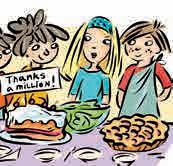
2. The kitchen door is a. closed. b. locked.
3. Dora may enter the kitchen a. in an hour. b. in half an hour.
4. ‘Everything’s under control’, a. says Vicky. b. says Alice.



We say: board a plane/ship enter a room There is no preposition!



5. … made the cake. a. Alice and Justin b. Boris and Justin
6. ‘That’s so sweet of you!’ means a. ‘Thank you b. ‘I love very much!’sweet things.’
Listen to part of another conversation and answer the questions.
•Where are the Wilsons and the Biyvovks?

•How many pieces of luggage have the Wilsons got?
luggage (uncount.) = baggage baggage (uncount.) = suitcases and bags packed for travelling hand luggage (BrE) = cabin baggage (AmE)
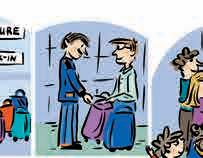
Now read the whole conversation and answer the questions below.
Anna: The check-in desks are over there. I think all our luggage’s here.
John: Shall I count the bags?
Anna: Yes, dear. Thank you.
John: One, two, three, four... five, six, seven… and my laptop bag is number eight. So, we’ve got four suitcases and four pieces of hand luggage. Perfect!
Man: Excuse me, sir, could you move these suitcases a bit? They’re blocking the way.
John: I’m sorry. We’ll move them immediately. Is it OK now?
Man: Yes, thank you.
Anna: We need to check in. Look! Our flight will start boarding in an hour at Gate 8. So... it’s time to say goodbye!
John: What can I say? Thank you, guys! We had such a wonderful time!
Alice: We’ll miss you so much! I know we can chat online, but it’s different when we do things together.
Anna: Goodbye, Dora, Peter.
Dora and Peter:
Goodbye! Have a nice flight!
The kids: Bye-bye!
Vicky: Hey, Justin, mind your mobile! Don’t leave it on the plane again!
1. What does John offer to do?
2. What does the man ask John to do?
3. Why does John have to move the luggage?
4. When will the flight start boarding?
5. What does Vicky tell Justin?
Now listen to two airport announcements. Complete the sentences.
A: 1. The plane is going to … .
2. The passengers are boarding at … .
B: 1. The plane is going to … .
2. Diego Rodrigues has got … minutes to board.
1. Can , could and may (permission)
Study the examples and match them with the rules.
1. A: Can I ask a question, please? B: Sure, go ahead.
2. A: Could I ask a question, please? B: Yes, you can/may./No, you can’t /may not
3. A: May I ask a question, please? B: Yes, of course.
a. We use can , could and may to ask for permission. Can is used in most situations and is informal. Could is more formal. May is the most formal of all.
b. We use can and may (but not could ) to give or refuse permission.
In your notebook, complete the sentences with can /could /may or can’t /may not .
1.
Jenny: Mum, … I have an ice cream?
Mum: Sorry, you … . We haven’t got any time.
2.
Sam: … I have one more chocolate?
Granny: Yes, you … . But just one. Sugar is bad for your teeth.
3.
Student: … I leave the exam early?
Teacher: No, you may not. You have to stay in the hall till the end.
4.
Student: … I speak to Mr Johnson?
Headmaster’s secretary: I’m afraid you … . He’s in a meeting.
Study the examples and answer the questions below.
The Wilsons are waiting patiently Listen to me carefully, please.
What do adverbs of manner tell us? How do we form adverbs of manner?
Now check with the rules.
Adverbs of manner tell us how something happens. We form most adverbs of manner from adjectives by adding -ly

ADJECTIVEADVERB quick bad angry gentle careful
quickly badly angrily gently carefully
BUT!
ADJECTIVEADVERB good fast hard late

well fast hard late
MIND THE SPELLING!
•For adjectives that end in -l , we add -ly
•For adjectives that end in -y , we remove the -y and add -ily
•For adjectives that end in a consonant + le , we remove the -e and add -y.
In your notebook, form adverbs from the adjectives below. happy happily gentle good fluent hard quiet easy patient fast angry careful beautiful
Use the adverbs in 9 to complete the sentences below. Sometimes more than one answer is correct.
Model:
Slow down, please. You’re speaking too fast
1. Dora is listening to Boris … .
2. Vicky and Boris speak English … .
3. Alice learned to dance horo … .
4. Please, do the exercise … .
5. Dad never drives too … .
6. Our team tried really … but we didn’t win the game.
7. Gabi sang … at the performance.
8. The man closed the door … and walked away.
Good manners
What polite words and phrases do you know?
When do you use them?
Revise in pairs or small groups.
Read the tips and then answer the questions. The words and phrases in the box will help you.
• Say ‘Hello’ and ‘Goodbye’.
• Say ‘Please’ and ‘Thank you’.
• Say ‘Sorry’ and ‘Excuse me’.
• Mind your language.
• Use kind words.
• Don’t interrupt.
• Wait your turn.
• Show respect for adults.
• Don’t make fun of anyone.
• Cover your mouth when you sneeze.

• Clean up after you make a mess.
• Be on time.

USEFUL LANGUAGE
• greet politely
• hold the door
• answer a question
• play a game
• yawn /jɔːn/
• cough /kɒf/
• Have a nice day!
• Thanks a lot!
• save time
• be busy and tired
• help your parents
1. What can you do to show respect for adults? Describe a situation.
2. When do you have to cover your mouth?
3. When do you have to wait your turn? Is it easy to be patient?
4. Why do you have to clean up after you make a mess?
5. What kind/helpful things do you often do or say?

Read and listen to the dialogues. Then practise in pairs.
W O R D B O X
borrow /ˈbɒrəʊ/ to receive and use something that belongs to someone else, and promise to give it back to them later
Could I borrow your pen for a minute, please? Yes, of course. Thanks. You’re welcome.
It’s very cold in here. Can I close the window? Sure. Go ahead. Thank you.
May I take photos in the museum? Yes, you may. But turn off the flash, please. Thank you.
May I see your passport? Yes, sure. Here you are. Thanks.
book dictionary magazine map hot open use my mobile I’m afraid you may not.
ticket ID card
Now make similar dialogues. Replace the words and phrases in bold with the suggestions on the right and your own ideas.
Work in pairs or small groups. Read the quotes. Agree or disagree and say why. Then summarise the opinions on the board.
A warm smile is the universal language of kindness.
Good manners are as important as brushing your teeth.
Expressing gratitude
Read the two emails and answer the questions.
• What does Debbie ask Lily to do?
• Do Lily’s parents agree?
To: Subject:
Dear Lily, We are going on holiday next week. I have to leave my cat at home because they don’t allow pets at the hotel . Could you look after my cute Fluff for a week ? Please, say ‘Yes’!!!! But don’t forget to ask your parents first. Debbie XXX
To: Subject:
Dear Mr and Mrs Johnson, Thank you very much for letting Lily look after my cat. Fluff has good manners! I hope she won’t be a problem.
Best wishes, Debbie
Imagine you have got a pet (a dog, a rabbit, a hamster, a parrot, etc.). You are going on holiday and you can’t take your pet with you. Ask your friend to look after the pet. Then write a thank you note to his/her parents.
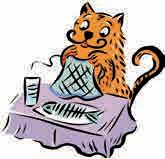

Listen and repeat.
Is that your luggage?
Are you ready?
Rising intonation is usual in yes-no questions.
Listen to the text and write the correct answers in your notebook.
Read the text and write the correct answers in your notebook.
1. A team of … made a super-thin material that can cool buildings.

a. engineers
b. university students
2. The material is a combination of

a. plastic and glass.
b. plastic and water.
3. The material can function
a. in the sun only.
b. day and night.
4. This new material is good

a. for single-family houses.
UNESCO (The United Nations Educational, Scientific and Cultural Organization) is an agency of the UN (United Nations). One of its main goals is to provide every child in the world with primary and secondary education by 2030.



b. for all types of buildings.
5. The title of the article is
a. ‘New Material Cools Buildings with Zero Consumption of Water and Energy’.

b. ‘Scientists Develop New Eco-friendly Material for Air conditioners’.
Listen again and check your answers.
According to a new UNESCO report, there are 263 million children who do not go to school throughout the world. About 25 million of them will never enter a classroom. The report also says that there are not enough teachers in countries with growing populations. In fact, the world needs another 69 million teachers to educate all children. It is a serious problem in most African countries located south of the Sahara and in the countries in southern Asia. There are also worries about class sizes. In some countries, there are over 100 children in one class.
1. According to UNESCO’s plans, … will receive a primary and secondary education by 2030.
a. all children in the world
b. all African children
2. Throughout the world, children who do not go to school are about
a. 25,000,000.
b. 263,000,000.
3. Nowadays, there are … teachers than needed.
a. more
b. less
4. Finding teachers is extremely difficult in
a. all countries in Africa and Asia.
b. some countries in Africa and Asia.
5. The UNESCO report says that in some countries classes are

a. too large.
b. too small.
6. The text is about
a. UNESCO.
b. education.
Work in pairs or small groups. Answer the questions. Make a list in your notebook.
1. What is good about going to school?
2. What is not so good about it?
3. What is good about studying at home with a parent or a private tutor?

4. What is not so good about it?
Go to page 42 in Workbook 2 to do the Grammar and Vocabulary sections.
I know how to:
agree and disagree. ask and answer about nationality. talk about continents, countries and nationalities. describe jobs. talk about pocket money. express condition. ask for permission. express gratitude.
I can:
use cardinal and ordinal numbers. use and /or /but /so . use phrases with make and do . use type 0 conditional. use can /could /may for permission. use adverbs of manner.
Read the sentence. It is a well-known saying. What does it mean?







a. When you go to Rome, do the things Italian people do.
b. When you visit a foreign country, behave like the people in this country.
Read the text. Imagine you are in Tibet and New Zealand. Act out the greeting ‘ceremonies’.
You are walking along a street in Tibet. You see a lot of Tibetans sticking out their tongues at each other. Bad manners?

No, just the opposite. This is the Tibetan way to greet each other and to show respect.
The Maori Welcome Ceremony in New Zealand is another unusual way to say 'hello'. Two people press their noses and foreheads together. For the Maori people and at major ceremonies, it is the equivalent of a handshake.
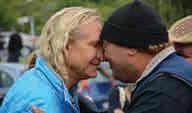
You are having a meal at a Japanese restaurant. You hear loud slurping all the time. Bad table manners? No, just the opposite. Slurping your noodles at the dinner table is a compliment to the chef and it is rude not to slurp.


Read the text. Show the gestures you MUSTN’T make when you visit these countries.
When you travel abroad you have to be very careful about the gestures you make. Some of the most common gestures have different meanings around the globe. For example, the OK sign – when you make a circle with your index finger and thumb –is not OK in certain countries. In France, it means ‘zero’ or ‘worthless’. In Venezuela, Turkey, and Brazil, it is a taboo sign.

Listen to the song.
Verse 1 (repeat):

Who works in the kitchen?
It’s a cook, I suppose. Bringing good tastes to your mouth And good smells to your nose.
Verse 2 (repeat):
Who works in a laboratory? A scientist, maybe. She’s busy making something good To use, eat, drink or see.
Chorus:
Don’t use the palm-out, fingers-up ‘stop’ sign in Greece. This common hand gesture is an insult to Greeks.
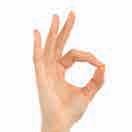
Jobs, jobs, everywhere. In the street, on the stair. Jobs, jobs, for everyone –Always lots of work to be done. Jobs, jobs, everywhere. In the street, on the stair. Jobs, jobs, for everyone.
Verse 3 (repeat):
Who works in a school?
A teacher does, that’s right. She talks and helps and marks Till the pupils see the light.
Chorus:
Jobs, jobs, everywhere.
In the street, on the stair. Jobs, jobs, for everyone –Always lots of work to be done. Jobs, jobs, everywhere. In the street, on the stair. Jobs, jobs, for everyone.
Do your own research about different manners or gestures in other countries. Present it to the class.

1 Answer the question. 2 Complete the sentence. 3 Answer the question. 4 Go to the board and write the word.
Where do Vicky and Boris live?
5 Complete the sentence.
Hi, so nice to … from you!
6 Complete the sentence.
What did Justin do during the flight? A person who often forgets things is not silly but … .
7 Answer the question. 8 Mime lazy.
Welcome … Ukraine! Alice is … sister. What does staff mean?
9Write the missing word in your notebook.
A … person doesn’t care about other people.
13 Answer the question.
10Answer the question. 11 Complete the sentence. 12 Complete the sentence.
What does Alice promise to bring Vicky?
14 Go to the board and write a popular English saying.
Can I … you a favour? A … person likes giving gifts.
15 Mime hard-working. 16 Complete the sentence.
Who is Gabi? Can you … me a favour?
17 Answer the question.
When do we use the Present Continuous? (3 uses)
21 Complete the sentence.
A … person wants to know or learn something.
18 Complete the sentence.
A … person doesn’t want to work or use energy.
22Answer the question.
What are you doing now?
25Which is different?26Complete the sentence.
a. kind
b. friendly
c. sweet
d. patient
My sister is very … . She never listens to my opinion.
19 Answer the question.
Who is Dora?
23 Say another word for people (informal).
20Answer the question.
What does a bossy person do?
24 Go to the board and write two adjectives describing personality.
27Complete the dialogue.
A: I’m Jenny. Nice to meet you.
B:
28 Mime fall asleep.

1 Which is different? 2 Complete the sentence. Make it true for you.
a. skateboarding
b. mountain biking
c. playing video games
d. canoeing
5 Answer the question.
I don’t think … .
6 Go to the board and write a synonym of free time .
What does Vicky think of rafting?
9 Say the word.
13 Go to the board and write an outdoor activity.
3 Answer the question.
4 Complete the sentence.
What activity will Vicky skip? Justin says that rafting is … .
7 Say the word. 8 Answer the question.
What clothes and other equipment do you need if you want to go hiking in summer?
10Which is different? 11 Finish the phrase. 12 Complete the dialogue. Make a suggestion.
a. paintball
b. zip wire
c. action park
d. rope garden
14 Complete the sentence.
Enjoy a weekend full … fun and action!
Boris: Come on, Vicky. Don’t be a …!
15 Answer the question.
When do we use will? (3 uses)
17 Which is different? 18 Say the word. 19 Go to the board and write another word for friend .
a. swimming
b. canoeing
c. camping

d. windsurfing

21 Mime snowboarding.
22Answer the question.
Where will Anna and Dora go after the rafting?
25 Spell the word cycling as fast as you can.
26 Say three international words.
23Complete the sentence. Make it true for you.
I’m sure … .
27 Mime ice skating.
A: I can’t do my homework.
B:
16 Spell the word adventurous as fast as you can.
20Answer the question.
What don’t you mind doing?
24Answer the question.
What do you enjoy doing?
28Say the word.
1 Which is different? 2 Complete the sentence with your idea.
a. lorry
b. coach
c. ferry
d. train
5 Answer the question.
When do we use be going to?
I think, the cheapest way to travel around Ukraine is on/by … .

6 Complete the sentence.
The best is yet to … .
9 Say the word. 10Answer the question.
Are the Wilsons and the Biyvovks going to travel straight to the seaside?
3 Answer the question.
How do you travel when you go on holiday?
4 Complete the sentence.
On their way back to Kyiv, the Wilsons and the Biyvovks are going to … .
7 Say the word. 8 Answer the question.
What are you going to do next month?
11 Complete the sentence.
I take the dog … a walk twice a day.
12 Complete the sentence.
Justin says that … is boring.
13 Answer the question.
14 Name a small/ charming old town in Ukraine.
15 Mime helicopter.
16 Complete the sentence. When do people take a taxi?
17 Answer the question.
Your teacher is at the board. What is she/he going to do?
21 Complete the sentence.
Alice misses her … a lot.
25Answer the question.
How are the two families going to tour Ukraine?
18 Complete the sentence.
A … is a thing used for transporting people or goods, especially on land, such as a car, lorry, etc.
22Answer the question.
What is the American word for Underground?
26Complete the sentence.
Justin almost fell asleep … the film.
19 Go to the board and write the American word for lorry .
I want to be better at English. That’s why I’m going to … .
20 Spell the word sunbathing as fast as you can.
23Mime Attention, please.
24Answer the question.
What day is it the day after tomorrow?
27 Spell the word bicycle as fast as you can.
28Complete the sentence.
We’re … ears!
1 Which is different? 2 Complete the sentence.
a. meerkat
b. ostrich
c. tapir
d. anteater
5 Answer the question.
Which verbs are regular?
The Wilsons and the Biyvovks started their Ukrainian tour on ... .
6 Complete the sentence.
Hop … of the car!
3 Answer the question.
When do people use binoculars?
4 Name a large bird of prey.
7 Say the word. 8 Answer the question.
Why did the two families drive to Kremenets?
11 Finish the phrase. 12 Answer the question.
a. spot
9 Which is different? 10 Spell the Past Simple form of bring as fast as you can.
b. see
c. skip
13 Go to the board and write an adjective that means very impressive and beautiful .
17 Which is correct?
a. We’re wasting our time.
b. We’re losing our time.
14 Complete the sentence.
After the two families saw the rare bird, they … .

18 Say the word.
That sounds …!
How do we pronounce the -ed ending of regular verbs?
15 Complete the rule. 16 Which is different?
We use … when we talk about people or things in general.
19 Go to the board and write the Past Simple form of teach .
a. buy
b. stay
c. feel
d. spend
20 Name a small African animal that lives in large underground networks.


21 Complete the rule.22Answer the question.
We use … when we talk about specific people or things.
Which animal hasn’t got any teeth?
23 Go to the board and write the base form of fell .
24Answer the question.
Which verbs are irregular?
28Answer the question.
a. paint
25Which is different? 26Say the word. 27 Spell the Past Simple form of understand as fast as you can.
b. draw
c. feed
d. grow
Where did you go yesterday?
1 Answer the question.
What were you doing when the bell rang?
5 Answer the question.
What were Anna and Dora doing when the others arrived?
2 Complete the sentence.
After they visited the nature reserve, John, Peter and the kids discovered … .
6 Mime collect the rubbish in a bag
3 Answer the question.
What can you do on the beach?
7 Name this plant.
4 Which is correct?
a. There were hundreds of water lilies on the lake.

b. There were hundreds water lilies on the lake.
8 Answer the question.
How do we form the Past Continuous?
9 Which is different? 10 Name a nature reserve in Ukraine.
a. path c. street
b. dune d. way
13 Go to the board and write ‘one billion’ in numbers.
14 Complete the sentence.
They … a secret beach while they were walking around.
17 Which is correct?
a. They saw dozens rare birds.
b. They saw dozens of rare birds.
21 Complete the sentence.
We use … to say that two actions were happening at the same time.
25Answer the question.
What were you doing at 6:30 this morning?
18 Say the word.
11 Mime explore.
12 Which is different?
a. save c. recycle
b. waste d. reuse
15 Answer the question.
How many oranges are there in half a dozen oranges?
19 Which is different?
a. move
b. sail c. float d. swim


22Answer the question.
What did the ‘explorers’ do in the morning?
26Say the word.
23 Go to the board and write the word we use for the natural world around us – the land, the water, the air, plants and animals.
27 Spell discover as fast as you can.
16 Name this plant.

20 Name 3 things we can recycle.

24Say the word.
28Answer the question.
When do we use the Past Continuous?
1 Answer the question.
2 Complete the sentence.
What were Alice and Vicky doing in the fields behind the house? Run! Don’t look …!
5 Complete the sentence.
I was … kidding you.
6 Mime graze.
9 Which is different? 10 Spell skyscraper as fast as you can.
a. village
b. hometown
c. city
d. building
13 Go to the board and write the American word for subway .
17 Which is correct?
a. They are so clever students.
b. They are such clever students.
21 Complete the sentence.
I’m so … to see you!
25Complete the sentence and make an excuse.
I heard the phone ringing but I … .
3 Answer the question.
Where do Granny and Grandpa live?
7 Say it in another way.
It’s not the same, it’s … .
11 Say the word.
4 Which is correct?
a. It’s such a wonderful party!
b. It’s so wonderful party!
8 Make one sentence.
I came back home. Mum was waiting for me.
12 Which is different?
a. vineyard

b. garden
c. patatnik
d. orchard
14 Complete the sentence.
15 Answer the question.
16 Complete the sentence. Scare these monsters …!
What did Alice and Vicky hear while they were walking?
18 Say the word.
22Answer the question.
What did the geese do after the girls started running?

26Say the word.
The girls … and saw the scary birds.
19 Which is different? 20 Spell office building as fast as you can.

a. office building
b. cottage
c. skyscraper
d. flat
23 Go to the board and write the word we use for fast running of a horse.
27 Spell cottage as fast as you can.
24Say the word.
28Answer the question.
When do we use the Past Continuous and the Past Simple together?

1 Say the word. 2 Answer the question.
5 Choose the correct word.
Peter is the winner of the Maths test/competition
9 Complete the dialogue.
What can you do at Piping Live! Festival?

6 Which word has a similar meaning to meadow?

a. hill
b. path
c. field
10Say the word.
3 Complete the sentence.
My father taught … to play the guitar when he was 14.

7 Correct the sentence.
Christy is not as patient than Lora.
11 Complete the sentence.
A: Shall we go out? B: Justin and Alice … the horo circle.
13 Complete the sentence.
14 Complete the sentence.
The fireworks were … exciting. As … as a wolf.

17 Complete the sentence.
I am going to … a party for my birthday.

21 Say the phrase.
18 Which is different?
a. magnificent
b. picturesque
c. extraordinary
d. incredible
22Complete the sentence.
15 Choose the correct word.
4 Complete the sentence.
Martin is … strong … Peter.
8 Complete the sentence.
Piping Live! Festival is … famous.
12 Complete the sentence.
March is … as cold as January.
16 Say it in another way.
I’m listening to my favourite rhythm/tune Alice is shorter than Justin.
19 Say the phrase.
20 Answer the question.
Which word is stronger: quite or very?
23Choose the correct word.
24Correct the sentence.
It’s … hot outside. It’s 35 degrees.
25Wish someone a happy birthday.
26Say it in another way.
I’m not as tall as you.
We hiked for 8 hours last weekend. It was tired/exhausting.
27Complete the sentence.
We really enjoyed … at the festival.
Maya and Andy, did you write this story yourself?
28Say the phrase.




1 Go to the board and write 3 words for hobbies and interests.
2 Choose the correct word.
Please, turn off your mobile. The stage/ performance will begin shortly.
5 Answer the question.
What does Gabi invite the cousins to?
9 Complete the dialogue.
Teacher: Lucy is the best student!
Mum: She works hard. I’m so … of her!
13 Your friend won a race. Congratulate him/her.
6 Complete the sentence.
Betty is 20. She is old … to drive.
10Complete the sentence.
I need a sweater. It’s … cold in here.
14 Which is different?
a. fantastic
b. talented
c. brilliant
d. great
17 What’s her hobby?
18 Complete the question and then answer it.
When will you … travel by yourself?
21 Complete the sentence.
I won’t go to the concert. The tickets are … expensive.
25Complete the sentence.
22What’s their hobby?
3 Complete the sentence.
‘The Prince and the Pauper’ is a … by Mark Twain.
7 Complete the sentence.
I … swim when I was six.
4 What’s his hobby?
26Complete the sentence.
My big brother says he’s … old to watch cartoons! The shoe is … .
8 Your friend invites you to the cinema. You can’t go. Make an excuse.
11 What’s her hobby? 12 Choose the correct phrase.

I’m not old enough/too old to ride a motorbike.
15 Complete the sentence.
Have you got this sweatshirt in large? This one isn’t large … .
19 Answer the question.
What do you do in your free time on weekdays?
23Complete the sentence.
I’m sorry I … phone you yesterday. My battery died.
27 Spell congratulations as fast as you can.
16 What’s his hobby?
20Complete the sentence.
I’ll … play the piano next year. I’m learning now.
24Answer the question.
What do you do in your free time at weekends?
28 You want to go to a kids’ disco. Ask your mum if you can go.
1 Complete the sentence. 2 Complete the sentence. 3 Choose the correct phrase. 4 Go to the board and write the word.
Would you like … to drink?
I don’t want … to eat. I’m not hungry.
My mum never cooks on Friday evenings. We get out/eat out
5 Complete the sentence. 6 Say the word. 7 Say it in another way. 8 Complete the dialogue.
Hello! Is there … home? I’m very hungry.
A: ... you like some water? B: No, … .
9 Say the phrase. 10Complete the sentence. 11 Complete the dialogue. 12 Complete the sentence.

The restaurant is just ... the corner.
A: Do you know … who can help us? B: No, I don’t.
Tomato salad, spinach balls and garlic bread are s… .

13 Choose the correct phrase. 14 Complete the sentence. 15 Choose the correct word. 16 Choose the correct word.
Would you like a bit of/a number of milk in your tea?
17 Complete the sentence.
Try the French cake. We bake it here. It’s …


21 Choose the correct phrase.
Nobody don’t know/ knows the name of the new girl.
25Complete the sentence.
I’ll have Crѓme Caramel for d… .
I’d like grilled pork steak for m… c... .
18 Complete the sentence.
Love is an example of … noun.
22Say the name of the dish.
What can you advise/recommend?
Thanks for inviting us! Everything/Something was perfect!
19 Say the phrase. 20Complete the sentence.
Coffee, tea and water are b… .
23Complete the dialogue.
A: … you … some water?
B: …
26Say the phrase.
27Offer someone a drink.
24 You’re at a fresh bar. Ask for a smoothie.
28Which is different?
a. music
b. computer
c. help
d. information
1 Answer the question.
Which stall do the cousins go to at the International Culture Fair?

5 Which is different?
a. France
b. Brazil
c. Chinese
d. Egypt


9 Say the name of the place of interest and the country.

2 Say the word.
3 Answer the question.
Which continent do you live on?
6 Answer the question.
Which four continents start with the letter A?
10Complete the sentence.
7 Say the word.
4 Go to the board and write the cardinal and ordinal number in words.
40
8 Make one sentence.
You can see the Mona Lisa. You can take a photo of it.

11 Choose the correct explanation.
Chernivtsi is located on both … of the Prut. Chorizo is a. a sausage. b. a meatball.
12 Complete the sentence.
Kyiv is the … of Ukraine.
13 Say the four cardinal directions.
14 Go to the board and write the cardinal and ordinal number in words.
555
15 Make one sentence.
We didn’t have time. We didn’t go to the Colosseum.

17 Answer the question.
Which continents have a cardinal direction in their names?
21Go to the board and write the cardinal and ordinal number in words.
1,000
25Make one sentence.
We can walk. We can take the bus.
18 Make one sentence.
We went to the UK. We didn’t visit Stonehenge.
22Go to the board and write the adjective.
Greece
26 Say the name of the place of interest and the country.
19 Say the name of the place of interest and the country.
16 Agree with the person.
A: I think they’re German. You: …
20Which is different?
a. German c. Greece
b. Brazilian d. Spanish
23Disagree with the person.
A: I think they’re British. You: …
27Complete the sentence.
Where do you come ...?
24 Say the name of the place of interest and the country.
28Go to the board and write the adjective.
Turkey
1 Say the word. 2 Answer the question.
5 Answer the question.
What is the money that your parents give you everyday called?
6 Go to the board and write 3 phrases with do
3 Say the word. 4 Answer the question.
What do people fill in at a hotel?
7 Complete the sentence.

8 Complete the question and then answer it.
Why is Justin looking for a job?
9 Say the word. 10 Answer the question.
How old do you need to be to get a paid job in the UK?


13 Complete the question and then answer it.
How often do you … crosswords?
Have you got any money ... you?
11 Complete the sentence.
… dad gets home early, he always makes dinner.
14 Say the word. 15 Go to the board and write 3 phrases with make .
17 Complete the sentence. 18 Answer the question.
The teacher corrects me … I make a mistake.
21 Complete the saying.
Where there’s a will, there’s a … .
What does ‘a tenner’ mean?
19 Complete the sentence.
My sister is looking … a job.
22Say the word. 23Complete the question and then answer it.
When did you last … a phone call?

25Say the word. 26Complete the question and then answer it.
Did you ... your bed this morning?
27Complete the question and then answer it.
What do you spend your pocket money …?
When do you … your homework?
12 Say the word.
16 Answer the question.
What is the informal word for ‘sister’?
20Complete the question and then answer it.
What do you do … you have an accident?



24 Answer the question.
How many terms are there in the school year in the UK?
28Say the word.

1 You push someone. What do you say?
5 Complete the request.
Dad, … I invite Peter home tomorrow?
9 Complete the question and then answer it.
How many pieces of … have the Wilsons got?
13 Choose the correct word.
2 Choose the correct phrase.
3 Say the verb.
4Complete the sentence with an adverb of manner. Make it true for you. Please, don’t enter in the room/the room. I sing … .
6Complete the sentence with an adverb of manner. Make it true for you.
7 Choose the correct word.
8 Choose the correct phrase.
I’m sorry/Excuse me, can you tell me the way to the station? I do my homework … .
10Say the word.
Have you got everything? Check your luggage careful/carefully

11 You make a mistake. What do you say?
12 Complete the request.
Miss, … I go out for a minute? I need to go to the toilet.
14 Which is NOT good manners?

a. Using kind words.
b. Being on time.
c. Not interrupting.
d. Not waiting your turn.
17 Choose the correct word.
15 Answer the question.
16 You want to go out. Ask your mum for permission. Sorry/Pardon, I didn’t understand that.
What sign is there on the Biyvovks’ kitchen door?
18 You are late for school. What do you say to the teacher?
19 Complete the offer.
… a seat, please.
20 Complete the sentence with an adverb of manner. Make it true for you. Could I take/borrow your pen, please?
I can speak English … .
21 Complete the sentence.
Don’t worry, dad. Everything is … control.
25Complete the sentence.
If I …, I always cover my mouth.
22 You want to enter the staffroom. Ask for permission.
26Complete the sentence.
Don’t be rude! … your language!
23 Go to the board and write a polite word or phrase.
24Choose the correct phrase.
They boarded the plane/on the plane on time.
27Complete the dialogue.
A: … I see your ID card? You: … .
28 You want to go to a kids’ disco. Ask your dad if you can go.
Work in groups. Organise a school trip around Ukraine for your class.


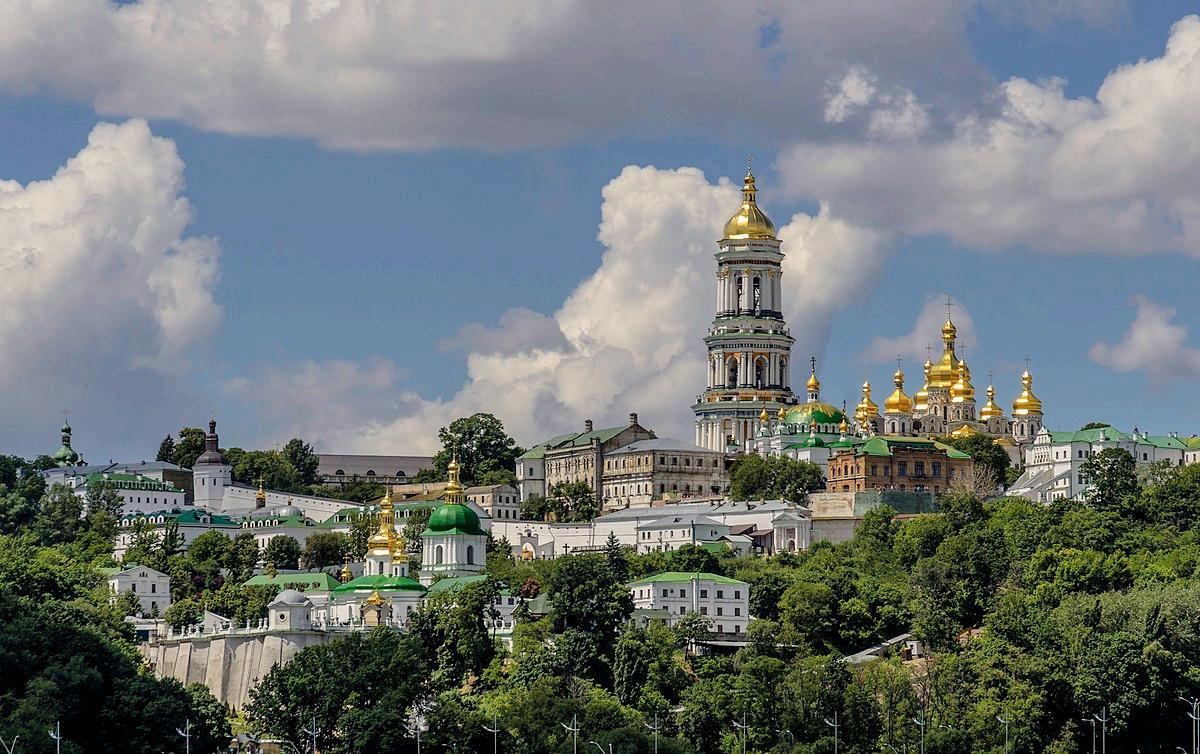
Decide:
• Which place are you going to visit?
• How are you going to travel?
• How many days is the trip going to last?
• What are you going to do there?
• What places of interest are you going to visit?
Look for information on the Internet or in the school library. Make a brochure to advertise the trip to your classmates.
Work in pairs. Describe a national park or a reserve in Ukraine. Look for information on the Internet or in the school library.


Describe:
• its size and location;


• the plants that grow there;
• the animals that live there;

• its importance.
Stick photos or draw pictures.


Imagine you are the manager of a restaurant or a café. Give it a name. Design the menu.
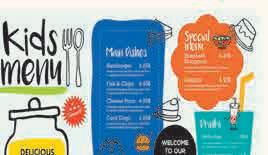

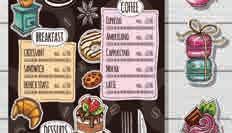
Think about:
• the customers you want to attract (age groups);


• their eating habits;

• healthy meals;
• traditional or international cuisine;





• lunch deals.
Look for information on the Internet.

Work in pairs. Write a short letter or an email to your partner. Invite him/her to a party, to the cinema, to a sporting event, etc. Read the invitation from your partner. Decline the invitation politely. Write a short letter or send him/her an email.
Don’t forget to:
• thank the sender;
• apologise for not going;
• explain why you can’t attend;
• suggest alternative time to meet.

The phrases below will help you.
• Thank you so much for the invitation …, etc.




•I’m afraid I won’t be able to come …, etc.
•I’m visiting …, etc.

•I can’t/won’t be able to come/join you on … but I am free on …/next week.
Why don’t we go to/Shall we go to the cinema/a pizza restaurant, etc then?
If you exchange emails, print them out and show them to the teacher and the class.
absent-minded, adj /ˈæbs(ə)nt ˈmaɪndɪd/ розсіяний
All’s well that ends well. Все добре, що добре закінчується. argue, v /ˈɑː(r)ɡjuː/ сперечатися arrangement, n /əˈreɪndʒmənt/ домовленість behave, v /bɪˈheɪv/ поводитися bossy, adj /ˈbɒsi/ владний conversation, n /ˌkɒnvə(r)ˈseɪʃ(ə)n/ розмова curious, adj /ˈkjʊəriəs/ допитливий eager, adj /ˈiːɡə(r)/ нетерплячий fall asleep /fɔːl əˈsliːp/ заснути favour, n /ˈfeɪvə(r)/ послуга
ask someone a favour, попросити когось про послугу do someone a favour, зробити комусь послугу flight, n /flaɪt/ політ folks, n (pl) /fəʊks/ люди (розм.) generous, adj /ˈdʒenərəs/ щедрий guys, n (pl) /ɡaɪz/ хлопці (розм.) hard-working, adj /hɑː(r)dˈwɜː(r)kɪŋ/ працьовитий hug, n /hʌɡ/ обійми introduce, v /ˌɪntrəˈdjuːs/ представити, знайомити lazy, adj /ˈleɪzi/ ледачий miss, v /mɪs/ втрачати, My mobile is missing. Мій мобільний відсутній. naughty, adj /ˈnɔːti/ неслухняний order, n /ˈɔː(r)də(r)/ порядок, наказ give an order, дати наказ pack, v /pæk/ пакувати, складати (багаж) promise, v /ˈprɒmɪs/ обіцяти seat, n /siːt/ місце, сидіння take a seat, звйняти місце selfish, adj /ˈselfɪʃ/ егоїстичний, себелюбний silly, adj /ˈsɪli/ дурний staff, n (uncountable) /stɑːf/ персонал stubborn, adj /ˈstʌbə(r)n/ упертий unpleasant, adj /ʌnˈplez(ə)nt/ неприємно
buddy, n /ˈbʌdi/ приятель canoe, n /kəˈnuː/ каное change out of, v перевдягатися complain, v /kəmˈpleɪn/ скаржитися crawl, v /krɔːl/ повзати event, n /ɪˈvent/ подія healthy, adj /ˈhelθi/ здоровий kayak, n /ˈkaɪæk/ каяк
leisure, n (uncountable) /ˈleʒə(r)/ дозвілля lifestyle, n /ˈlaɪfˌstaɪl/ спосіб життя mountain biking, n (uncountable) //ˈmaʊntɪn ˌbaɪkɪŋ/ катання на гірських велосипедах paintball, n /ˈpeɪntˌbɔːl/ пейнтбол
raft, n /rɑːft/ пліт rafting, n (uncountable) /ˈrɑːftɪŋ/ рафтинг
rope, n /rəʊp/ мотузка
rock climbing, n (uncountable) /rɒkˈklaɪmɪŋ/ скелелазіння
rope garden, n мотузковий парк scary, adj /ˈskeəri/ страшно
shake, v /ʃeɪk/ тремтіти
skateboarding, n (uncountable) /ˈskeɪtˌbɔː(r)dɪŋ/ скейтбординг
skip, v /skɪp/ пропускати
snowboarding, n (uncountable) /ˈsnəʊˌbɔː(r)dɪŋ/ сноуборд van, n /væn/ фургон windsurfing, n (uncountable) /ˈwɪn(d)ˌsɜː(r)fɪŋ/ віндсерфінг wreck, n /rek/ уламок zip wire, n /ˈzɪp ˌwaɪə(r)/ застібка
UNIT 3 transport, n (uncountable) /ˈtrænspɔː(r)t/ транспорт means of transport, види транспорту attention, n (uncountable) /əˈtenʃ(ə)n/ увага at the seaside, /ˈsiːˌsaɪd/ на морі birdwatching, n (uncountable) /ˈbɜː(r)dˌwɒtʃɪŋ/ спостереження за птахами cable car, n /ˈkeɪb(ə)l ˌkɑː(r)/ канатна дорога camper van, n /ˈkæmpə(r) ˌvæn/ кемпер caravan, n /ˈkærəvæn/ трейлер ferry, n /ˈferi/ паром folk music, n (uncountable) /ˈfəʊkˌmjuːzɪk/ народна музика have in mind, мати на увазі helicopter, n /ˈhelɪˌkɒptə(r)/ гелікоптер imagine, v /ɪˈmædʒɪn/ уявляти lorry, n /ˈlɒri/ вантажівка (брит.)
motorbike, n /ˈməʊtə(r)ˌbaɪk/ мотоцикл (брит.) motorcycle, n /ˈməʊtə(r)ˌsaɪk(ə)l/ мотоцикл (амер.)
subway, n /ˈsʌbˌweɪ/ метро (амер.)
sunbathe, v /ˈsʌnˌbeɪð/ засмагати
sunbathing, n сонячні ванни
The best is yet to come. Найкраще ще попереду. tour, n /tʊə(r)/ подорож, турне tram, n /træm/ трамвай truck, n /trʌk/ вантажівка (амер.)
Проєкт майбутньогопідручника
Видавництво
«Ранок»
Underground (the), n /ˈʌndə(r)ˌɡraʊnd/ метро (брит.) vehicle, n /ˈviːɪk(ə)l/ транспортний засіб
located in, розташований у natural, adj /ˈnætʃ(ə)rəl/ природний ranger, n /ˈreɪndʒə(r)/ лісник wonder, n /ˈwʌndə(r)/ чудо, диво wonders of the natural world, чудеса світу природи
anteater, n /ˈæntˌiːtə(r)/ мурахоїд armadillo, n /ˌɑː(r)məˈdɪləʊ/ броненосець binoculars, n (pl) /bɪˈnɒkjʊlə(r)z/ бінокль
eagle, n /ˈiːɡ(ə)l/ орел general, adj /ˈdʒen(ə)rəl/ загальний
in general, в цілому Imperial Eagle, n /ɪmˈpɪəriəl ˈiːɡ(ə)l/ імператорський орел
length, n /leŋθ/ довжина magnificent, adj /mæɡˈnɪfɪs(ə)nt/ чудовий
meerkat, n /ˈmɪə(r)ˌkæt/ сурикат ostrich, n /ˈɒstrɪtʃ/ страус platypus, n /ˈplætɪpəs/ качконіс prey, n (uncountable) /preɪ/ здобич bird of prey, n хижий птах protected, adj /prəˈtektɪd/ той, що охороняється rare, adj /reə(r)/ рідкісний road, n /rəʊd/ дорога on the road again знову в дорозі sloth, n /sləʊθ/ лінивець species, n (pl) /ˈspiːʃiːz/ види (біол.) spot, v /spɒt/ визначити, заплямовувати tail, n /teɪl/ хвіст tapir, n /ˈteɪpə(r)/ тапір waste, v /weɪst/ марнувати, витрачати waste my time, марнувати мій час weigh, v /weɪ/ важити weight, n /weɪt/ вага wildlife, n (uncountable) /ˈwaɪldˌlaɪf/ дика
природа wingspan, n /ˈwɪŋˌspæn/ розмах крил
UNIT 5
actually, adv /ˈæktʃʊəli/ власне bin, n /bɪn/ відро для сміття recycle bin, n кошик для сміття clean-up, n прибирання
daffodil, n /ˈdæfədɪl/ нарцис sea daffodil, n морський нарцис discover, v /dɪˈskʌvə(r)/ виявити dozen, determ /ˈdʌz(ə)n/ десяток, дюжина dune, n /djuːn/ дюна environment, n /ɪnˈvaɪrənmənt/ навколишнє
середовище explore, v /ɪkˈsplɔː(r)/ досліджувати explorer, n /ɪkˈsplɔːrə(r)/ дослідник
float, v /fləʊt/ плавати grab, v /ɡræb/ хапати nature reserve, n /ˈneɪtʃə(r) rɪˈzɜː(r)v/
заповідник note, n /nəʊt/ примітка path, n /pɑːθ/ шлях recycle, v /riːˈsaɪk(ə)l/ переробляти reuse, v /riːˈjuːz/ використовувати вдруге rubbish, n (uncountable) /ˈrʌbɪʃ/ сміття sail, v /seɪl/ вітрило separate, v /ˈsepəreɪt/ відокремлювати swimming trunks, n (pl) /ˈswɪmɪŋ ˌtrʌŋks/ плавки swimsuit, n /ˈswɪmˌsuːt/ купальник throw, v /θrəʊ/ кинути throw away, v викинути towel, n /ˈtaʊəl/ рушник water lily, n /ˈwɔːtə(r)ˈlɪli/ латаття while, conj /waɪl/ поки
UNIT 6 attack, v /əˈtæk/ атака barn, n /bɑː(r)n/ сарай bite, v /baɪt/ укус building, n /ˈbɪldɪŋ/ будівля bull, n /bʊl/ бик chase, v /tʃeɪs/ бігати, переслідувати cottage, n /ˈkɒtɪdʒ/ котедж countryside, n (uncountable) /ˈkʌntriˌsaɪd/ сільська місцевість darling, n /ˈdɑː(r)lɪŋ/ милий excuse, n /ɪkˈskjuːs/ вибачення field, n /fiːld/ поле follow, v /ˈfɒləʊ/ слідувати gallop, v /ˈɡæləp/ бігти галопом goose, n /ɡuːs/ гусак graze, v /ɡreɪz/ пастися hiss, v /hɪs/ шипіти hissing, adj /ˈhɪsɪŋ/ шиплячий horror, n /ˈhɒrə(r)/ жах horror film, фільм жахів invent, v /ɪnˈvent/ винаходити invent your own excuses, вигадувати власні виправдання
monster, n /ˈmɒnstə(r)/ чудовисько orchard, n /ˈɔː(r)tʃə(r)d/ фруктовий сад scare, v /skeə(r)/ налякати scare away, v відлякнути sculpture, n /ˈskʌlptʃə(r)/ скульптура skyscraper, n /ˈskaɪˌskreɪpə(r)/ хмарочос
smell, v /smel/ запах traffic, n (uncountable) /ˈtræfɪk/ рух, трафік underpass, n /ˈʌndə(r)ˌpɑːs/ підземний перехід (амер.)
vineyard, n /ˈvɪnjə(r)d/ виноградник yard, n /jɑː(r)d/ подвір’я
UP TO NOW 2
available, adj /əˈveɪləb(ə)l/ наявний feeder, n /ˈfiːdə(r)/ годівниця main, adj /meɪn/ головний
rent, n /rent/ орендна плата situated, adj /ˈsɪtʃueɪtɪd/ розташований throughout, prep /θruːˈaʊt/ скрізь
FUN TIME 1
alive, adj /əˈlaɪv/ живий arm, n /ɑː(r)m/ рука back, n /bæk/ назад bend, v /bend/ згинати breath, n /breθ/ подих breathe, v /briːð/ дихати brook, n /brʊk/ струмок by your side, з твого боку chest, n /tʃest/ груди consist of, v /kənˈsɪst/ складатися з fingertip, n /ˈfɪŋɡə(r)ˌtɪp/ кінчик пальця heel, n /hiːl/ підбір petal, n /ˈpet(ə)l/ пелюстка pose, n /pəʊz/ поза raise, v /reɪz/ піднімати stand up, v підводитися thigh, n /θaɪ/ стегно
among, prep /əˈmʌŋ/ серед as … as, adv /æz … æz/ такий ... як, така … як bagpiper, n /ˈbagpaɪpə(r)/ волинщик blog, n /blɒɡ/ блог blow, v /bləʊ/ зігрівати диханням bonfire, n /ˈbɒnˌfaɪə(r)/ багаття candle, n /ˈkand(ə)l/ свічка charming, adj /ˈtʃɑː(r)mɪŋ/ чарівний colourful, adj /ˈkʌlə(r)f(ə)l/ барвистий
competition, n /ˌkɒmpəˈtɪʃ(ə)n/ змагання control, v /kənˈtrəʊl/ контролювати, керувати costume, n /ˈkɒstjuːm/ костюм cracker, n /ˈkrækə(r)/ хлопавка crowd, n /kraʊd/ натовп decorate, v /ˈdekəreɪt/ прикрашати decoration, n /ˌdеkəˈreɪʃ(ə)n/ прикраса exhausting, adj /ɪɡˈzɔːstɪŋ/ виснажливий expect, v /ɪkˈspekt/ очікувати experience, n /ɪkˈspɪərɪəns/ досвід gathering, n /ˈɡæðərɪŋ/ збирання grill, v /ɡrɪl/ смажити на грилі
guitar, n /ɡɪˈtɑː(r)/ гітара heavy, adj /ˈhevi/ важкий
honest, n /ˈɒnɪst/ чесний
Hungary, n /ˈhʌŋgəri/ Угорщина incredible, adj /ɪnˈkredəb(ə)l/ неймовірно
Japan, n /dʒəˈpan/ Японія kitten, n /ˈkɪt(ə)n/ кошеня
lively, adj /ˈlaɪvli/ жвавий, веселий meadow, n /ˈmedəʊ/ луг melodious, adj /məˈləʊdiəs/ милозвучний neighbour, n /ˈneɪbə/ сусід Netherlands (the), n /ˈnеðələndz/ Нідерланди organise, v /ˈɔːg(ə)naɪz/ організовувати paint, v /peɪnt/ фарба pick up, v підібрати pick up the rhythm, підбирати ритм picturesque, adj /ˌpɪktʃəˈresk/ мальовничий
pile, n /paɪl/ купа prize, n /praɪz/ приз produce, v /prəˈdjuːs/ виробляти put up, v поставити rhythm, n /ˈrɪðəm/ ритм shout, v /ʃaʊt/ кричати simply, adv /ˈsɪmpli/ просто solemn, adj /ˈsɒləm/ урочисто step, n /step/ крок surprised, adj /sə(r)ˈpraɪzd/ здивований Sweden, n /ˈswiːd(ə)n/ Швеція Swedish, adj/n /ˈswiːdɪʃ/ шведський take place, відбуватися throw a party, організувати вечірку tune, n /tjuːn/ настроювати usual, adj /ˈjuːʒʊəl/ звичний winner, n /ˈwɪnə(r)/ переможець wolf, n /wʊlf/ вовк as hungry as a wolf, idiom голодний, як вовк
UNIT 8
acting, n /ˈæktɪŋ/ акторська майстерність baking, n /ˈbeɪкɪŋ/ випічка
Проєкт
Видавництво
«
Ранок»
bazaar, n /bəˈzɑː(r)/ базар brill, adj /brɪl/ блискучий (розм.)
brilliant, adj /ˈbrɪljənt/ блискучий
chef, n /ʃef/ кухар
collect, v /kəˈlekt/ збирати congrats, n /kənˈɡræts/ вітання (розм.) congratulate, v /kənˈɡrætʃʊleɪt/ вітати congratulations, n /kənˈɡrætʃʊleɪʃənz/ вітання
create, v /kriˈeɪt/ творити deep, adj /diːp/ глибокий easily, adv /ˈiːzɪli/ легко
hobby, n /ˈhɒbi/ захоплення
hole, n /həʊl/ отвір interest, n (uncountable) /ˈɪntrəst/ інтерес
invent, v /ɪnˈvent/ винаходити keep a pet, тримати домашнього улюбленця
noise, n /nɔɪz/ шум pass, v /pɑːs/ складати (іспит); проходити (тест)
pauper, n /ˈpɔːpə(r)/ жебрак perform, v /pə(r)ˈfɔː(r)m/ виконувати performance, n /pə(r)ˈfɔː(r)məns/ вистава
prince, n /prɪns/ принц production, n /prəˈdʌkʃ(ə)n/ виробництво proud (of), adj /praʊd/ гордий (чим) puzzle, n /ˈpʌz(ə)l/ пазл recipe, n /ˈresəpi/ рецепт recognise, v /ˈrekəɡnaɪz/ розпізнавати stage, n /steɪdʒ/ стадія star, n /stɑː(r)/ зірка talented, adj /ˈtæləntɪd/ талановитий theatre, n /ˈθɪətə(r)/ театр theatrical, adj /θiˈætrɪk(ə)l/ театральний
avocado, n /ˌævəˈkɑːdəʊ/ авокадо baguette, n /bæˈɡet/ багет banger, n /ˈbæŋə(r)/ банер bar, n /bɑː(r)/ бар barista, n /bəˈrɪstə/ бариста beef, n /biːf/ яловичина berry, n /ˈberi/ ягода beverage, n /ˈbev(ə)rɪdʒ/ напій blackberry, n /ˈblækbəri/ ожина breast, n /brest/ груди
cappuccino, n /ˌkæpəˈtʃiːnəʊ/ капучино
caramel, n /ˈkærəmel/ карамель
carton, n /ˈkɑː(r)t(ə)n/ коробка
cheesecake, n /ˈtʃiːzˌkeɪk/ сирник chips, n (pl) /tʃɪps/ чипси
citrus, n /ˈsɪtrəs/ цитрусові
eat out, v їсти не вдома fries, n (pl) /fraɪz/ картопля фрі grapefruit, n /ˈɡreɪpˌfruːt/ грейпфрут Italian, adj/n /ɪˈtæliən/ італійський madam, n /ˈmædəm/ пані main course, n /ˈmeɪn ˌkɔː(r)s/ основна страва mango, n /ˈmæŋɡəʊ/ манго mash, n (uncountable) /mæʃ/ пюре meatball, n /ˈmiːtˌbɔːl/ фрикаделька menu, n /ˈmenjuː/ меню mix, n /mɪks/ змішувати mixed, adj /mɪkst/ змішаний order, v /ˈɔː(r)də(r)/ замовляти, наказувати packet, n /ˈpækɪt/ пакунок pen name, n /ˈpen ˌneɪm/ псевдонім pineapple, n /ˈpaɪnˌæp(ə)l/ ананас play, n /pleɪ/ грати pork, n /pɔː(r)k/ свинина portion, n /ˈpɔː(r)ʃ(ə)n/ порція product, n /ˈprɒdʌkt/ виріб reservation, n /ˌrezə(r)ˈveɪʃ(ə)n/
scone, n /skɒn/ булочка seafood, n (uncountable) /ˈsiːˌfuːd/ морепродукти serve, v /sɜː(r)v/ служити shortly, adv /ˈʃɔː(r)tli/ незабаром shrimp, n /ʃrɪmp/ креветки sir, n /sɜː(r)/ пан slice, n /slaɪs/ зріз sliced, adj /slaɪst/ нарізаний smoothie, n /ˈsmuːði/ смузі sparkling, adj /ˈspɑː(r)k(ə)lɪŋ/ іскристий
spinach, n (uncountable) /ˈspɪnɪdʒ/ шпинат starter, n /ˈstɑː(r)tə(r)/ стартер starve, v /ˈstɑː(r)v/ голодувати
I’m starving! Я голодний!
steak, n /steɪk/ стейк steamed, adj /sti:md/ приготований на пару still, adj /stɪl/ ще survive, v /sə(r)ˈvaɪv/ виживати toffee, n /ˈtɒfi/ іриска trout, n /traʊt/ форель tuna, n /ˈtjuːnə/ тунець waiter, n /ˈweɪtə(r)/ офіціант waitress, n /ˈweɪtrəs/ офіціантка
UP TO NOW 3
carnival, n /ˈkɑː(r)nɪv(ə)l/ карнавал passionate, adj /ˈpæʃ(ə)nət/ пристрасний
Проєкт
Antarctica, n /ænˈtɑː(r)ktɪkə/ Антарктида
arrival, n /əˈraɪv(ə)l/ прибуття
Brazil, n /brəˈzɪl/ Бразилія
Brazilian, adj/n /brəˈzɪlɪən/ бразильський cardinal, adj /ˈkɑː(r)dɪn(ə)l/ основний, головний the four cardinal points, чотири сторони світу carved, adj /ka:vd/ вирізьблений
China, n /ˈtʃaɪnə/ Китай
Chinese, adj/n /ˌtʃaɪˈniːz/ китайський
chorizo, n (uncountable) /tʃəˈriːzəʊ/ чорізо civilisation, n /ˌsɪvəlaɪˈzeɪʃ(ə)n/ цивілізація cliff, n /klɪf/ обрив combat, n /ˈkɒmbæt/ бій; боротьба
compass, n /ˈkʌmpəs/ компас contest, n /ˈkɒntest/ змагання cost, v /kɒst/ коштувати (вартість)
departure, n /dɪˈpɑː(r)tʃə(r)/ від'їзд dynasty, n /ˈdɪnəsti/ династія
east, n /i:st/ схід
Egypt, n /ˈi:dʒɪpt/ Єгипет era, n /ˈɪərə/ ера exactly, adv /ɪɡˈzæk(t)li/ точно exhibition, n /ˌeksɪˈbɪʃ(ə)n/ виставка fair, n /feə(r)/ ярмарок flamenco, n /fləˈmeŋkəʊ/ фламенко geometric, adj /ˌdʒiːəˈmetrɪk/ геометричний gladiator, n /ˈɡlædiˌeɪtə(r)/ гладіатор
Greek, adj/n /ɡriːk/ грецький horseman, n /ˈhɔː(r)smən/ вершник
Italy, n /ˈɪtəli/ Італія Latin, n /ˈlætɪn/ латинська lift, n /lɪft/ ліфт; підйом mainly, adv /ˈmeɪnli/ переважно monument, n /ˈmɒnjʊmənt/ пам'ятник north, n /nɔːθ/ північ northeastern, adj /nɔːθˈiːstə(r)n/ північносхідний
Peru, n /pəˈru:/ Перу point, n /pɔɪnt/ точка; крапка position, n /pəˈzɪʃ(ə)n/ становище; положення preserved, v /prɪˈzɜː(r)vd/ зберегтися probably, adv /ˈprɒbəbli/ мабуть pyramid, n /ˈpɪrəmɪd/ піраміда reception, n /rɪˈsepʃ(ə)n/ прийом registration form, n /ˌredʒɪˈstreɪʃ(ə)n ˈfɔː(r)m/ реєстраційна форма relief, n /rɪˈliːf/ полегшення religious, adj /rəˈlɪdʒəs/ релігійний result, n /rɪˈzʌlt/ результат rider, n /ˈraɪdə(r)/ вершник scene, n /siːn/ сцена
south, n /saʊθ/ південь southern, adj /ˈsʌðə(r)n/ південний southwestern, adj /saʊθˈwestə(r)n/ південнозахідний Spanish, adj/n /ˈspænɪʃ/ іспанський spectator, n /speкˈtеɪtə/ глядач stall, n /stɔːl/ стійло structure, n /ˈstrʌktʃə/ структура surface, n /ˈsɜː(r)fɪs/ поверхня Turkish, adj/n /ˈtɜː(r)kɪʃ/ турецький various, adj /ˈveəriəs/ різноманітний west, n /west/ захід
a couple of, /ˈkʌp(ə)l/ кілька babysit, v /ˈbeɪbisɪt/ доглядати за дітьми build, v /bɪld/ будувати care, v /kеə/ піклуватися column, n /ˈkɒləm/ стовпчик crossword, n /ˈkrɒsˌwɜː(r)d/ кросворд deliver, v /dɪˈlɪvə/ доставляти design, v /dɪˈzaɪn/ конструювати dictation, n /dɪkˈteɪʃ(ə)n/ диктант driver, n /ˈdraɪvə(r)/ водій earn, v /ɜː(r)n/ заробляти effort, n /ˈefə(r)t/ зусилля emergency, n /ɪˈmɜː(r)dʒ(ə)nsi/ невідкладний
випадок engineer, n /ˌendʒɪˈnɪə(r)/ інженер extra, adj /ˈekstrə/ додатковий factory, n /ˈfæktri/ фабрика flyer, n /flaɪə(r)/ листівка hairdresser, n /ˈheə(r)ˌdresə(r)/ перукарня job, n /dʒɒb/ робота maximum, adj /ˈmæksɪməm/ максимум mechanic, n /mɪˈkænɪk/ механік mess, n /mes/ безлад make a mess, смітити nurse, n /nɜː(r)s/ медсестра progress, n (uncountable) /ˈprəʊɡres/ прогрес regularly, adv /ˈreɡjʊlə(r)li/ регулярно repair, v /rɪˈpeə(r)/ ремонтувати savings, n (pl) /ˈseɪvɪŋz/ заощадження sec, n /sek/ секунда (розм.) shift, n /ʃɪft/ зсув work in shifts, робота позмінно sis, n /sɪs/ сестра (розм.) software, n (uncountable) /ˈsɒf(t)ˌweə(r)/ програмне забезпечення teenage, adj /ˈtiːnˌeɪdʒ/ підлітковий tenner, n /ˈtenə(r)/ десятка (гроші) weekly, adv /ˈwiːkli/ щотижня
Проєкт
will, n /wɪl/ бажання, воля where there’s a will, there’s a way, якщо є бажання знайдеться можливість worker, n /ˈwɜː(r)kə(r)/ робітник
UNIT 12
allow, v /əˈlaʊ/ дозволяти anytime, adv /ˈeniˌtaɪm/ будь-коли attract, v /əˈtrækt/ приваблювати baggage, n (uncountable) /ˈbæɡɪdʒ/ поклажа believe, v /bɪˈliːv/ вірити belong, v /bɪˈlɒŋ/ належати block, v /blɒk/ блокувати board, v /ˈbɔː(r)d/ дошка cabin luggage, n (uncountable) /ˈkæbɪn ˈlʌɡɪdʒ/ ручна поклажа final, adj /ˈfaɪn(ə)l/ кінцевий flash, n /flæʃ/ спалах fluent, adj /ˈfluːənt/ вільний fluently, adv /ˈfluːəntli/ вільно gate, n /ɡeɪt/ вихід (до літака) gratitude, n (uncountable) /ˈɡrætɪˌtjuːd/
вдячність hold, v /həʊld/ тримати immediately, adv /ɪˈmiːdiətli/ негайно interrupt, n /ˌɪntəˈrʌpt/ переривання kindness, n (uncountable) /ˈkaɪn(d)nəs/доброта knock, v /nɒk/ стукати luggage, n (uncountable) /ˈlʌɡɪdʒ/ багаж passenger, n /ˈpæsɪndʒə(r)/ пасажир passport, n /ˈpɑːspɔː(r)t/ паспорт politely, adv /pəˈlaɪtli/ чемно respect, n (uncountable) /rɪˈspekt/ повага secretary, n /ˈsekrətri/ секретар
smile, n /smaɪl/ посмішка sneeze, v /sniːz/ чхати suitcase, n /ˈsuːtkeɪs/ валіза team, n /tiːm/ команда
Thanks a million! Величезне дякую! universal, adj /ˌjuːnɪˈvɜː(r)s(ə)l/ універсальний yawn, v /jɔːn/ позіхати
UP TO NOW 4
advantage, n /ədˈvɑːntɪdʒ/ перевага cool, v /kuːl/ охолоджувати educate, v /ˈedjʊkeɪt/ виховувати goal, n /ɡəʊl/ гол population, n /ˌpɒpjʊˈleɪʃ(ə)n/ населення provide, v /prəˈvaɪd/ забезпечувати rooftop, n /ˈruːfˌtɒp/ дах
FUN TIME 2
equivalent, adj /ɪˈkwɪvələnt/ еквівалент forehead, n /ˈfɒrɪd/ чоло globe, n /ɡləʊb/ глобус handshake, n /ˈhæn(d)ˌʃeɪk/ рукостискання index finger, n /ˈɪndeks ˌfɪŋɡə(r)/ вказівний
палець insult, n /ˈɪnsʌlt/ образа noodles, n (pl) /ˈnuːd(ə)lz/ локшина palm, n /pɑːm/ долоня slurp, v /slɜː(r)p/ чмокнути stick, v /stɪk/ дотримуватися, тримати stick out your tongue, висунути язик suppose, v /səˈpəʊz/ припускати, гадати thumb, n /θʌm/ великий палець worthless, adj /ˈwɜː(r)θləs/ нікчемний
Проєкт
майбутньогопідручника
Видавництво «
Ранок»
be /bi/ was /wɒz/, were /wɜː/ become /bɪˈkʌm/ became /bɪˈkeɪm/ begin /bɪˈɡɪn/ began /bɪˈgæn/ break /breɪk/ broke /brəʊk/ build /bɪld/ built /bɪlt/ buy /baɪ/ bought /bɔːt/ catch /kætʆ/ caught /kɔːt/ choose /tʆuːz/ chose /tʆəʊz/ come /kʌm/ came /keɪm/ cost /kɒst/ cost /kɒst/ do /du/ did /dɪd/ draw /drɔː/ drew /druː/ drink /drɪŋk/ drank /dræŋk/ drive /draɪv/ drove /drəʊv/ eat /iːt/ ate /еt/ fall /fɔːl/ fell /fel/ feed /fiːd/ fed /fed/ feel /fiːl/ felt /felt/ fight /faɪt/ fought /fɔːt/ find /faɪnd/ found /faʊnd/ fly /flaɪ/ flew /fluː/ get /get/ got /ɡɒt/ give /gɪv/ gave /geɪv/ go /gəʊ/ went /went/ grow /grəʊ/ grew /gruː/ have /hæv/ had /hæd/ hear /hɪə/ heard /hɜː(r)d/ hurt /hɜː(r)t/ hurt /hɜː(r)t/ keep /kiːp/ kept /kept/ know /nəʊ/ knew /njuː/ leave /liːv/ left /left/ lose /luːz/ lost /lɒst/ make /meɪk/ made /meɪd/ mean /miːn/ meant /ment/ meet /miːt/ met /met/ pay /peɪ/ paid /peɪd/ put /pʊt/ put /pʊt/ read /riːd/ read /red/ ride /raɪd/ rode /rəʊd/ ring /rɪŋ/ rang /ræŋ/ run /rʌn/ ran /ræn/ say /seɪ/ said /sеd/ see /siː/ saw /sɔː/ sell /sel/ sold /səʊld/
бути ставати;зробити(ся)
починати(ся)
ламати
будувати
купувати
ловити;спіймати
обирати
приходити
коштувати
робити
малювати
пити
керувати
їсти
падати
годувати
відчувати
битися;змагатися
знаходити
літати
отримувати
давати
йти;їхати
рости
мати
чути
завдаватибіль
берегти;тримати
знати
залишати
втрачати
робити
означати
зустрічати
платити
класти
читати
їздити(навелосипеді)
дзвеніти
бігати
казати
бачити
продавати
send /send/ sent /sent/ shut /ʆʌt/ shut /ʆʌt/ sing /sɪŋ/ sang /sæŋ/ sit /sɪt/ sat /sæt/ sleep /sliːp/ slept /slept/ speak /spiːk/ spoke /spəʊk/ spend /spend/ spent /spent/ stand /stænd/ stood /stʊd/ swim /swɪm/ swam /swæm/ take /teɪk/ took /tʊk/ teach /tiːtʆ/ taught /tɔːt/ tell /tel/ told /təʊld/ think /θɪŋk/ thought /θɔːt/ throw /θrəʊ/ threw /θruː/ understand /ˌʌndə(r)ˈstænd/ understood /ˌʌndə(r)ˈstʊd/ wake /weɪk/ woke /wəʊk/ wear /weə/ wore /wɔː/ win /wɪn/ won /wʌn/ write /raɪt/ wrote /rəʊt/
посилати
закривати
співати
сідати
спати
говорити
витрачати,проводити(час)
стояти
плавати
брати
вчити
розповідати;сказати
думати
кидати
розуміти
прокидатися;будити
носити(одяг)
здобуватиперемогу
писати
майбутньогопідручника
